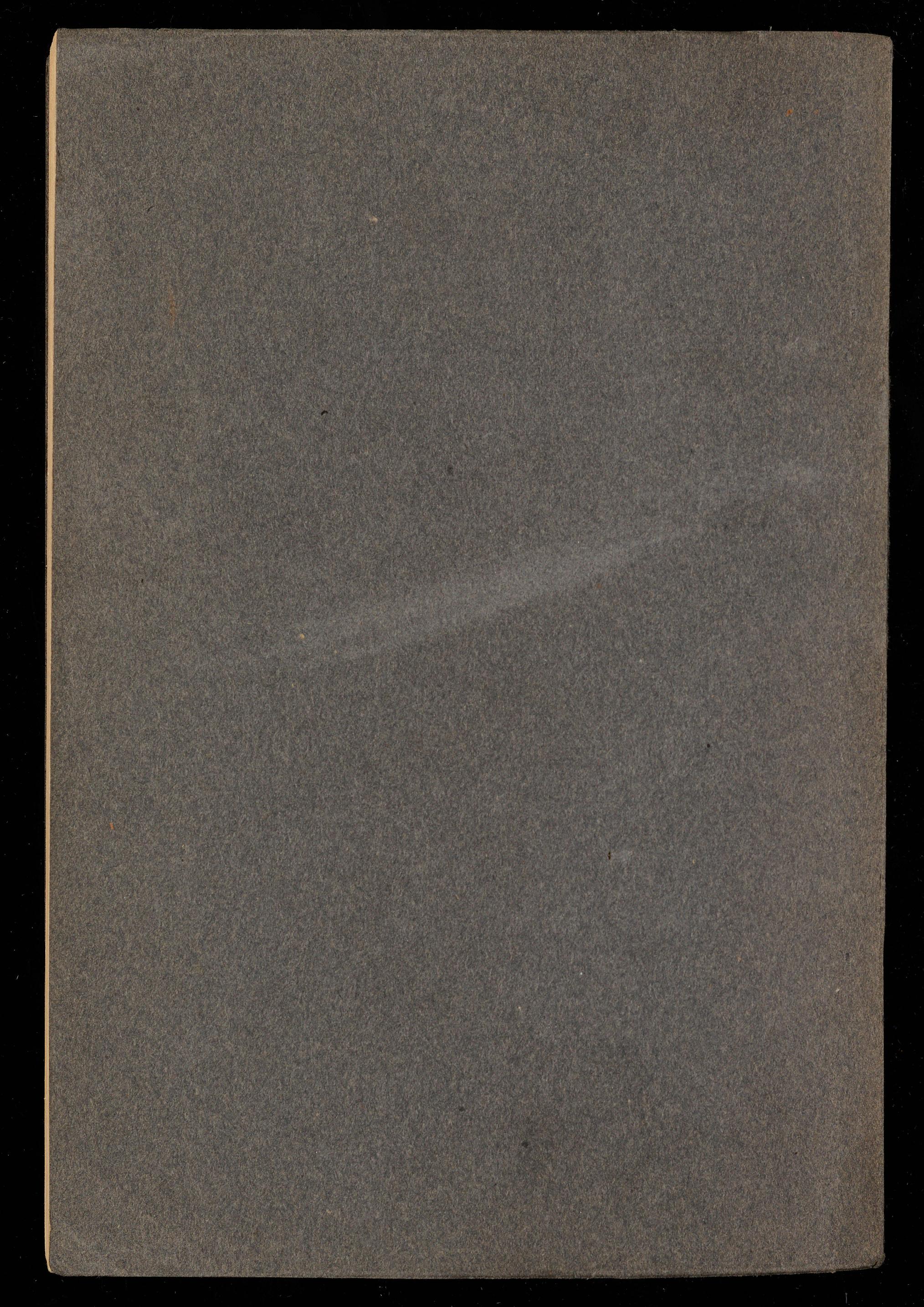

RichmondC liege ,Bulletfu
CATA::LOGUENUMBER

I

CATALOGUE OF RICHMON D COLLEGE
RICHMOND, VIRGINIA
SESSION 1909-1910 with .Anrtouncements for SESSION 1910-1911
RICHMOND, VIRGINIA : WHITTET &'..':SHEPPERSON, PRINTERS, 1910.

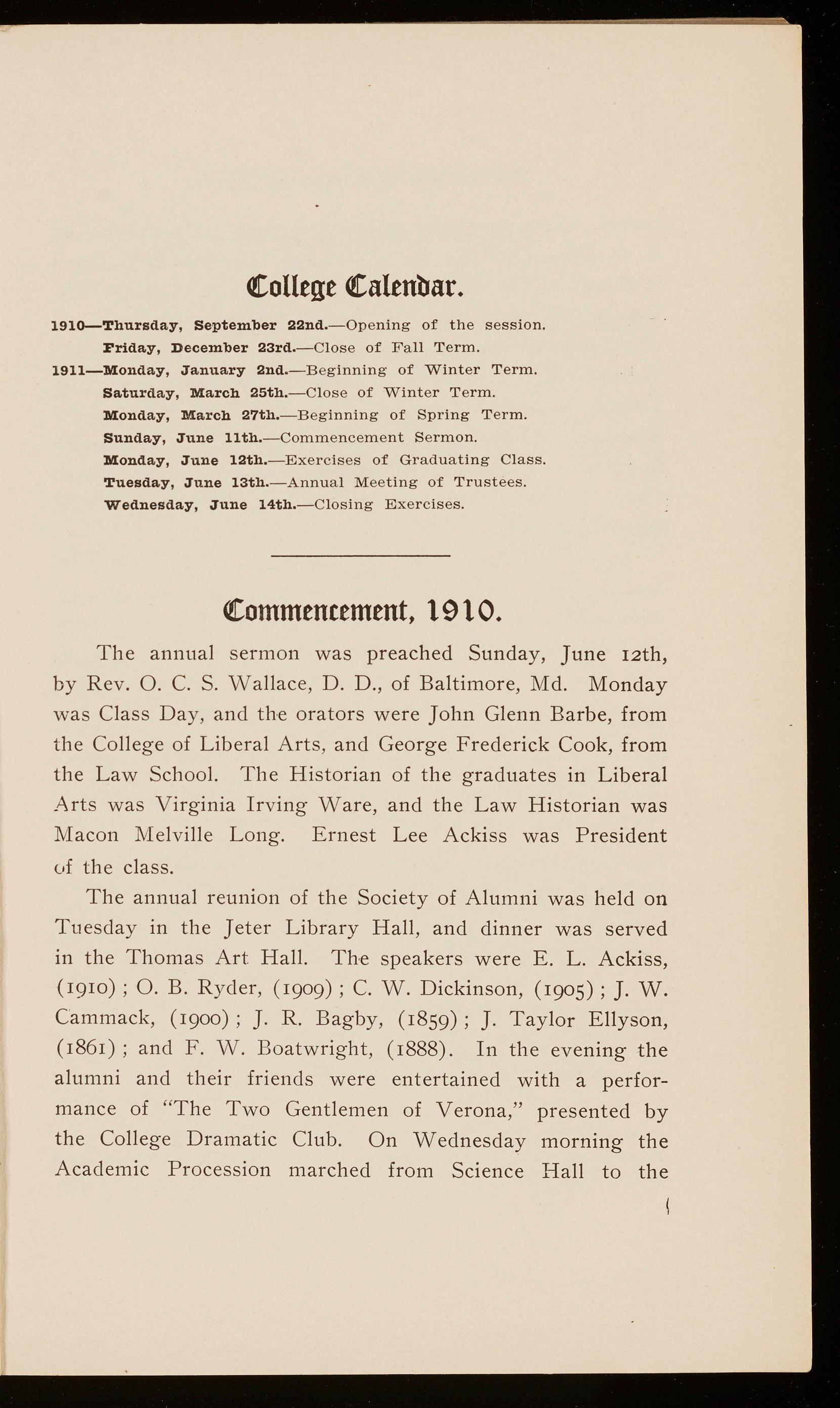
(:olltge(:alenbar.
1910-Thursday, Se ·ptember 22nd.-Op ening of the session. Friday, December 23rd.- C lo se of Fall Term.
1911-Monday, January 2nd.-B eginn in g of Winter Term. Saturday, March 25th.- C l ose of Winter Term.
Monday, March 27th. -Beginning of Spring Term.
Sunday, June llth.- Commencement Sermon.
Monday, June 12th.-Ex ercises of Graduating Class.
Tuesday, June 13th.-Annu a l Meeting of Trustees.
Wednesday, June 14th.- Closing Exercises.
<tCommencement,1910.
The annual sermon was preached Sunday, June 12th, by Rev. 0. C. S. Wallace, D. D., of Baltimore, Md. Monday was Class Day, and the orators were John Glenn Barbe, from t he College of Liberal Arts, and George Frederick Cook, from the Law School. The Historian of the graduates in Liberal Arts was Virginia Ir v ing Ware, and the Law Historian was Macon Melville Long. Ernest Lee Ackiss was President uf the class.
The annual reunion of the Society of Alumni was held on Tuesday in the Jeter Library Hall, and dinner was served in the Thomas Art Hall. The speakers were E. L. Ackiss, (1910); 0. B. Ryder, (1909); C. W. Dickinson, (1905); J. W. Cammack, (1900); J. R. Bagby, (1859); J. Taylor Ellyson, (1861); and F. W. Boatwright, (1888). In the evening the alumni and their friends were entertained with a performance of "T he Two Gentlemen of Verona," presented by the College Dramatic Club. On Wednesday morning the Academic Procession marched from Science Hall to the
4
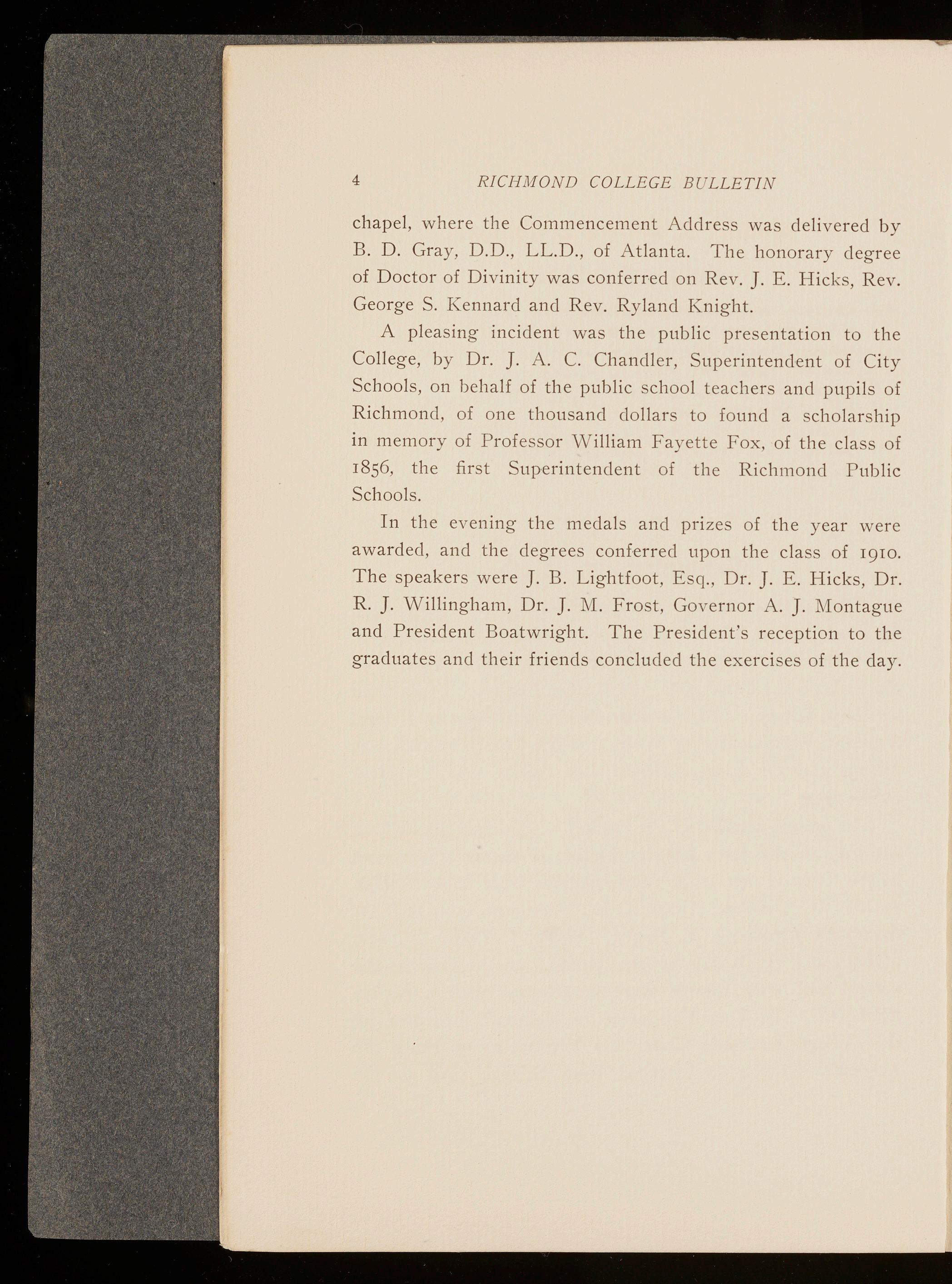
RICHMOND COLLEGE BULLETIN
chapel, where the Commencement Address was delivered by B. D. Gray, D.D., LLD., of Atlanta. The honorary degree of Doctor of Divinity was conferred on Rev. J. E. Hicks, Rev. George S. Kennard and Rev. Ryland Knight.
A pleasing incident was the public presentation to the College, by Dr. J. A. C. Chandler, Superintendent of City Schools, on behalf of the public school teachers and pupi ls of Richmond, of one thousand dollars to found a scholarship in memory of Professor vVilliam Fayette Fox, of the class of 1856, the first Superintendent of the Richmond Public Schools.
In the evening the medals and prizes of the year were awarded, and the degrees conferred upon the class of 1910. The speakers were J. B. Lightfoot, Esq., Dr. J. E. Hicks, Dr R. J. Willingham, Dr. J. M. Frost, Governor A. J. Montague and President Boatwright. The President's reception to the graduates and their friends concluded the exercises of the day.

C!Cbarter of .RicbmonbC!College.
ADOPTED DECEMBER, 1891.
I. Be it enacted by the General Assembly, That the act passed March 4, 1840, entitled "An Act to Incorporate the Trustees of Richmond College," b e, and the same is· hereby, so amended as to read as follows:
r. That there be and is hereby established at or near the city of Richmond a Seminary of learning for t'he instruction of you ,th in the various branches of Science and Literature, which shall be known by the name of Richmond College.
2. That Archibald Thomas, J. B. Jet er, Alexander Fleet, Barnet Grimsley, William Sands, Daniel Witt, Robert Ryland, James B. Taylor, Edwin Wortham, J o'hn ;\I. Murray, Samuel G. Mason, Thomas Hume, A. M. Poindexter, Thomas N. Welch, Addison Hall, L. W. Allen, W. A. Baynham, L. W. Seely, Basil i\1anly, Jr., A. G. Wortham, Albert Snead, J ames Thomas, Richard Reins, A. Judson Crane, Charles T. Wortham, C. F. Fisher, L. R. Spilman, Thomas J. Evans, Wellington Goddin, Thomas Wallace, J. B. Stovall, L. M. Coleman, R. H. Bagby, A. J. Coons , J. Lansing Burrows, Edward J. Willis, John A. Broadus, R oscoe B. Herth, and J. R. Chambliss be, and are hereby constituted Trustees of said College, who, and their s ucc esso rs, shall be a body corporate under the name and sty le of Richmond College, who s hall 'have perpetual succession and a common seal, may receive and hold property for the benefit of said College, and may sue and be sued, impl ead and be impleaded.
They shall hav e power to appoint and remove officers for their own body, and a Faculty of instruction for the College, and to regulate all foes and salaries. They sha ll also 'have power to make By-Laws and Regulations, not contrary to the law s of the land. Any seven Trustees shall form a quorum, and a le ss number may adjourn from time to time till a quorum be had.
3. The said Tru s tees , or any seven of them, are hereby authorized and empowered to confer Literary Degrees upon such persons as, in t'heir opinion, shall meri,t the same in as ample a manner as any other · college in this State, and under the corporate seal to grant testimonials thereof.
4. The said Trustees shall elect a Treasurer, who shall give bond , with approved securi<ty, payable to said College, conditioned faithfully to discharge t'he duties · of his office, and on failure so to do he
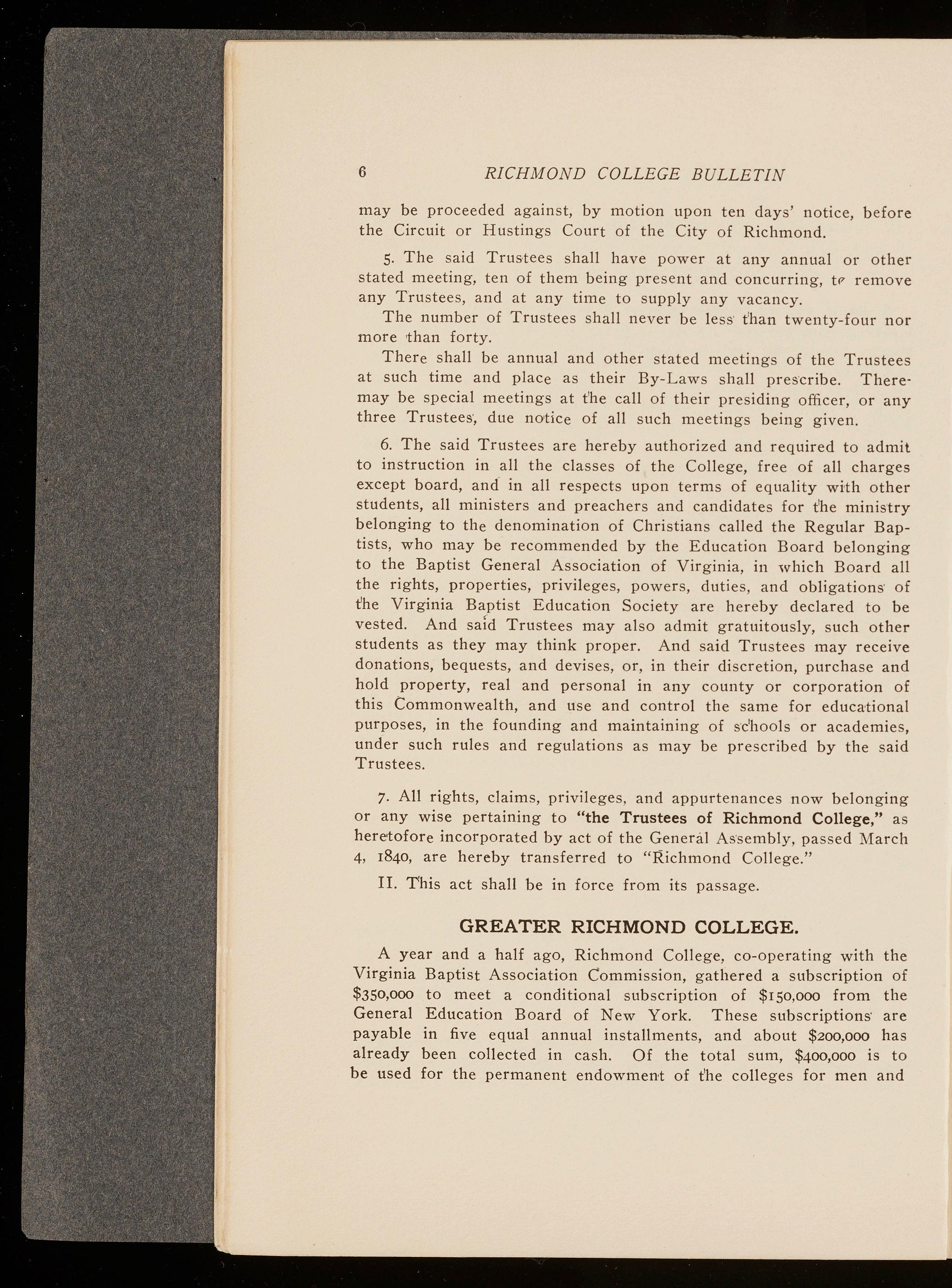
RICHMOND COLLEGE BULLETIN
may be proceeded against, by motion upon ten days' notice, before the Circuit or Hustings Court of the City of Richmond.
5. The said Trustees shall have power at any annual or other stated meeting, ten of them being present and concurring, t" remove any Trustees, and at any time to supply any vacancy.
The number of Trustees shall never be less · t'han twenty-four nor more •than forty.
There shall be annual and other stated meetings of the Trustees at such time and place as their By-Laws shall pres cribe. Theremay be special meetings at t'he call of their presiding officer, or any three Trustees , due notice of all such meetings being given.
6. The said Trustees are hereby authorized and required to admit to instruction in all the classes of the College, free of all charges except board, and in all respects upon terms of equality with other students, all ministers and preachers and candidates for t'he ministry belonging to the denomination of Christians called the Regular Baptists, who may be recommended by the Education Board belonging to the Baptist General Association of Virginia, in which Board all the rights, properties, privileges, powers, duties, and obligations · of t'he Virginia Baptist Education Society are hereby declared to be vested. And said Trustees may a l so admit gratuitously, such other students as they may think proper. And said Trustees may receive donations, bequests, and devises, or, in their discretion, purchase and hold property, real and personal in any county or corporation of this Commonwealth, and use and control the same for educational purposes, in the founding and maintaining of s"C'l10ols or academies, under such rules and regulations as may be prescribed by the said Trustees.
7. All rights, claims, privileges, and appurtenances now belonging or any wise pertaining to "the Trustees of Richmond College," as heretofore incorporated by act of the General As sembly, passed March 4, 1840, are hereby transferred to "Richmond College."
II. This act shall be in force from its passage.
GREATER RICHMOND COLLEGE.
A year and a half ago, Richmond College, co-operating with the Virginia Baptist Association Commission, gathered a subscription of $350,000 to meet a conditional subscript ion of $150,000 from the General Education Board of New York. These subscriptions· are payable in five equal annual installments, and about $200,000 has already been collected in cash. Of the total sum, $400,000 is to be used for the permanent endowment of t'he colleges for men and

RICHMOND COLLEGE BULLETIN
for women, and $100,000 is to be spent on buildings for the new Woman's College.
In planning for tne greater institution, it became advisable to seek larger grounds. A sj,te of 284 acres, in the western suburbs of Richmond, has been acquired, and i·t is proposed to expend there in buildings and improvements the sum of $600,000. The cost of new buildings and the 'habilitation of the new college for women will heavily tax the utmost resources of the Richmond College Trustees and there is both opportunity and need for large gifts. All buildings : for both men and women are needed. To some friends it may seem appropriate to erect a memorial library, to others a dormitory or a building for music or a laboratory would most appeal. Among t 'he professorships most needed are chairs of Educa •tion, Biology, Economics and Fine Arts. A building in which would center the religious, social and athletic activities of the men, and a similar building for women, are urgent needs. There is always need for s·cholarships which may be founded by the gift of $r,ooo. President Boatwright is always glad to correspond with friends about -the opportunities for investment in education and will furnish full information.
It s'hould never be forgotten that a growing institution is always in need of money for endowment, for buildings and equipment, and for student aid funds. These necessities of growth provide the opportunity for those unselfish friends of Christian education who can not make large donations during their lifetime. They cannot take their capital from their business without crippling their living. At the same time their hearts burn with large desires and they cherish the thoug'ht that as they come to the end of life •they will devote their substance entirely, or in part, to Christian education. There are many names which the friends of Richmond College always· utter with gratitude and affection-those who in dying remembered the College and gave of t'heir fortune for its upbuilding. Their names are forever identified wi•th the College, and will not be forgotten. Let not the trustees of God's gifts forget to handle them carefully for the good of humanity and for the glory of God.
FORM OF BEQUEST
"I give and devise to Richmond College, located at Richmond, Va., the following real estate-to-wit ('here describe the said real estate as to kind, quantity, and situation).
"I also give and bequeath to the said College the sum of dollars (:,,-----), and the following bonds (or stocks)-to-wit (here describe the bonds or stocks), all of which are to be used for the following purposes-to-wit ('here describe the purpose for which it shall re applied)."
LIEUTENANT-GOVERNOR J. TAYLOR ELLYSON, President.
A. W. PATTERSON, ESQ., Vice-President.
CHARLES H. RYLAND, D.D.,
:Recording Secretary, Financial Secretary and Treasurer.
Major A. B.. Courtney, ... Richmond
w. E. Hatcher, LL. D., Fork Union
C. :e:. Byland, D. D., . . ... Richmond
:e:. Wythe Davis, M. D., .. Richmond
I. B, Lake , D. D. , ........ Upperville
Geo. B. Steel, D. D. S., Richmond
Judge w. B. Barksdale, Houston
T, s. Dunaway, D. D., Freder'ksb'g
Mr, C. V. Meredith, .. Richmond
Prof. George Swann, ...... Danville
Mr. Conway B. Sands, ... Richmond
John B,, Bagby, D. D., Balls v ill e
John M. Pilcher, D. D., . . Ri chmond
Mr. J. J. Montague, .. Richmond
Mr, T. C. Williams, Jr., Richmond
Mr. T. :e:. Ellett, .. Richmond
Mr. John T. Griffin, Portsmouth
Mr. J. T. Ellyson, Richmond
Geo. w. Beale, D. D., H eathsv ill e
B,, :e:.Pitt, LL. D. , . ...... Richmond
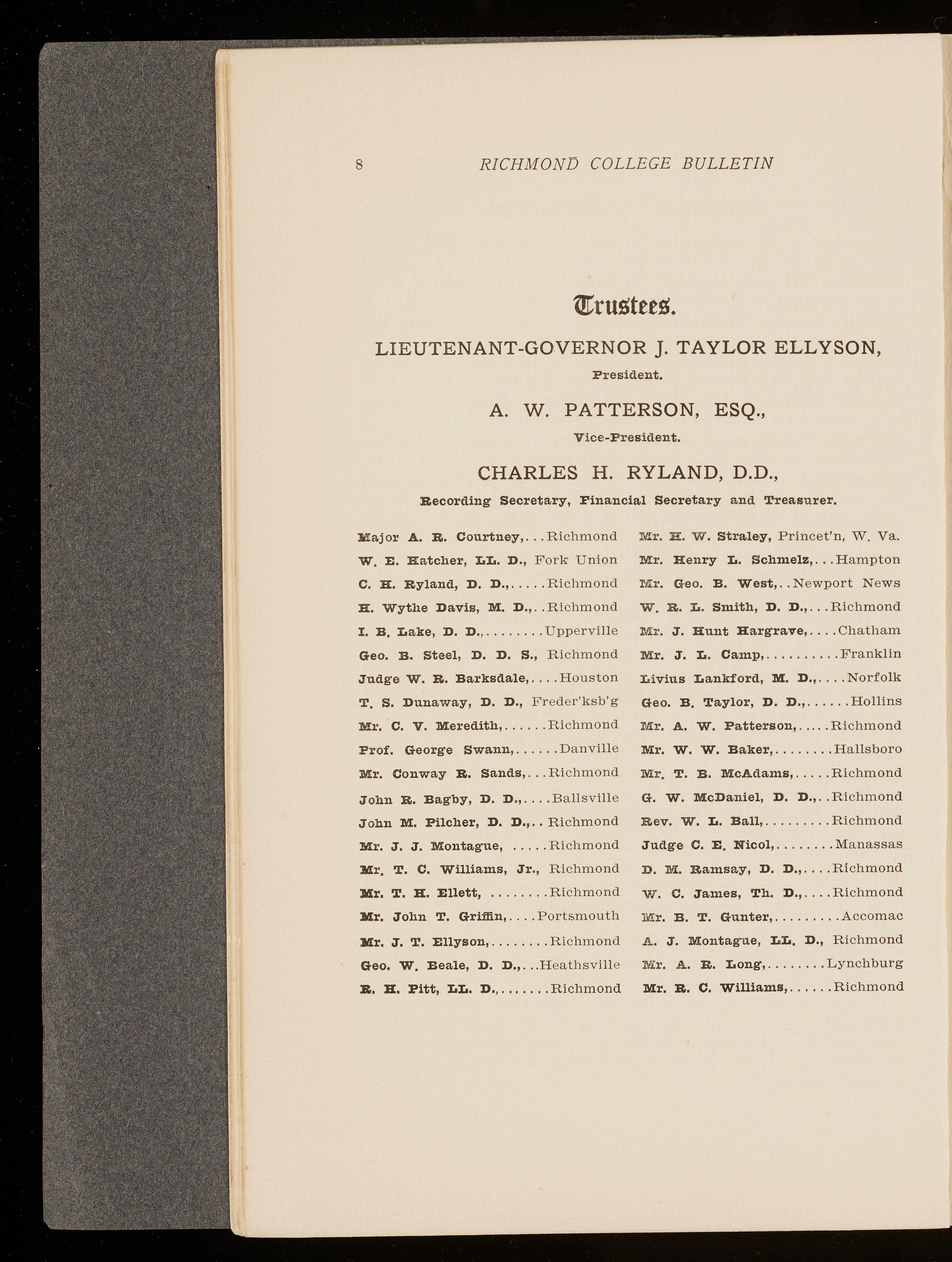
Mr. H. W . Straley, Princet'n, W. Va.
Mr. :S:enry L. Schmelz, .. . Hampton
Mr Geo. B. West, Newport N e ws
W. B. L. Smith , D. D., ... Richmond
Mr. J. Hunt Hargrave, . .. Chatham
Mr. J. L. Camp, .......... Franklin
Livius Lankford, M. D., Norfolk
Geo. B. Taylor, D. D. , Hollins
Mr . A. w. Patterson, ... Richmond
Mr. w. w. Baker, Hallsboro
Mr, T. B. McAdams, Ri c hmond
G. W. McDaniel , D. D., .. Richmond
Rev. w. L. Ball, Richmond
Judge C. E. Nicol, M a nassas
D. M. Ramsay, D D., .... Richmond
VI. C. James, Th. D., .... Richmond
IY! r . B. T. Gunter, Accomac
A . J. Montague, LL. D., Richmo nd
~Ir. A. :&. Long, .. ..... . Lynchburg
Mr. B, C. Williams, Richmond
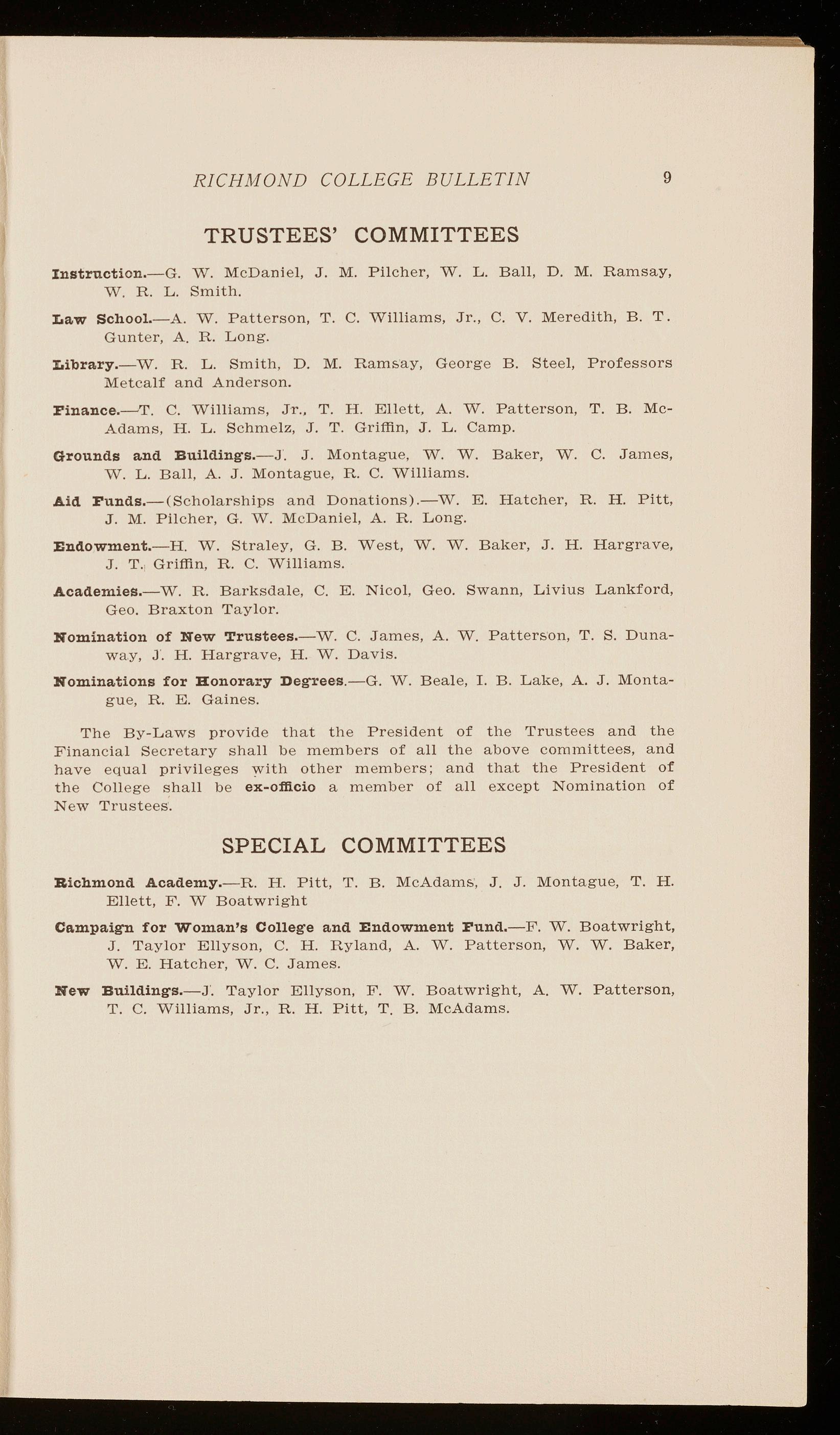
TRUSTEES' COMMITTEES
Instructi on. -G. W. M cDan i e l , J . M. Pil cher, W . L . Ba ll , D M . Ramsay, W. R. L. Smith.
Law School. -A. W Patterso n , T. C. W ill iams, Jr., C. V Meredith, B. T. Gunter, A. R. Long.
Library. -W R. L. Sm i th, D. M Ramsay, George B. Stee l , Pro f esso r s Metca l f and Anderso n
Finance. - T . C. W illi ams, J r. , T. H E ll et t , A W Pa tt erson, T. B McAdams, H. L Schme l z, J. T. Gri ffin , J . L Ca mp
Grounds a.nd Buildings. - J . J Montag u e, W. W. Bake r , W. C. J ames, W. L . Ball, A J. Montague, R. C. Wi lli ams.
A i d Funds.- (Scholarsh i ps and Donat io n s).-W. E. Ha t c h er, R. H . P itt , J. M. Pilc h er, G. W. McDa ni e l , A. R. Long. Endowment. -H. W. St r a l ey, G. B. West, W. W. Ba l<er , J. H. Hargrave, J. T. Griffin, R. C. W ill iams Academies. -W. R. Barksda l e, C. E . N i col, Geo. Swa nn , L ivius Lankfo rd , Geo. Braxton T aylor.
Nomination of New Trustees. -W. C. J ames, A. W. Pa tt erson, T. S. Du n away , J ' H. Harg r ave, H. W. Dav is Nominations for Honorary Degrees .-G . Vl. Bea l e, I. B. L ake, A. J Mo nt ague, R. E . Ga i nes
The By -L aws provide that the Pres i dent of the Trustees and t h e Financial Secretary s h a ll be members of a ll the above committees, a n d have equa l priv il eges w i t h other m em bers; a n d tha. t the Preside nt o f the Co ll ege s h a ll be ex-officio a me m ber of a ll exce pt No m ina ti o n o f New T rustees.
SPECIAL COMMITTEES
Bichmond Academy. -R. H P i tt, T. B. McAdams, J J . Montague, T H E ll et t , F. W Boa tw rig ht Campaign for Woman's College and Endowment Fund . - F . W. Boa t w ri g ht , J. T ay l or E ll yson, C. H. Ry l a n d, A. W. Patte r son, W. W. B ak e r , W. E. Ha t cher, W. C. James.
New Buildings. -J . T ay l or E ll yso n , F. W. Boatw ri ght, A W. Patte r so n , T C. W illi a m s, Jr ., R. H. P itt , T . B. McAda m s.

RICHMOND COLLEGE BULLETIN
jfacultp .
FREDERICK WILLIAM BOATWRIGHT , P residen t .
CH ARL E S HENRY WINSTON , M.A ., LL .D ., E meritus Profes s or o f Phy si c s and P rof essor of As t ronomy .
A. B. Hampden-Sidney, 1854; M. A. University of Virginia, 1857; LL. D. Hampden-Sidney, 1883; Assistant Professor, Hampden-Sidney, 1854-'55; Professor Transylvania University, 1857-'58; President Richmond Female Institute, 1859-'73; Professor of Physics, 1873-1908; Professor of Astronomy since 1873.
FREDERICK
WILLIAM BOATWRIGHT , M.A. , LL.D .,
P ro f e s sor of M od e rn Languages .
M. A. Richmond College, 1888; LL . D. Mercer University, 1895; Assistant in Greek, Richmond College , 1887-'89; Student University of Halle and the Sorbonne, 1889-'90; Professor of French and German since 1890; Student University of Leipsic, 1892; President since 1894.
ROBERT EDWIN GAINES , M.A., Litt.D. , Professor of Mathemat i cs.
M.A. Furman University, 1886; Litt . D. Furman University, 1908; Instructor in Furman University, 1882-'87; Student Johns Hopkins University, 1887-'88; Instructor in Wright's University Schoo l , Baltimore, 1888-'9; Harvard University, 1899-1900; Professor of Mathematics s ince 1890.
WILLIAM ASBURY
HARRIS, M.A. , Ph.D. , Professor of Greek Language and L i terature.
M. A. Richmond College, 1886; Ph. D Johns Hopkins University, 1892 ; Professor of Greek, Baylor University, 1893-1901; Professor of Greek since 1901.
WILLIAM
HETH WHITSITT , M.A. , D .D ., LL.D .,
Pr of ess o r of J ames Thomas , Jr., School of Philosophy.
M . A. Union University, 1861 ; Professor Southern Baptist Theological Seminary, 1872-'95; President of same, 1895-'99; Professor of Philosophy on the J 'ames Thomas, Jr., Foundation 1901-1910; Resigned June, 1910.
JOHN CALVIN METCALF , M.A ., Professor of English Language and Literature.
M. A. Georgetown Co ll ege, 1888; M. A. Harvard University, 1905; Profossor of Latin and Eng li sh, Soule Co ll ege, 1889-'94; Professor of Modern Languages , Mercer University, 1 894-'95; Profe&sor of L a ti n, George t own Co ll ege, 1895-'98, and of Eng li sh In same 1898-1904; Instructor i n University of C h icago, 1897; Professor of English Language a n d Literature s in ce 1904.
RICHMOND COLL?.GE BULLETIN
ERNEST MAYO LONG, LL.B., Associate ProfeBsor of Law.
Richmond College, 1894; LL. B. Yale University, 1896 ; Associate Professor of Law sinc,i 1898.
WALTER SCOTT McNEILL, B.A. , Ph.D. , LL.B. , Professor of Law.
B. A. Richmond College, 1899; Ph. D. University of Berlin, 1902; LL. B Harvard University, 1905; Associate Professor of Law, 1905-1909. Professor of Law since 1909.
ROBERT A. STEW ART, M.A., Ph.D., Associate Professor of Modern Languages.
M. A. University of Virginia, 1899; Ph. D. University of Virginia, 1901; Professor of Mod,irn Languages, Wofford College , 189 9-1900 ; In~tructor Teutonic Languages , Univers it y of Virginia , 1900-'0l Assistant Prof e ssor of Modern Languages, Tulane University, 1901-'02; Associate Professor since 1903.
CHRISTOPHER B. GARNETT, M.A., B.L. , Associate Professor of Law.
B. A. and M. A. Un i versity of Virginia, 1898; Teacher Bell,ivue High School, 1898-1900; Dean of Woman's College of Richmond and Professor of History, 1902- ' 06; Associate Editor Virginia Law Register and Joint-Editor of Waddey's Guide to Magistrates; Associate Professor of Law since 1906.
EUGENE COOK BINGHAM,
Ph. D., Professor of Chemistry and Geology.
A. B. Middlebury College, 1900; Ph. D. J ohns Hopkins University, 1906; Student of Universities of Leip,;,ic and Ber lin , 1906; Professor of Chemistry and Geo logy since 1906.
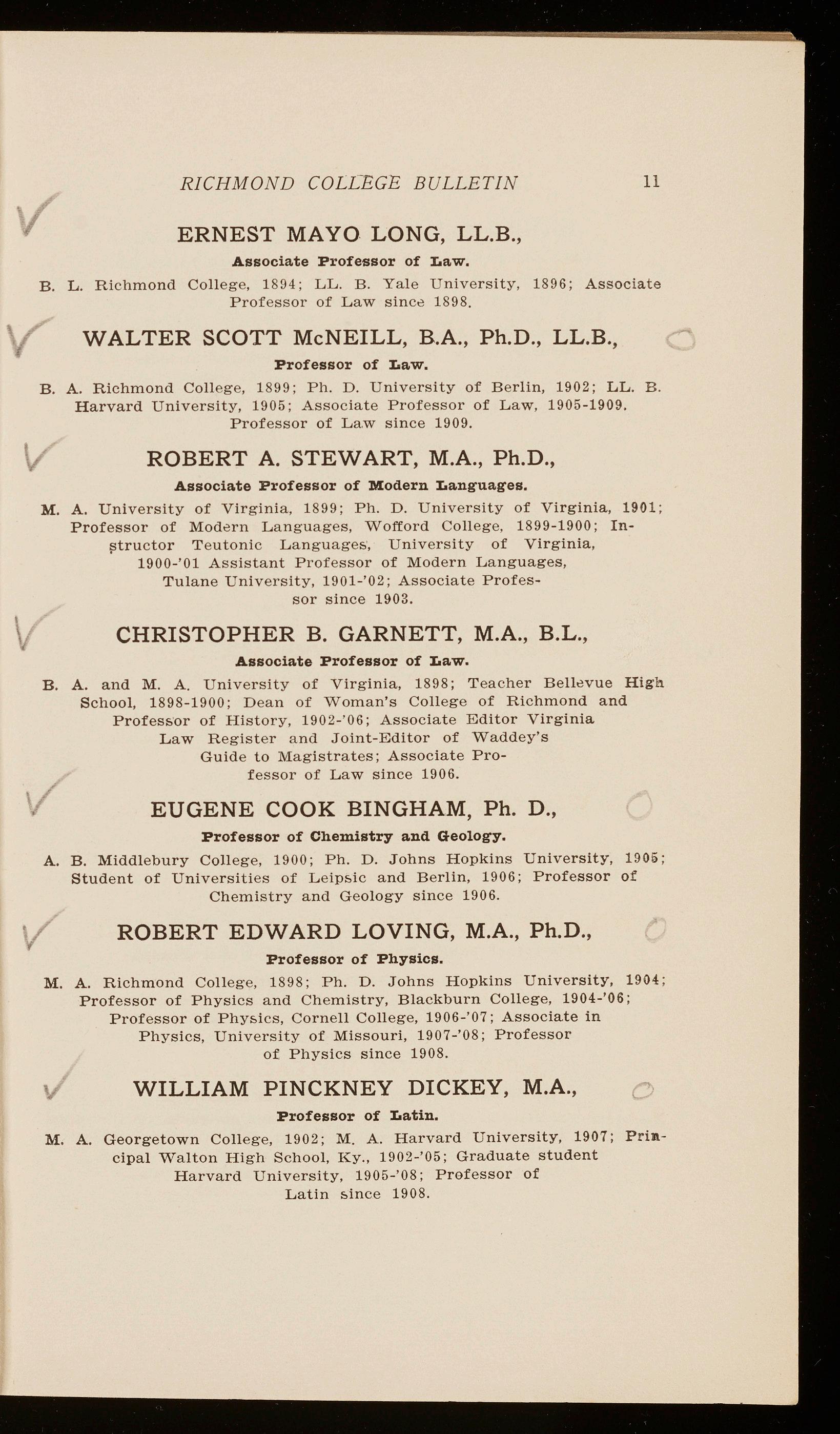
VROBERT EDWARD LOVING, M.A., Ph.D., Professor of Physics.
M. A. Richmond College, 1898; Ph. D. Johns Hopkins University, 1904 ; Professor of Physics and Chemistry, Blackburn College, 1904-'06 ; Professor of Phy,;,ics, Cornell College, 1906-'07; Associate in Physics, University of Missouri, 1907-'08; Professor of Physics since 1908.
WILLIAM PINCKNEY
DICKEY, M.A., r Professor of Latin.
M. A. Georgetown Co ll ege, 1902; M. A. Harvard Unive rsity , 1907; Principal Walton High School, Ky., 1902-'05; Graduate student Harvard University, 1905-'08; Professor of Latin ,;,ince 1908
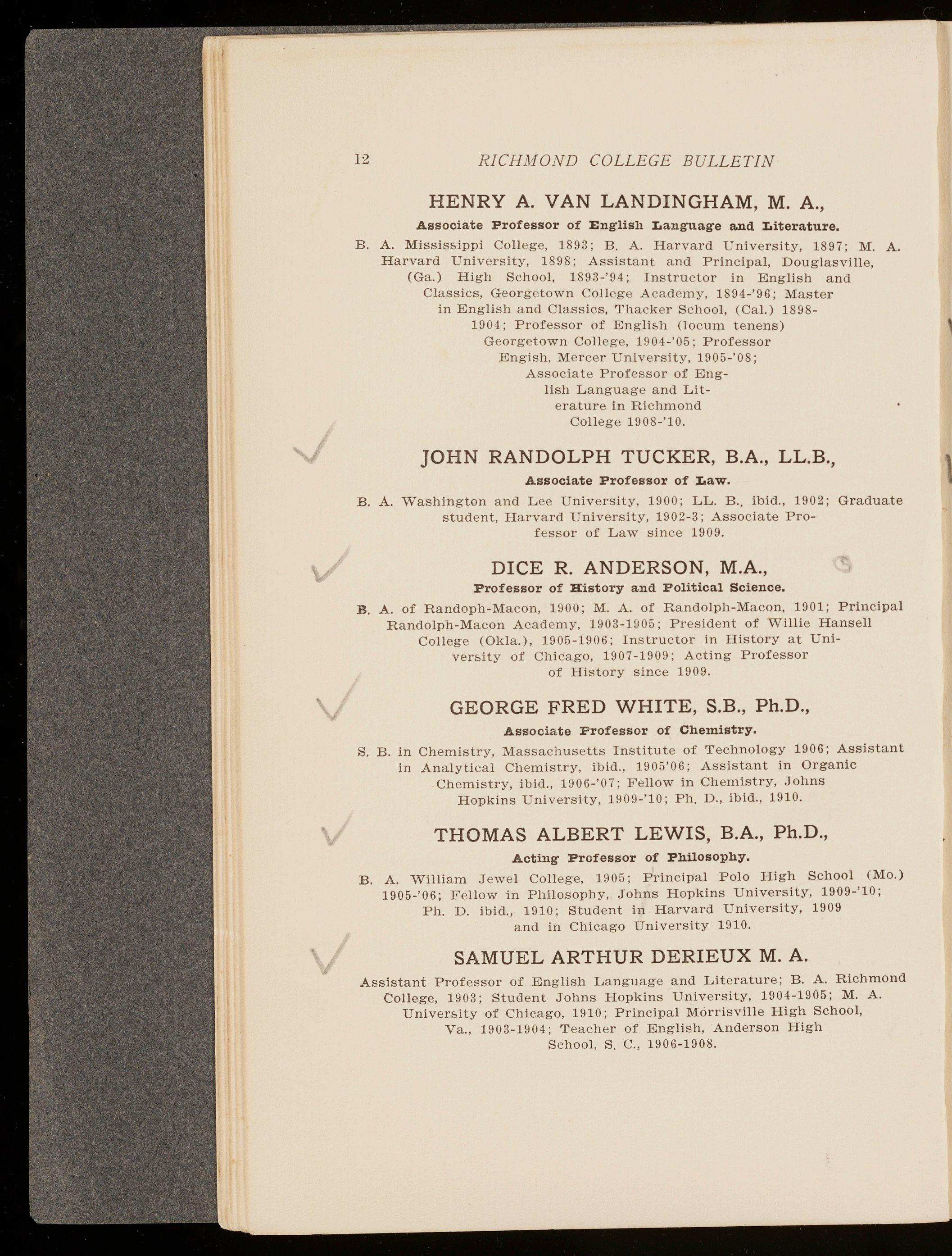
RICHMOND COLLEGE BULLETIN
HENRY A. VAN LANDINGHAM, M. A.,
Associate Professor of English Language and Literature.
B. A. Mi ssis:sippi Co ll ege, 1 893; B. A Harvard University, 1 897; M. A. Har vard University, 1898; Assistant and Principal, Douglasville, (Ga.) High School, 1893 -'94; Instructor in English and Class ics, Georgetow n Co ll ege Academy, 1894-'96; M as t e r in English and C la ssics, Thacker School, (Cal.) 18981904; Professor of Engli:sh (locum tenens) Georgetow n College, 1904-'05; Professor E n gish, Mercer Un iv ersi t y, 1905-'08; Associate Professor of English Language a nd Litera tur e in Richmond College 1908-'10.
JOHN RANDOLPH TUCKER, B.A., LL.B.,
Associate Professor of Law.
B A. Washington an d Lee University, 1900; LL. B ibid., 1902; Graduate student, Harvard University, 1902-3; Associate Professor of Law since 1909.
DICE R. ANDERSON, M.A., Professor of History and Political Science.
B A. of Randoph-Macon, 1900; M. A. of Randolph-Macon, 1901; Principal Randolph-Macon Academy, 1903-1905; President of Willie Hansell Co ll ege (Ok la.) , 1905-1906 ; Instructor in History at Univer:sity of Ch i cago, 1907-1909; Acting Pr ofesso r of Hi s t ory since 1909.
GEORGE
FRED WHITE, S.B. , Ph.D.,
Associ ate Professor of Chemistry.
S. B. in Chemistry, M assachuse tt s Institute of T ec hnology 1906; Assistant in Analytical Chemistry, ibid , 1905'06; Assistant in Organic Chemistry, ibid., 1906-'07; Fellow in Chemistry, Johns Hopkins University, 190 9- '10; Ph.D., ib id. , 1910.
THOMAS ALBERT LEWIS,
B.A., Ph.D.,
Acting Professor of Philosophy.
B. A. William Jewel Co ll ege, 1905; Principal Polo High S c hool (Mo.) 1905- '06 ; Fellow in Ph il oso ph y, Johns Hopkins University, 1909-'10; Ph. D. ibid., 1910; Stud en t in Harvard University, 1909 and in Ch i cago U niv e rsit y 1910.
SAMUEL ARTHUR DERIEUX M. A.
Assistant Professor of English L a ngu age and Lit e ratur e; B. A. Richmond College, 1903; Student Johns Hopkins U niv ersi ty, 1904-1905 ; M. A. University of Chicago, 1910 ; Principal Mor r isvill e High School, Va., 1903 -1 904; Tea cher of Eng li sh, Anderson High School, S C , 1906-1908.

3Jnstructors.
CARROLL M. BAGGARLY, B.A., M.D.,
Instruct o r in Biology.
B. A Randolph-M acon College; M. D. University Colleg e of Medicine; Professor of Natural Sciences vVoman's College of Richmo nd; , Adjunct Prof e&sor Practice of Medicine, University Co llege of Medicin e; Instructor in Biology - since 1904.
FRANK Z. BROWN, S.B.E.E.,
Instructor in Drawing.
B. S. Virginia Militar y Institut e, 1900; S. B. E. E. Massachus etts Institute of Technology , 1903; Instructor in Physics and Electricity V irg ini a Mechanics Institute since 1903; Instructor in Drawing s in ce 1904.
ALLIE D. MORGAN, B.S., Laboratory Assistant in Biology.
ROBERT C. ANCARROW, B.A., Laboratory Assistant in Chemistry.
J.B. DUVAL, Instructor in Mathematics.
S. J. ROWLAND, Instructor in Latin.
ADRIAN THOMAS, Laboratory Assistant iri Chemistry.
W. H. DAVIS, Laboratory Assistant in Physics.
CHARLES HILL RYLAND, D.D., Librarian and Curator.
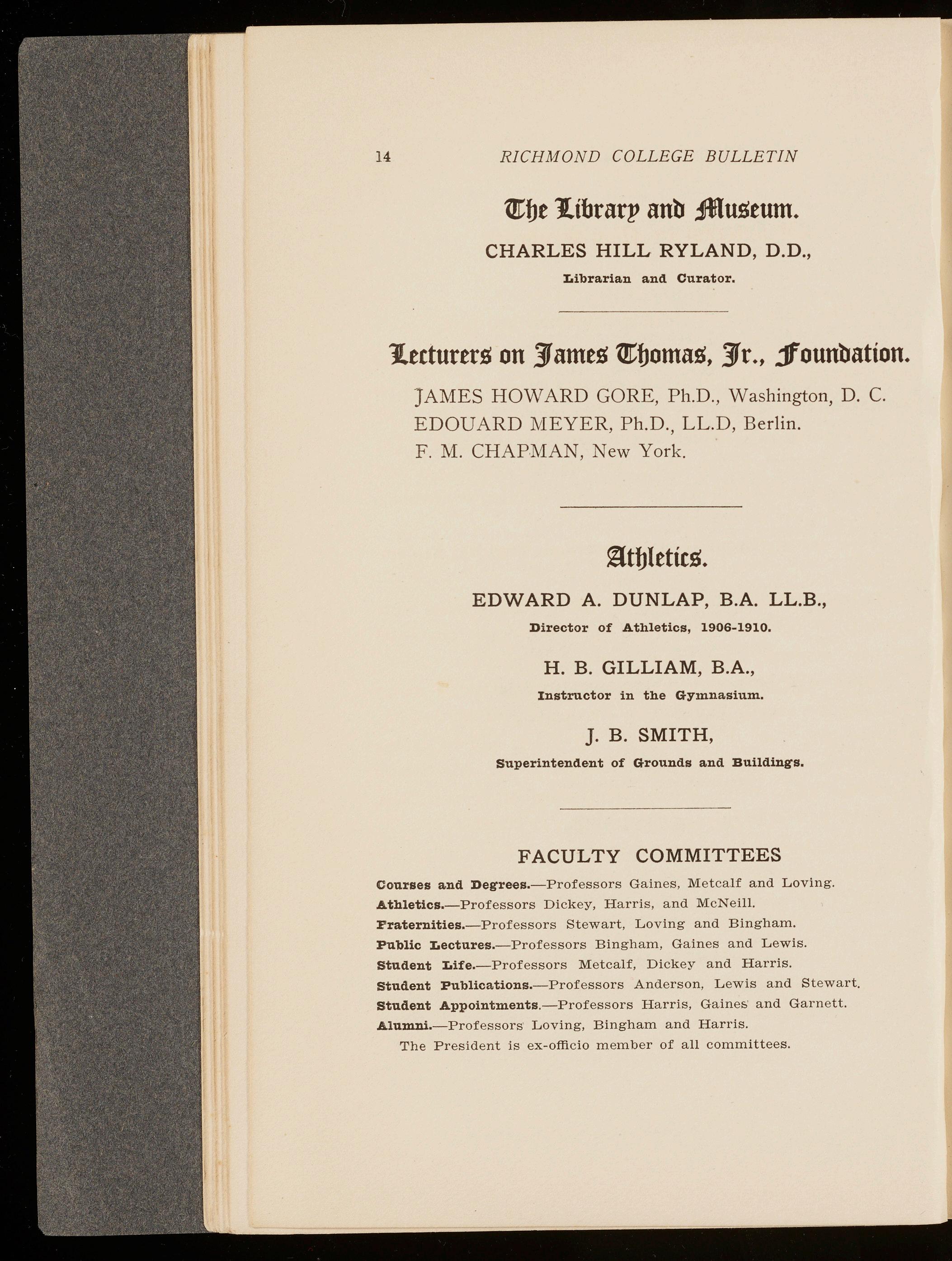
JAMES HOWA RD GO R E, P h .D ., W ashington, D C.
EDOUARD MEYE R , P h .D., LLD, Ber lin
F. M. CHAPMAN, New Yo r k.
EDWARD A . DUNLAP , B.A. LL .B., Director of Athletics, 1906-1910.
H. B. GILLIAM , B.A. , Instructor in the Gymnasium.
J.B. SMITH , Superintendent of Grounds and Buildings.
FACULTY COMMITTEES
Courses and Degrees. -Professors Gaines, Metcalf and Loving. Athletics - Professors Dic lrny, Harris, and McNeil !. P raternities. -Professors Stewart, Loving and Bingham.
Public Lectures. -P r ofessors Bingham, Gaines and Lewis.
Student Life. -Professors Metcalf, Dickey and Harris.
Student Public a tions. -Professors Anderson, Lewis and Stewar t .
Student Appointments .-Professors Harris, Ga inee.· and Garnett.
A l umni. -Professors · Loving, B in g h am and Harris. The President is ex-officio member of a ll comm i ttees

®f 1fnterestto ~ew ~tubent.s.
The Ne x t Session Begins September 2 2 , 1910
New students who inform the President of the hour of t heir expected arrival in R ichmond will be met at tra in on September 21st or 22nd by a member of the College Y M. C. A. wea r ing t h e Co ll ege colors , c r imson a n d blue. The Y M. C. A. offers t h is cou r tesy only on the days mentioned.
The Co ll ege dormitories open for the reception of students, M o nda y, September 20th
The Refectory opens for tab le boarders Tuesday, September 21st.
Students furnish their own rooms . The articles conveniently broug h t from home are one pillow case, one qui lt, one pair blankets , sheets, towe ls and toi let articles.
Rooms will be assigned whenever app lication is made. The best are us u ally engaged before opening of the session. A committee from the College Y . M . C . A. w ill be in the President's office to assist new students in t h e se lection of r ooms and room-mates , and to show them other courtesies.
Matriculation begins on Wednesday, September 21st. College classes are organized on Friday For College entrance requirements, see page 86 of this catalog u e.
Interesting re u nion exe r cises are h eld by t h e L iterary Societies on Friday and Saturday evenings. T h e first pub lic meeting of the sessio n will be held Tuesday evening, September 27th , at which time an address will be delivered by Professor J. C. Metcalf .
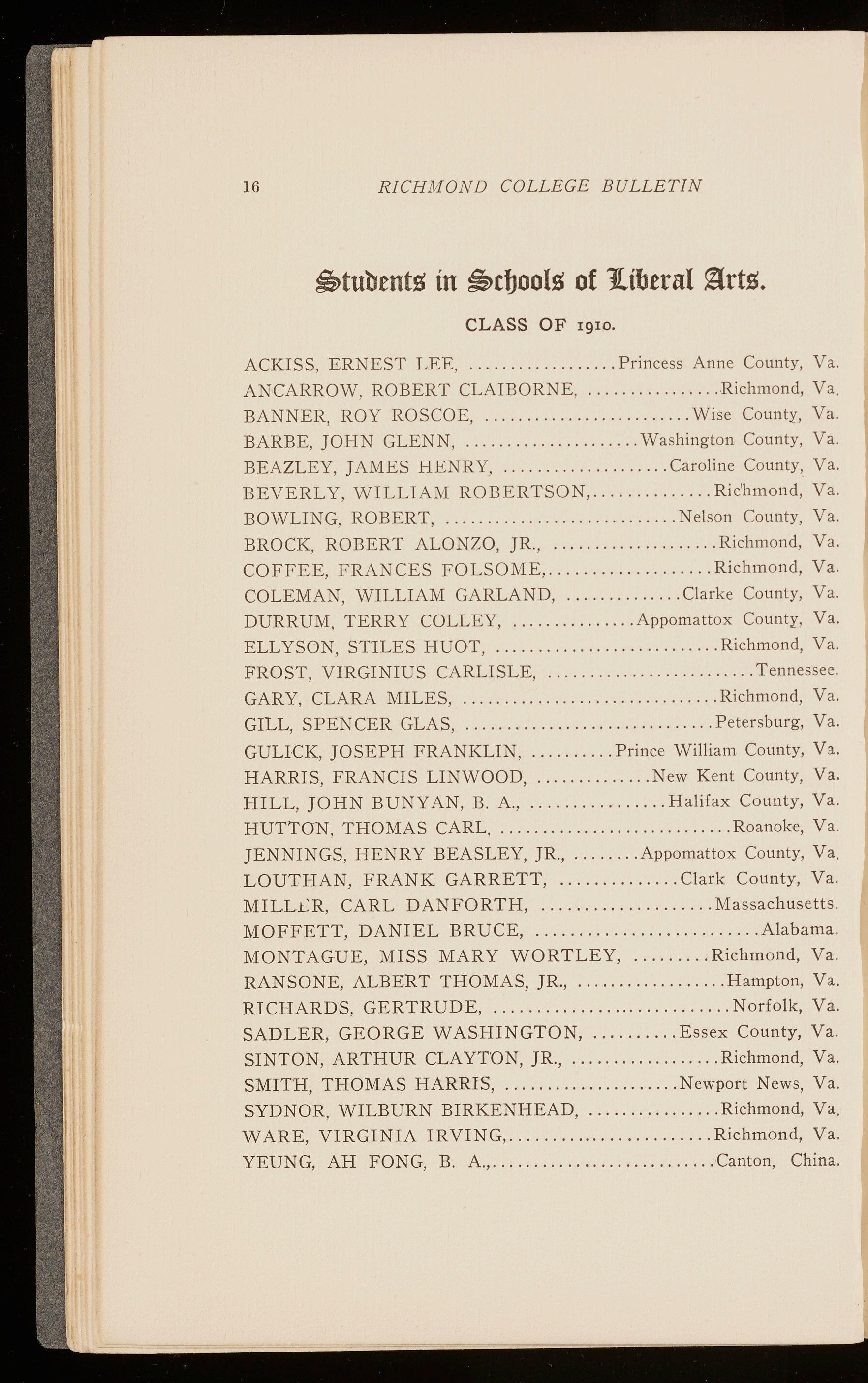
CLASS OF 1910.
ACKISS, ERNEST LEE, .................. Princess Anne County, Va. ANCARROW, ROBERT CLAIBORNE , ................ Richmond, Va. BANNER, ROY ROSCOE, ... ........ Wise County, Va. BARBE, JOHN GLENN, ..................... Washington County, Va.
BEAZLEY , JAMES HENRY, .................... Caroline County, Va.
BEVERLY, WILLIAM ROBERTSON, . Ric 'hmond, Va
BOWLING, ROBERT, ............................ Nelson County, Va. BROCK, ROBERT ALONZO, JR., .................... Richmond, Va.
COFFEE, FRANCES FOLSOME, ........ .. .... Richmond, Va.
COLEMAN, WILLIAM GARLAND, .............. Clarke County, Va. DURRUM, TERRY COLLEY, ............... Appomattox County. Va. ELLYSON, STILES HUOT, ........................... Richmond, Va.
FROST , VIRGINIUS CARLISLE, ......................... Tennessee. GARY, CLARA MILES, .... ........... Richmond, Va.
GILL , SPE NCE R GLAS, .............................. Petersburg, Va. GULICK, JOSEPH FRANKLIN, .. Prince William County, V1. HARRIS , FRANCIS LINWOOD, .............. New Kent County, Va. HILL, JOHN BUNYAN, B. A., ................ Halifax County, Va. HUTTON , THOMAS CARL ... ..... ................ .... Roanoke, Va. JENNINGS, HENRY BEASLEY , JR., .. .. Appomattox County, Va. LOUTHAN, FRANK GARRETT, .............. Clark County, Va. MILLLR, CARL DANFORTH, .................... Massachusetts. MOFFETT, DANIEL BRUCE, .......................... Alabama MONTAGUE, MISS MARY WORTLEY, ......... Richmond, Va. RANSONE, ALBERT THOMAS, JR., .................. Hampton, Va. RICHARDS, GERTRUDE, ............................ Norfolk, Va. SADLER, GEORGE WASHINGTON, Essex County, Va. SINTON, ARTHUR CLAYTON, JR., .................. Richmond, Va. SMITH, THOMAS HARRIS, ..................... Newport News, Va. SYDNOR, WILBURN BIRKENHEAD, ................ Richmond, Va. WARE, VIRGINIA IRVING, ........................ Richmond, Va
YEUNG, AH FONG , B. A., ........................... Canton, China.
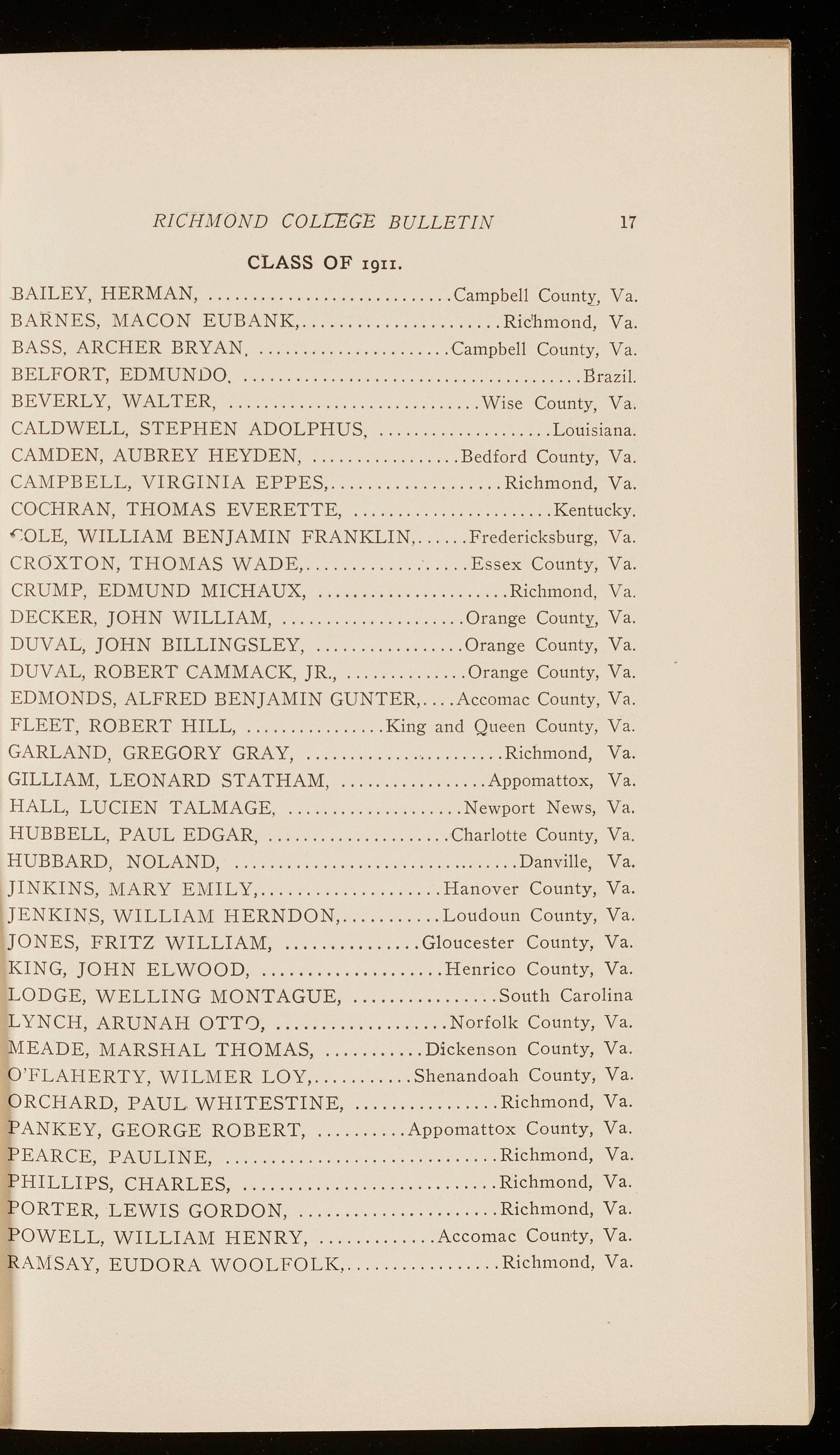
RICHMOND COLITGE BULLETIN 17 CLASS OF rgn.
BAILEY, HERMAN, Campbell Countr, Va. BARNES, MACON EUBANK, .. ... .. . ............. . Ric 'hmond, Va. BASS, ARCHER BRYAN, Campbell County, Va. BELFORT, EDMUNDO, ....................................... Brazil. BEVERLY, WALTER, ............................. Wise County, Va.
CALDWELL, STEPHEN ADOLPHUS, .... . ............... Louisiana. CAMDEN, AUBREY HEYDEN, ................. Bedford County, Va. CAMPBELL, VIRGINIA EPPES, ................... Richmond, Va. COCHRAN, THOMAS EVERETTE, Kentucky. C:OLE, WILLIAM BENJAMIN FRANKLIN, ...... Fredericksburg, Va. CROXTON, THOMAS WADE, .................. Essex County, Va. CRUMP, EDMUND MICHAUX, ...................... Richmond, Va. DECKER, JOHN WILLIAM, Orange Countx, Va. DUVAL, JOHN BILLINGSLEY, ................. Orange County, Va. DUVAL, ROBERT CAMMACK, JR., .............. Orange County, Va. EDMONDS, ALFRED BENJAMIN GUNTER, .... Accomac County, Va. FLEET, ROBERT HILL, .... .. .......... King and Queen County, Va. GARLAND, GREGORY GRAY, ....................... Richmond, Va. GILLIAM, LEONARD STATHAM, Appomattox, Va. HALL, LUCIEN TALMAGE, ................... . Newport News, Va. HUBBELL, PAUL EDGAR, Charlotte County, Va. HUBBARD, NOLAND, ................................. Danville, Va. JINKINS, MARY EMILY, Hanover County, Va. JENKIN .S, WILLIAM HERNDON, ........... Loudoun County, Va. JONES, FRITZ WILLIAM, ............... Gloucester County, Va. KING, JOHN ELWOOD, .................... Henrico County, Va. LODGE, WELLING MONTAGUE, ................ South Carolina LYNCH, ARUNAH OTT0, ................... Norfolk County, Va. MEADE, MARSHAL THOMAS, Dickenson County, Va. O'FLAHERTY, WILMER LOY, Shenandoah County, Va. ORCHARD, PAUL WHITESTINE, ....... ......... Richmond, Va . PANKEY, GEORGE ROBERT, .......... Appomattox County, Va. PE ARCE, PAULINE, .............................. Richmond, Va. PHILLIPS, CHARLES, ....... ... .................. Richmond, Va . PORTER, LEWIS GORDON, Richmond, Va. POWELL, WILLIAM HENRY, . ............ Accomac County, Va . RAMSAY, EUDORA WOOLFOLK, ................. Richmond, Va
18
RICHMOND COLLEGE BULLETIN
ROBERTSON, VIRGINIA ROSE, .............. . .. . Richmond, Va ROGERS, WILLIAM HOWARD, .. ....... P itt sy lvania County, Va. ROWLAND, SAJ\IUEL JEFFERSON, ......... Richmond, Va. SCALES, NELLIE NOEL, .......... ... .. . ........ . Richmond, Va. SHUMATE, ANDREW LINTS FIELD, .............. Giles County, Va. SMITH, RUSSELL GORDON, ....... . ........ ....... Richmond, Va. STROTHER. JAMES FRENCH, .. ............... Richmond, Va. SYDNOR, ELMER WILLIAMS, ... . .... .. .. Prince George County, Va. THO.:-IASSON, RUTH l\IcGRUDER, ... . . .. . ... . .... Richmond, Va. WHITE, BENJA1IIN BATTAILE, .. ... Hanover County, Va.
WILKINS, HENRY WILLIAM, ........ Pennsylvania. WOODWARD, PHIL TAYLOR, .......... Elizabeth City County, V_a.
CLASS OF 1912.
ANCARROW, EDWARD GRANGER, . ................. Richmond, Va. ANKERS, MAHLON AUSTIN, ........ ..... Loudoun County, Va BENTON, FRANK MAY, ....... . ...... . .. Loudoun County, Va BLUME. GEORGE WASHINGTON JONES, .. Prince William Co., Va COOK, STERLING SMITH, ............. ]\[ecklenburg County, Va
CORLEY, FRA K WINSTON, .............. .... Richmond, Va
COX. ELL KANIE, .. .............. .. ............ Henry County, V:i CREWS, JOHN GRASTY, . .. . ... ... .... . . Danville, Va
DANNER, HENRY TALBIRD, JR., .. .. ........ ... South Carolin a DAVIDSON, BROADUS MONROE, ............. .. South Carolina. DAVIS, WILLIAM HERSEY, ............ Norfolk County, Va. DIETZ, OWEN OSBURN, .... .......... .. . . . .. ....... West Virginia ECKLES, HORACE RICHMOND, .................. .... Alabama ELLIS, PIERCE SARTORIUS ................... Maryland. ESTES, JOHN ROBERT, ................. Prince Edward County, V;;. GAINES, FRANK, ............... . ..... . ..... Pittsylvania County, Va
GARY, JULIAN VAUGHAN, .. .. . . Richmond, Va. GILLS, ROBERT TERRILL, ...... .......... Appomattox County, Va
GWATHMEY, EDWARD MOSELEY, Richmond, Va HART, ALAN LINDSAY , .... ................... Richmond, Va
HARWOOD, JOI-IN MAYNARD, Petersburg, V, HAWKINS, ALLAN REESE, ... . .. ........... South Carolina HURDLE, PAUL CHERRY, .......... Norfolk County , Va. JOHNSON , J OHN WALTER CARLISLE, ........ Loui sa County, Va


RICHMOND COLLEGE BULLETIN 19
JOHNSTON, JESSE WALTER. ............... .. . .......... Tennessee. KRATZ, AMY KARR, ...... ............ ........ Richmond, Va.
LAWRENCE, JULIAN SUMNER., ........... Norfolk County, Va. LAWSON, CHARLES NICHOLAS, ........ Lancaster County, Va. LECKY, WILLIAM PRESCOTT, ................. Richmond, Va. McCORMICK, HUGH PERRY, . Loudoun County, Va. l\IcMANAWAY, GRAHAM VOLNEY, . ......... . Petersburg, Va.
MILLER, WILLIAM BRICEN , .. ..... West Virginia MILLHISER, EMANUEL ROSS, .................. Richmond, Va.
MONTGOMERY, ALFRED BAXTER , . .. Richmond, Va. MORRISETTE, HELEN ATKINS, . ...... . .. Richmond, Va. O'NEILL, CHARLES THOMAS,. . .... Albemarle County, Va. POWERS, THOMAS BROUN, . .. Richmond, Va. RICHARDS, MILTON VERNE, ........ Northampton County, Va.
ROBERTSON, ARCHIE FRANK, Albemarle County, Va. RYLAND, JOHN l\IUSCOE GARNETT , ............ Ric 'hmond, Va. SAUNDERS, ALONZO WALTER, .......... Southampton County, Va. SIMPSON, WILLIAM ALEXANDER, ... . ........ Richmond, Va. SMITH, GEORGE ELIJAH, .......................... South Carolina SNEAD, ELLIS POLLARD, .................. . Fluvanna County , Va. STILLWELL, CHARLES LEWIS ... . Rockbridge County, Va. TAYLOR, HENRY MAGRUDER. ....... .............. Richmond, V:1. TAYLOR , HENRY MARBURY, ............. Richmond, Va. THOMAS, ADR I AN, . . . . . . . . . . . . . .... Richmond, V.1. TYNDALL, EDWARD PHILIP THEODORE, . . Richmond, Va. VAN LANDINGHAM, HARRY SYL VANUS, ............ Mississippi. VIVAS, ELIAS ALBERT, ............ . ........... ....... Porto Rico. WALTON, GEORGE CAMERON, ...... Henrico County, Va. WARINNER, JUNIUS ERNEST, JR. , ... Henrico County, Va. WELSH, JAMES ELWOOD, ..... .... Pennsylvania. WILKINSON, WILLIAM MACK, ............ Chesterfield County, Va. WILLIAMS IRVINE ALEXANDER, .................. Richmond, Va. WILSON, AUBREY BENNETT, ..... Lunenburg County, Va. WRIGHT , WESLEY, JR., ............ , ......... Caroline County, Va. YEAMAN , WILLIAM JOSEPH, ... . Charlotte Co., Va YOWELL, ALBON WAVER. ....... . ..... Rappahannock County, Va.
20
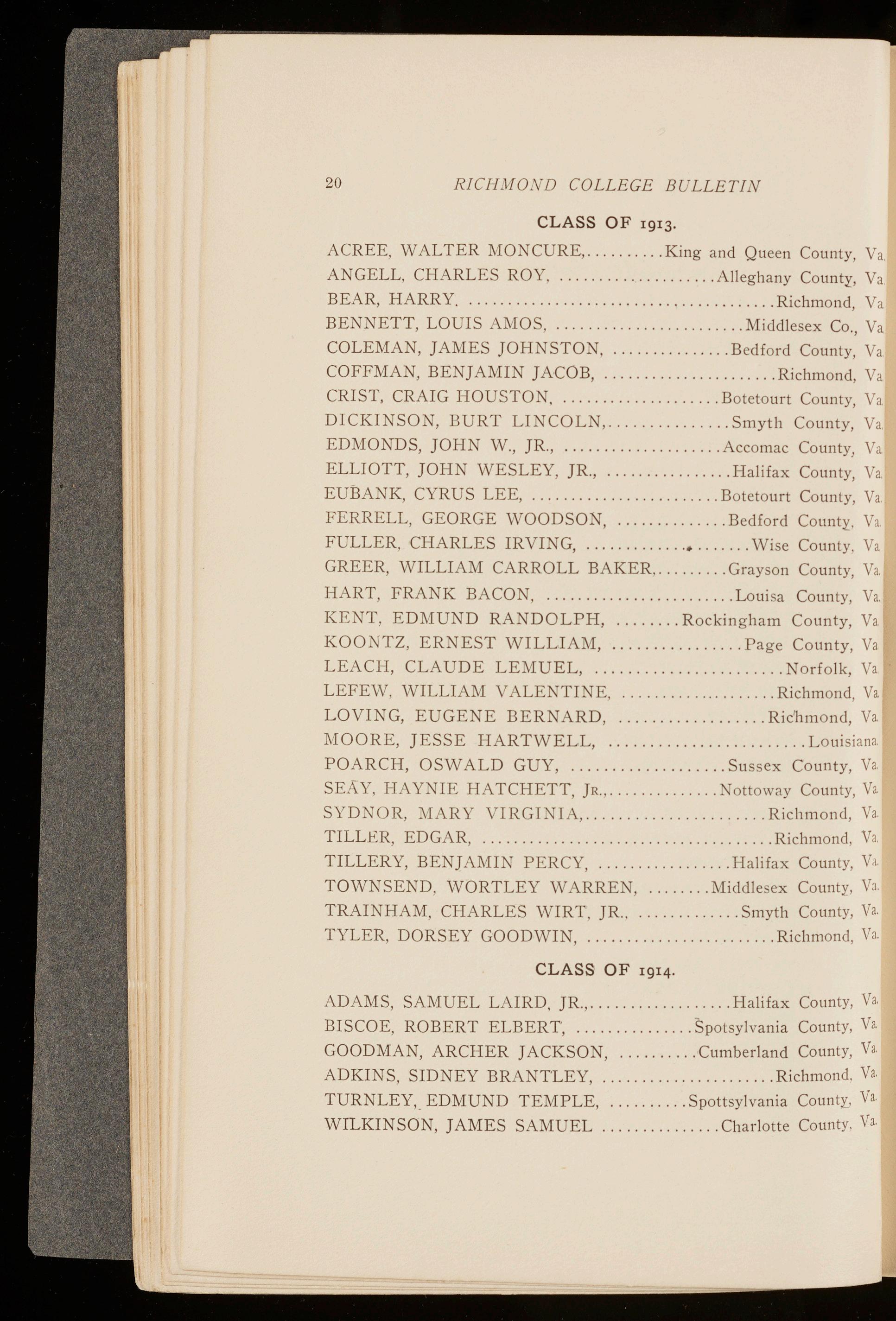
RICHJIO.\'D COLLEGE BULLETIN
CLASS OF 1913.
ACREE, WALTER MONCURE, King and Q ueen County , Va
ANGELL. CHARLES ROY . ........ .. ... . Alleghany County, Va
BEAR, HARRY. ..... .. ....................... .. Richmond , Va
BENNETT , LOUIS A1IOS , . . . .... Middlesex Co., Va
COLEMAN, J AMES JOHNSTON, .......... Bedford Coun ty, Va
COFFMAN, BENJAMIN JACOB, . .... ........... . Richmond, Va
CRIST, CRAIG HOUSTO . . ... . . . .. ....... ... Bot etourt County , Va
DICKINSON, BURT LIN COL , .. Smyth County , Va
EDMONDS, JOHN W., JR. , . . . . .. . . ..... . .. Accomac County , Va
ELLIOTT, JOHN WESLEY , JR. , ............. .. Halifax County, Va
EUBANK, CYRUS LEE , Botetourt County , Va
FERRELL, GEORGE WOODSON , ... Bedford Count y. V1
FULLER. CHARLES IRVING, .............•....... Wi se County . Va
GREER, WILLIAM CARROLL BAKER. ... .... Gray son County , Va.
HART, FRANK BACON, .. .. . ...... ... .......... Loui sa County , Va. KENT. EDMUND RANDOLPH, ........ Rockin g h a m County, Va
KOO N TZ , ERNEST WILLIAM, .. Page County , Va
LEACH, CLAUDE LEMUEL, ............ ........ . . N o rfolk, \'a LEFEW , WILLIAM VALE TINE , .. . ..... . ... . . . .... Richmond , Va
LOVING, EUGENE BERNARD, Ric11mond, Va
MOORE, J ESSE HARTWELL, .. . .. . ............ ..... L o ui siana
POARCH, OSWALD GUY, .............. .... Su ss ex County , Va
SE A Y, H AYNIE HATCHETT , JR....... No tto way Coun ty, Va
SYDNOR, MARY VIRGI N IA , .. .... . ..... Richmond , Va
TILLER, EDGAR, .. .. ........ . , . ..... R ichmond , Va. TILLERY, BENJAMI N PERCY , ....... . . . . . .. .. . Halifax Coun ty, V,t TOWNSEND , WORTLEY WARRE , Middle sex Count y, Va
TRAINHAM, CHARLES WIRT , JR. ...... ....... Smyth Count y, Va. TYLER , DORSEY GOODWIN , . . . . . ...... Richmond , Va CLASS OF 1914.
ADAMS , SAMUEL LAIRD. JR., .................. Halifax Count y, Va. BISCOE , ROBERT ELBERT, .......... .... Spotsylvania Coun ty, Va
GOODMAN, ARCHER JACKSON, .... , Cumberland County, Va
ADK I NS, SIDNEY BRANTLEY, ...................... Richmond Va
TURNLEY, EDMUND TEMPLE, ..... Spottsylvania Coun ty. Va WILKINSO .N, JAMES SAMUE L . Charlotte Count y. \' a.
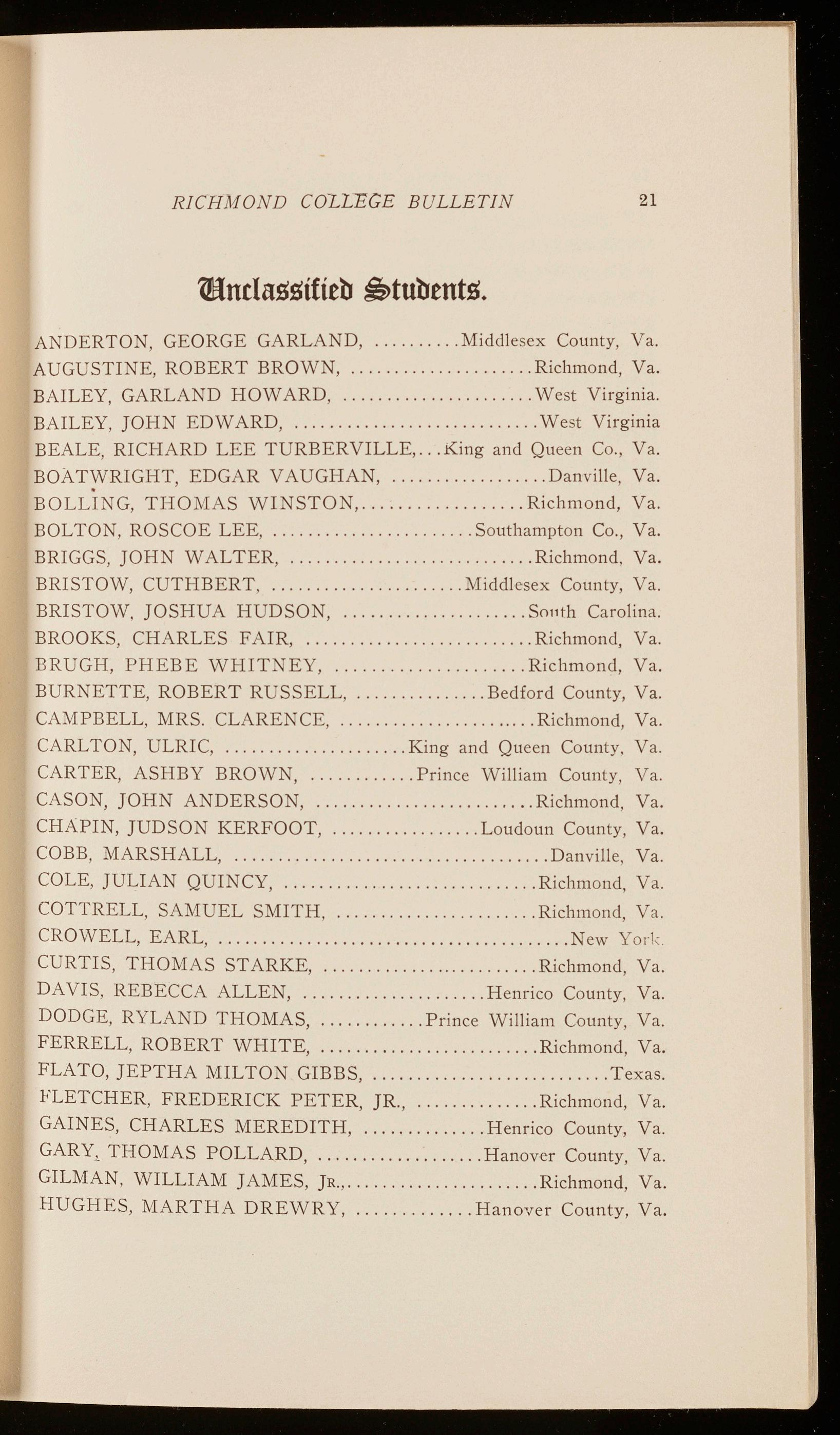
Wndassifid•$tubents.
ANDERTON, GEORGE GARLAND, Middle sex County, Va. AUGUSTINE, ROBERT BROWN, .. ................... Richmond, Va.
BAILEY, GARLAND HOWARD, .......... . ........... West Virginia.
BAILEY, JOHN EDWARD, ..................... West Virginia BEALE, RICHARD LEE TURBERVILLE, King and Queen Co., Va. BOATWRIGHT, EDGAR VAUGHAN, ...... Danville, Va.
BOLLING, THOMAS WINSTON, Richmond, Va.
BOLTON , ROSCOE LEE, Southampton Co., Va. BRIGGS, JOHN WALTER, .. Richmond. Va. BRISTOW, CUTHBERT ...... .. .. .. ........... Middlesex County, Va. BRISTOW, JOSHUA HUDSON, ............... ..... S011th Carolina. BROOKS, CHARLES FAIR, .................. Richmond, Va. BRUGH, PHEBE WHITNEY, ..................... Richmond, Va. BURNETTE, ROBERT RUSSELL , . Bedford County, Va. CAMPBELL, MRS. CLARENCE, ... Richmond, Va. CARLTON, ULRIC, ......... . ........... King and Queen County, Va. CARTER, ASHBY BROWN, .... . . ...... Prince William County, Va. CASON, JOHN ANDERSON, ........ ... . . ............ Richm ond, Va. CHAPIN, JUDSON KERFOOT, Loudoun County, Va. COBB, MARSHALL, ... ....................... Danville, Va. COLE, JULIAN QUINCY, ....... Richmond, Va. COTTRELL, SAMUEL SMITH, Richmond, Va. CROWELL, EARL, ..... New York. CURTIS, THOMAS STARKE, ...... Richmond, Va. DAVIS, REBECCA ALLEN, . .. .... . .. . .......... Henrico County, Va. DODGE, RYLAND THOMAS, ....... . .... Prince William County, Va. FERRELL, ROBERT WHITE, Richmond , Va FLATO, JEPTHA MILTON GIBBS, .................. . Texas. FLETCHER, FREDERICK PETER, JR., .............. Richmond, Va. GAINES, CHARLES MEREDITH, .. .. .......... Henrico County, Va. GARY , THOMAS POLLARD, . . ........... . ..... Hanover County , Va. GILMAN, WILLIAM J AMES, JR.,... . ............. . .... Richmond , Va . HUGHES, MARTHA DREWRY , ............. Hanover County, Va .
22
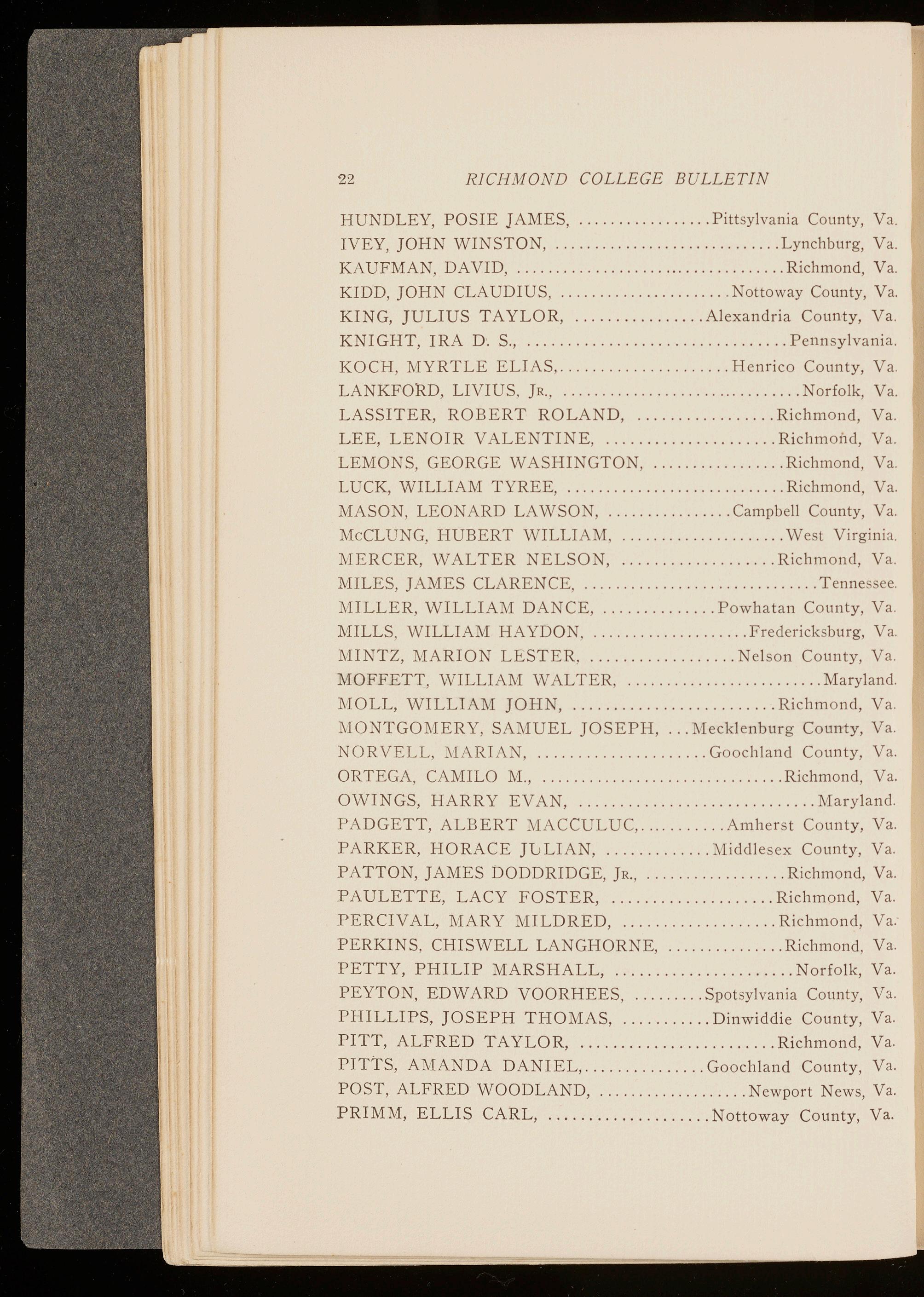
RICHMOND COLLEGE BU LL ETIN
HUNDLEY, PO SIE J AMES, ................. Pitt sylvania Cou nty, Va
IVEY, JOH N WINSTON, ............................. Lync hb urg, Va. KAUFMAN, DAVID, ........... Richmond , Va . KIDD, JOHN CLAUDIUS, ........... .......... Nottoway County, Va. KING, JULIUS T AYLOR, ................ Alexandria County, Va. KNIGHT, IRA D. S., ... . .. . .... .................. Pennsylvania. KOCH, MYRTLE ELIAS, .............. ...... Henrico County, Va. LANKFORD, LIVIUS. JR ...................... Norfolk, Va. LASSITER, ROBERT ROLAND, ...... Richm ond, Va. LEE, LENOIR VALENTINE, ............. .. Richmond, Va.
LEMONS, GEORGE WASHINGTON, ..... ........... Richmond, Va. LUCK, WILLIAM TYREE, ..... . ...... Richmond, Va. MASON, LEONARD LAWSON, .... ........... Campbell County, Va. McCLUNG, HUBERT WILLIAM, . . . . . . . . .. ... ..... West Virginia. MERCER, WALTER NELSON, ....... .. Richmond, Va. MILES, JAMES CLARENCE, ..... ............... .... ... .. Tennessee. :\[ILLER, WILLIAM DANCE, Powhatan County, Va. MILLS, WILLIAM HAYDON ....... ...... Fredericksburg, Va.
1IINTZ, ~IARION LESTER ........ . .. .. Nelson County, Va. MOFFETT, WILLIAM WALTER, ..... Maryland. l\JOLL, WILLIAM JOHN, .......... Richmond, Va.
MONTGOMERY, SAMUEL JOSEPH , ... Mecklenburg County, Va.
NORVELL, :\IARIAN, Goochland County, Va.
ORTEGA, CAMILO M , . . . . . . . . . . . . . ...... . . Richmond, Va.
OWINGS, HARRY EV AN, ............ .. ............... Iaryland. PADGETT, ALBERT MACCULUC, ........... Amherst County, Va.
PARKER, HORACE Ju LIAN, . ... .. 1Iidd le sex County, Va.
PATTON, JAMES DODDRIDGE, JR., ..... Richmond, Va.
PAULETTE, LACY FOSTER, .... . ............... Richmond, Va.
PERCIVAL, MARY MILDRED, ................. Richmond, Va.
PERKINS, CHISWELL LANGHORNE, .. . ... Richmond , Va.
PETTY, PHILI P MARSHALL, ....... . ..... .. ... . . . . Norfolk, Va.
PEYTON, EDWARD VOORHEES, Spot sylvania County, Va.
PHILLIPS, JOSEPH THOMAS, Dinwiddie County, Va.
PITT, ALF RED T AYLOR, .... . ..... . .. Richmond, Va.
PITTS, AMANDA DANIEL, Goochland County, Va.
POST , ALFRED WOODLAND, ... ................ Newport News, Va. PRIMM, ELLIS CARL, ... . ................ No tt oway County, Va.

R!CHJIOND COL L EGE BULLETIN
PRINCE, A NIE LOUISE, . ...... . . . Southampton County, Va. REA:\IS, LOUISE AGNES, ...... . . . Northampton County, Va. REDD, ISRAEL KAUP, ............ . ........ Hanover County, Va. RU TYON", HE RI ETTA BRONSTON, .. ..... ..... R ichmond, Va. srCKMAN, CHARLES ACHILLES, ... . . ....... Richmond, Va. SIMMONS, RAYMOND ROBINS ... ...... Chesterfield C::ounty,Va. SMITII, ALFRED TATE. . . . . . . . . ........ .Richmond, Va. SMITH. JAY HARDE .... ...... .......... Pittsyh·ania County, Va. SMITH, JOHN BROWN, ............. . ............ Henry County, Va. SMITH, WINFIELD ROSS, ............. ....... Amelia County, Va. SNEAD, JOSEPH PAYNE, ........... ......... Fluvanna County, Va. STARKE, MARJAN ETTINGER, .............. Henrico County, Va. STERN, HENRY SYCLE, ................ ........... Richmond, Va. STONE, JOHN TURNER, . ................. Hanover County, Va . STOUT, JAMES MARSHALL, ............. . ..... Augusta County , Va. SUMPTER, ELMORE ELLSWORTH. .... .. Montgomery County, Va. SUTHERLAND, SIDNEY, ............... .. .... ... ..... Richmond, Va. TAYLOR, RICHARD CARDWELL, ........ . . . .. Hanover County, Va. TAYLOR, RICHARD WILLSON, ... ....... . . . .... Richmond, Va. TEEL, JESSE FRA K, . ....... . . ... . Pulaski County, Va. THORNHILL, CLAUDE WILTO , ................... Lynchburg, Va. TIMBERLAKE , ROBERT EDWARD, . . .. H anover County, Va. TUCKER, JAME::, EDWARD, ...... . ... ...... Halifax County, Va. TUCKER, JESSE MILLER, .......... . . ... ........... Richmond, Va. UNDERWOOD, JOHN LEE. JR., . ......... Isle of Wight County, Va. UNDERWOOD, OSCAR WILDER, JR., ... . ......... . ... Alabama. VAUGHA , RICHARD WINGFIELD, ...... . ......... Richmond, Va. WALLERSTEI , RALPH DAVID, ..... .............. Richmond, Va. WHITE , SAMUEL FRANKLIN, JR., ... .............. Richmond, Va. WHITE, WALTER RALEIGH, . ...................... North Carolina . WILEY, WILLIAM BENJAMIN, .......... . ... Botetourt County, Va. WILSON, RHEY BYRNG, . ....... . ....... Newport News, Va. WINFREY, GEORGE HERMO LAYNE, ......... . Culpeper Co., Va. WOOD, JESSIE MA SFIELD , ....... . ......... .. . Richmond, Va.

RICHMOND COL LEGE BULLETIN
~tubentsin tbt~cbool of llaw.
SENIOR CLASS.
BAZILE, LEON MAURICE NELSON, ..... . .... Hanover County, Va.
BELFIELD, ALEXANDER BRUCE, .. . . ...... .. . . ... . Richmond, Va.
BOND, JEFFERSON DAVIS, Wi se County, Va
CARDOZA, EDWARD SAMUEL, .. , ............ Hanover County, Va.
COOK, GEORGE FREDERICK, ........ . Smyth County , VJ CUTCHINS, LOUIS ELKON, .... Richmond, Va.
HAZLETT, ALBERT COSMO, Ohi o.
HORNER, ROBERT HALL .... . ... . ........... . , ... Richmond, Va.
LIPSCOMB, WALTER PIERCE, Richmond, Va.
LONG, MACON MELVILLE, ...... . .. Rappahannock County, Va.
LOVE, FREDERICK WILLIAM, Lunenburg County, Va. McCOTTER, JASPER KENNETH, ....... Chesterfield County, Va.
PARKER, ELMORE JUNIUS, ................... North Carolina. tEIRCE, WENTWORTH WILLIS, ............... North Carolin a RHODES, ISRAEL, Richmond, Va. SCHWEICKERT, GEORGE C., .... Richmond, Va. SHEPPARD, JAMES ROSENHEIM, JR., ......... Richmond, Va. STRINGFELLOW, EWING PRICE, Culpeper County, Va. WILSON, RICHARD BAXTER, ................. . . Richmond , Va. WOODSON , GORDON BENNETT ............... Amherst Co., Va.
JUNIOR CLASS.
AMMONS, RICHARD ALLEN, ...................... Richmond , Va. ARNOLD, VIRGINIUS LOUD, ... Sussex County, Va BAGLEY, ISHAM TROTTER , Lunenburg County, Va. BARNES, AUBREY FITZHUGH, ..... . .. . ..... New Kent County, V a. BILLINGSLEY, JOSEPH ADDISON, ..... . King George County, Va. BRADSHAW, BERNARD OSBORN Richmond, V a. BOWKER, DANIEL OEHRLE, . Massachusett s. BROUDY, JESSE LOUIS, ............. . ................. Norfolk, Va. BROWN, JESSE GWALTNEY, ........... . ..... Warwick County, Va. BRUCE, REGINALD Richmond, Va.

RICHMOND COLTEGE BULLETIN 25
BOWIE, WELLING, . .. . ... . ..... ......... Caroline County, Va. CAMPBELL, RICHARD LEE, .. . ......... . ... Richmond, Va. CAMPBELL, STANLEY BATES ........... . ....... Richmond, Va. COLE, OSWALD L., ...... .. . .. ........... . Richmond, Va.
GARRETT, ROLAND, ........ .................. Richmo nd, Va. GILL, RAYMOND WILLIS , ........... ..... Petersburg, Va. GILLIAM, HERBERT BRAGG, .................. Petersburg, Va. GLASS, ROBERT ... . ...... ...... .. Lynchburg, Va. GUY, LUTHER ELLSWORTH, ........... . .... Surry County, Va . HOWARD, HORATIO SEYMOUR, ........... Floyd County, Va. HUDSON, Ei\'Ii\1ETT CLINTON ...... ............ Ne lson Co., Va. INGRAM, JOHN LITTLEPAGE, ................. Ric'hmond, Va. J ONES, ALLEN CARTER, J R., ............. . Newport News, Va. KERSHAW, ARTHUR ROLAND, .... .......... ... Connecticut. KIRSH, ALFRED JOSEPH, .. ... ............... R ichmond , Va. LEARY, ER EST WOODARD, ...... ............ Richmond, Va. McFARLANE, EDWARD LEE, .. ............ . .... Richmond, Va. MATTHEWS, WILLIAM EMMETT, .. . . ........ South Carolina. MAY, IRVING, ............... .. ..... ..... Ric'hmond, Va. McGARRY, JOHN HENRY, ................... ·.... West V irginia. MEREDITH, ALGIENON RUSSELL, ... Brunswick County, Va. NELLI ST, i\1ERLE FRANCIS, . ... . ..... Amelia County, Va. NUNNALLY, JOSEPH COURTNEY, Chesterfield County, Va. PARKER, J OSEPH DANIEL, . .... ........ Warwick County, Va. PECK, J OSIAH CA R L, ................. . ....... West Virginia. READY, ELLETT WHARTON ..................... Richmond, Va. SHAUGHNESSY, CHARLES FRANCIS, ..... .... Richmond, Va. SHELTON, SAMUEL WILLIAM, ........... Hanover County, Va WILLIAMS, MERCER MACDONALD, ...... Henr ico County, Va. WOODARD, SHELTON NATHANIEL, . ......... . . Norfolk, Va.

RICHMOND COLLEGE BULLETIN
1l)egrees<ttonferreb at <!Commencement, ,June15, 1910.
DOCTORS OF DIVINITY.
REV. ROBERT E. CHAMBERS, M. A , Th. M . Canton, China.
REV. J. E. HICKS , M. A ........... . ............ . ...... . . Danville, Va.
REV . GEORGE S . KENNARD ............. . ............ . Ashland, K y.
REV. RYLAND KNIGHT, B. A., Th . D ..... . ........... Richmond, V3.
MASTER OF ARTS .
JOHN BUNYAN HILL. B. A .. . ........ . .......... Halifax County, Va. Thesis: "Commission Plan of Municipal Government."
BA CH E LORS O F A RT S.
ERNEST LEE ACKISS ................. . Princess Anne County, Va.
ROY ROSCOE BANNER ... .................. Wise County, V a.
JOHN GLENN BARBE ... . .................. Washington County, Va.
JAMES HENRY BEAZLEY ..... Caroline County, Va.
WILLIAM ROBERT BEVERLEY ... . ........... Richmond, Va.
ROBERT BOWLING ............................. Nelson County, Va.
ROBERT ALONZO BROCK, JR., ................ .... Richmond , Va.
FRANCES FOLSOME COFFEE ........... , ...... Richmond , Va.
WILLIAM GARLAND COLEMAN ............... Clarke County , Va.
TERRY COLLEY DURRUM Appomattox County, Va.
STILES HUOT ELLYSON ......... . .................. Richmond, Va.
VIRGINIUS CARLISLE FROST . . . ..... .. . .. . . ............ Tennessee.
CLARA MILES GARY . Richmond, Va.
SPENCER GLAS GILL .. . ..... . ................ . ..... Petersburg, Va.
JOSEPH FRANKLIN GULICK ........... Prince William Co., Va
THOMAS CARL HUTTON .. ........... Roanoke. Va
HENRY BEASLEY JENNINGS, J R., . ........ Appomattox County, Va.
FRANK GARRETT LOUTHAN, .............. Cl arke Co u nty, Va.
DANIEL BRUCE MOFFETT ........ . . . .. . . . ...... . . . . . Roa noke, Va.
MARY WORTLEY MONTAGUE ... .. Richmond, Va.
ALBERT THOMAS RANSONE, J R. , ................ Hampton, Va.
GERTRTJDE RICHARDS .............. . ...... . .......... Norfolk, Va.
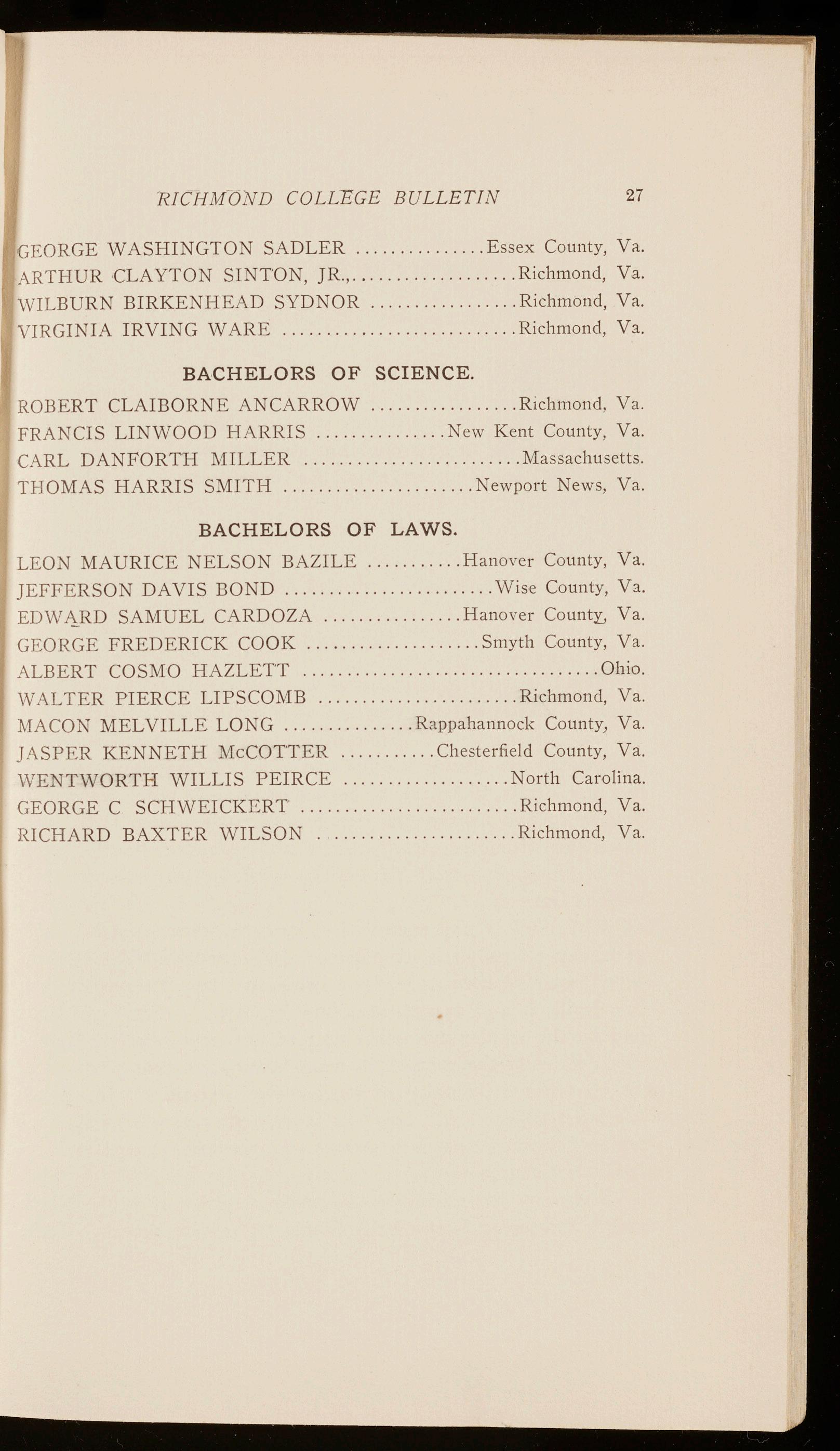
GEORG E WASHINGTON SADLER . ....... . .... Essex County, Vit.
ARTHU R CLAYTON SINTON, JR., ......... ....... . Richmond, Va.
WILBURN BIRKENHEAD SYDNOR ............ Richmond, Va.
VIRGINIA IRVING WARE ....... . ........ . . Richmond, Va.
BACHELORS OF SCIENCE
.
ROBE RT CLAIBORNE Ar CARROW ................. Richmond, Va.
FRANCIS LINWOOD I-TARRIS . .. New Kent County, Va.
CARL DANFORTH MILLER ..... . .. Massachusetts.
THOMAS HARRIS SMITH ... . ...... . ... Newport News, Va.
BACHELORS OF LAWS
.
LEON MAURICE NELSON BAZlLE ........... Han ove r County, Va.
JEFFERSON DAVIS BOND ............. . . Wise County, Va.
EDW~ RD SAMUEL CARDOZA ........... HanoYer County, Va.
GEORGE FREDERICK COOK .. . . . .. . ... . .. Smyth County, Va.
ALBER T COSMO HAZLETT ................. . .............. Ohio.
WALTER PIERCE LIPSCOMB .. . .... . Richmond, Va
MACON MELVILLE LONG ... . ........... Rappahannock County, Va.
JASPER KEN NETH McCOTTER ......... . . Chesterfield County, Va.
WENTWORTH WILLIS PEIRCE .. . ... . ..... . ...... North Carolina.
GEORGE C SCHWEICKERT . ... ......... Richmond, Va.
RICHA RD BAXTER WILSON . . ............. .. Richmond, Va.
MrCHMO:N'D COLLEGE undertakes to provide instruction as broad and thorough as can be had in any purely secular college, and. in addition , to surround the student with influence most conduciv-e to the development of Christi an character. Its tests of cholarship are rigi d, and the standard of graduation is unusually high, while the physical, social and religio us welfare of its students is regarded as no Jes important.
LOCATION
The founders of the College howed rare wisdom and for esight in selecting a location for their institution. Richmond i, not only the capital of Yirginia, but it is the best known city in the South, ancl one of the historic cities of the world. Enduring memorials of Ame;-ican heroes constantly teach le . sons of patriotism and inspire the young with noble ideal . The bu ,;y city, with its varied manufactories and extensive commerce, r emincls the student that the modern scholar must be practical as well as learned.
Richmond is also a city of religious influences, and it. able and eloquent pulpit is an efficient aid to culture. The temptation to young men away from home are but little greater than in a village, and are counteracted by better police regulation, and by the wholesome moral tone of an exceptionally religious city. Life on the campus is remarkably free from temptation. In no other community of similar size, except at some other Christian colleges, will there be found so large a proportion of active Christians, or such strong and perva ive moral and religious influences.
Richmond lies midway between the severe cold of the North and the relaxing heat of the South. The nine months of th e

RICHJ10ND COLLEGE BULLETIN
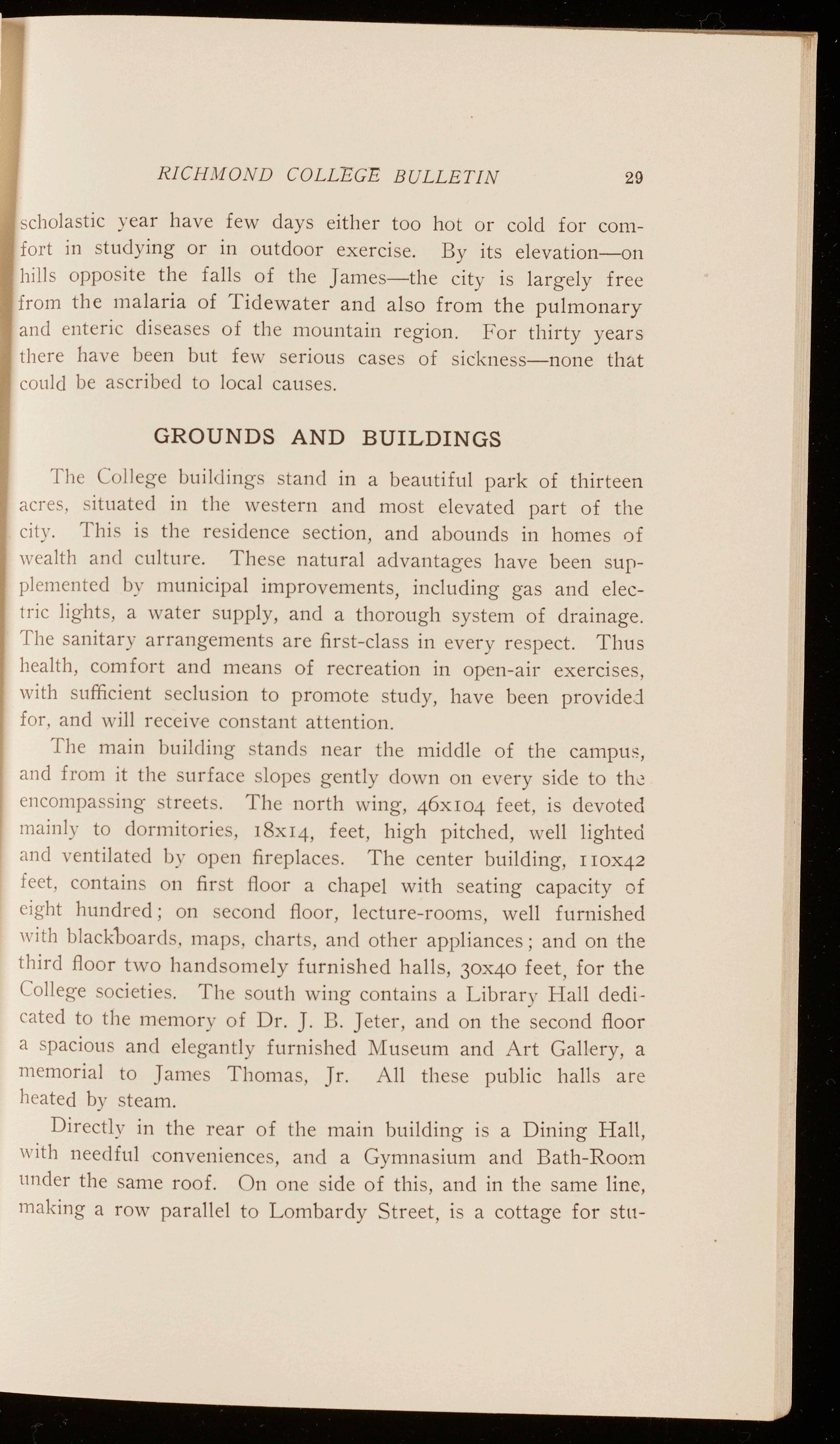
29
scholastic year have few days eithe r too hot o r cold for comfort in studyi ng or in outdoor exerci e. By its elevation-on hills opposite the falls of the James-the city is larg ely free from the malaria of Tidewater and also from the pulmonary and ente ric diseases of the mountain region. For thirty years there have been but few serious cases of ickness-none that could be a cribed to local cause .
GROUNDS AND BUILDINGS
The College buildings stand in a beautiful park of thirteen acres, situated in the western and most elevated part of the city. This i the re idence section, and abounds in homes of wealth and culture. The e natural advantages have been sup- plemented by municipal improvements, including gas and electric lights, a water supply, and a thorough system of drainage . The sanitary arrangement are fir t-class in every respect. Thus health, comfort and means of recreation in open-air exercises, with sufficient seclusion to promote tudy, have been providd for, and will receive constant attention.
The main building stands near the middle of the campus, and from it the surface slopes gently down on every side to th(! encompassing street ' The north wing, 46xro-1- feet, is devoted mainly to dormitories, 18xq, feet, high pitched, well lighted and ventilated by open fireplaces. The center building, r rox42 feet, contains on first floor a chapel with seating capacity of eight hundred; on second floor, lecture-rooms, well furnished with blackboards. maps, charts, and other appliances; and on the third floor two handsomely furnished halls, 3ox40 feet, for the College societies. The outh wing contains a Library Hall dedi- cated to the memory of Dr. J. D. Jeter, and on the econd floor a spac iou. and elegantly furnished 1u eum and Art Gallery, a memorial to James Thoma , Jr. All these public halls are heated by steam.
Directly in the rear of the main building is a Dining Hall, with needful conveniences, and a Gymnasium and Bath-Room under the same roof. On one ide of this, and in the same line, making a row parallel to Lombardy Street, i a cottage for stn-
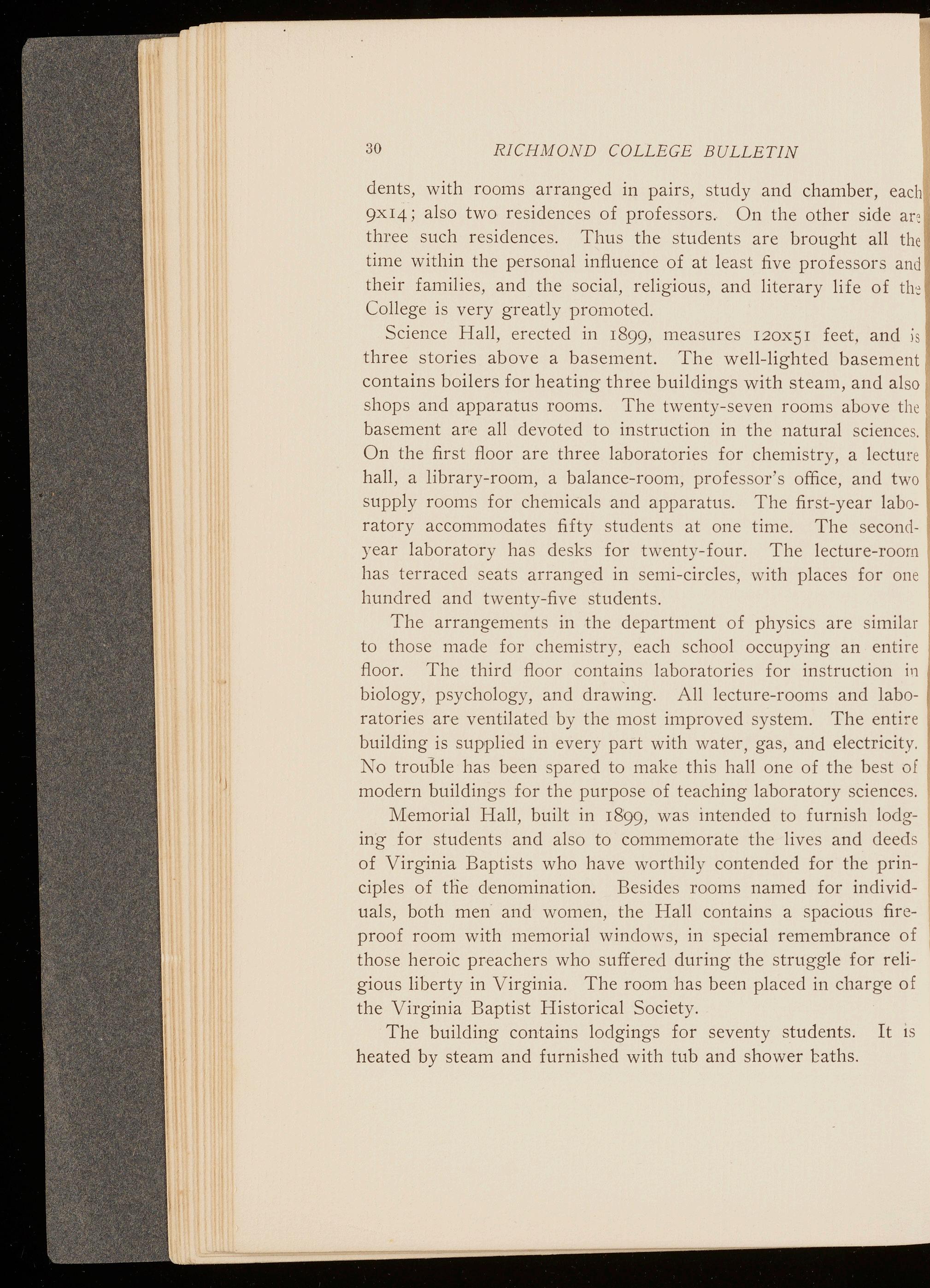
30 RICHMOND COLLEGE BULLETIN
dents, with rooms arranged in pairs, study and chamber, each 9x14; also two residenc ,es of professors. On the other side ar : three such residences. Thus the students are brought all the time within the personal influence of at least five professors and their families, and the social, religious, and literary life of th~ College is very greatly promoted.
Science Hall, erected in 1899, measures 12ox51 feet, and is three stories above a basement. The well-lighted basement contains boilers for heating three buildings with steam, and also shops and apparatus rooms. The twenty-seven rooms above th e basement ar ,e all devoted to instruction in the natural science s.
On the first floor are three laboratories for chemistry, a lectur e hall, a library-room, a balance-room, professor's office, and two supply rooms for chemicals and apparatus. The first-year laboratory accommodates fifty students at one time. The secondyear laboratory has desks for twenty-four. The lecture-room has terraced seats arranged in semi-circles, with places for one hundred and twenty-five students.
The arrangements in the department of physics are simil a r to those made for chemistry, each school occupying an entire floor. The third floor contains laboratories for instruction in biology, psychology, and drawing. All lecture-rooms and laboratories are ventilated by the most improved system. The entire building is supplied in every part with water, gas, and electricity. No trouble has been spared to make this hall one of the best 0£ modern buildings for the purpose of teaching laboratory sciences.
Memorial Hall, built in 1899, was intended to furnish lodging for students and also to commemorate the lives and deed s of Virginia Baptists who have worthily contended for the principles of the denomination. Besides rooms named for individuals, both men · and women, the Hall contains a spacious fireproof room with memorial windows, in special remembrance of those heroic preachers who suffered during the struggle for religious liberty in Virginia. The room has been placed in charge of the Virginia Baptist Historical Society.
The building contains lodgings for seventy students. It is heated by steam and furnished with tub and shower 1::aths.
ORGANIZATION
The College is composed of nine academic schoo ls, or depart- ments, and the professional school of Law. Instruction is also given in Biology, Education, Public Speaking, Mechanical and Freehand Drawing, Biblical Liberature and Physical Culture. The Faculty consists of the president and professors, each pru- fessor being responsible for the efficient conduct of his own school. The president has general oversight and direction of the discipline of the College, but may refer to the Faculty case;; calling for serious penalty.
DISCIP LINE
The deportment of a Christian gentleman is the standard to which every student is expected to conform. All appropriate means are used to develop and confirm a sense of personal honor and sacred regard for truth, as upon these rests the best re- liance for good conduct. A few plain and reasonable rules are prescribed, and each matriculate must pledge himself to obey them. The following regulations are now in force:
I. Each student shall attend punctually every lecture, reci- tation and examination held in the classes of which he is a mem- ber, and sha ll furni sh at the specified times the written exer- cises appointed for such classes. If a student is absent or tardy, he shall, at the first opportunity thereafter, offer explanation of such absence or tardiness to the professor in charge. If absent or unprepared as many as three times in any month, he must stand a special written examination to make good the deficiency.
II. The president will a sign students to rooms. Occupants will be held responsible for the good order of their rooms, as well as for any damage or defacement they may sustain. No person, other than an officer of the College, has any right to enter a lodging except upon invitation of the occupants. Changes from one room to another may be allowed by the president, but must not be made without his previous consent. All students occupying rooms on the campus are required to attend the con- ference of professors and students, held every Wednesday morn-


lVCHMOND COLLEGE BULLETIN
ing throughout the session, 8-40 to 9 A. M. All students are required to attend a general college conference held once a month throughout the session.
III. A resident student desiring to leave the premises during the hours when, by the Schedule of Recitations, he should be in his classes, shall get permission from the president. Any student desiring to be absent from College shall get the president' " permit in writing and exhibit it to each of his professors.
IV. Students shall at all times carefully abstain from unnecessary noise, particularly in the College buildings, and from everything likely to prevent study on the part of others. Loafing in the rooms of other students during the hours appropriated to study is especially forbidden. Games and all forms of playing on the College campus are forbidden except from 2 P. M to 8 P. M. and on Saturdays from 12 M. to 8 P. M.
V. The Faculty regards hazing as a serious offence against College order. All forms of hazing are strictly forbidden.
VI. If a student destroy, deface, or in any way damage College property, or aid and abet others in so doing, he shall, with 1.n twenty-four hours, report the fact to the Superintendent :>f G1ounds and Buildings. Students will be charged pro rata for all damages not individually accounted for. Playing ball in the buidings and throwing water from windows or porches are strictly prohibited.
VII. No student shall bring upon the premises or keep in his possession any playing cards, intoxicating liquors, clogs, or deadly weapons.
VIII. No Clubs or Societies shall be formed unless the Faculty, on application made, approve the design of such A ss oci,1tion, the rules by which it proposes to be governed, and the hours of meeting.
IX. Resident students desiring to board elsewhere than on the College premises must first obtain the approval of the president. No boarding houses will be approved whose meal hours do not conform to the college schedule.
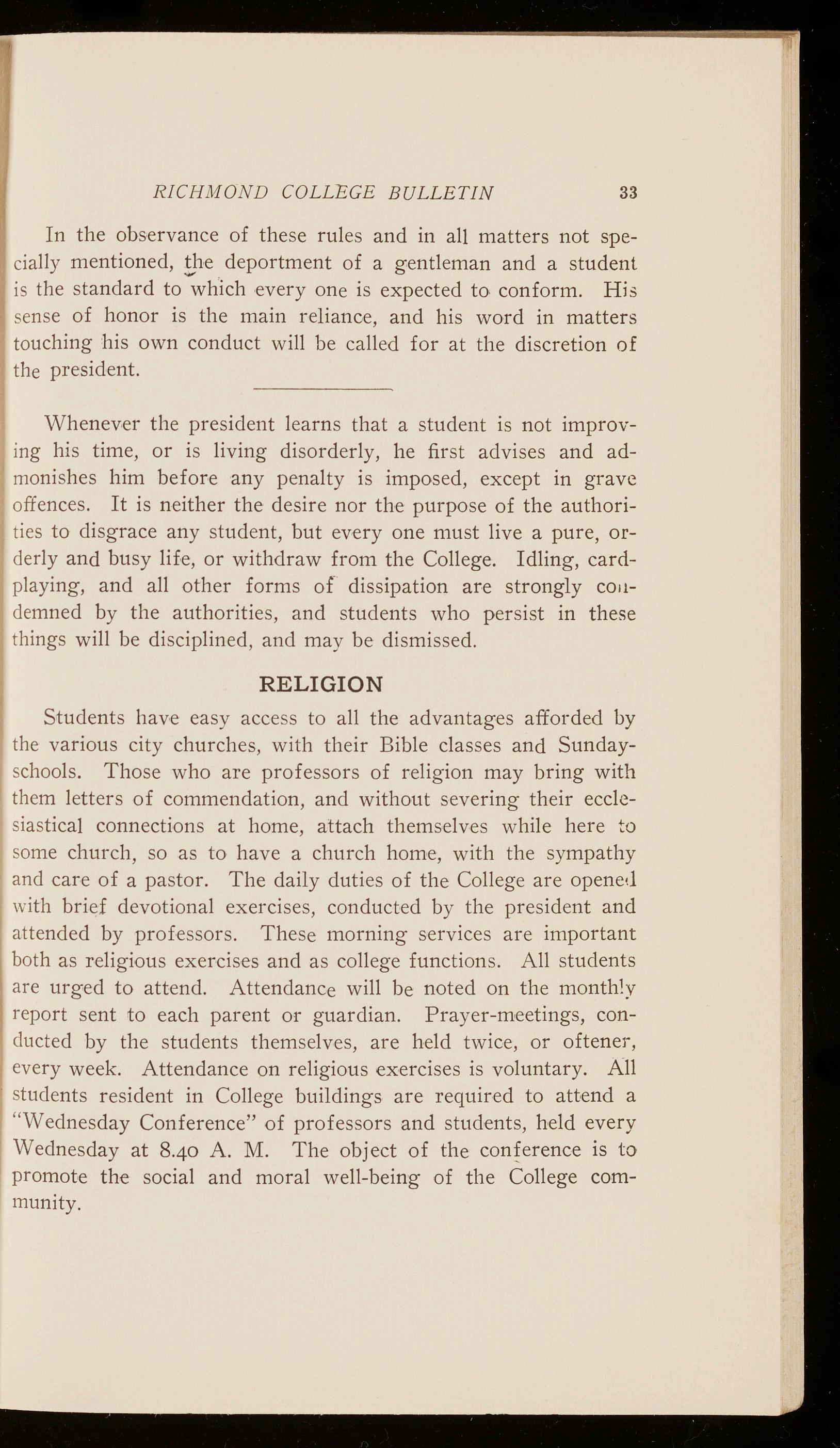
In the obs-ervance of these rules and in all matters not specially mentioned, the deportment of a gentleman and a student is the standard to -which -every one is expected to conform. His sense of honor is the main relianoe, and his word in matters touching his own conduct will be called for at the discretion of the president.
Whenever the president learns that a student is not improving his time, or is living disorderly, he first advises and admonishes him before any penalty is imposed, except in grave offences. It is neither the desire nor the purpose of the authorities to disgrace any student, but every one must live a pure, orderly and busy life, or withdraw from the College. Idling, cardplaying, and all other forms of dissipation are strongly co11demned by the authorities, and students who persist in these things will be disciplined, and may be dismissed.
RELIGION
Students have easy acce s s to all the advantages afforded by the various city churches, with their Bible classes and Sundayschools. Those who are professors of religion may bring with th em letters of commendation, and without severing their ecclesiastical connections at home, attach themselves while here to some church, so as to have a church home, with the sympathy and care of a pastor. The daily duties of the College are opened with brief devotional exercises, conducted by the president and attended by professors. These morning services are important both as religious exercises and as college functions. All students are urged to attend. Attendance will be noted on the month!y r eport sent to each parent or guardian. Prayer-meetings, conducted by the students themselves, are held twice, or oftener, every week. Attendance on religious exercises is voluntary. All students resident in College buildings are required to attend a " Wednesday Conference" of professors and students, held every Wednesday at 8.40 A. M. The object of the conference is to promote the social and moral well-being of the College community.

cttourstsof 3Jnstruction.
SCHOOL OF LATIN LANGUAGE AND LITERATURE
PROFE SSOR DICK E Y
Students entering the school will be classed accordin g to their preparation. Those who expect to enter any one of the classes will find profit in reviewing carefully in the sum mer leisure the forms as found in any Latin grammar.
In all classes written recitations are given from tim e to time, for which there may not nece ss aril y be previous n otice. In all classes parallel work will be a s signed for pri v ate r eading, and as occasion ari s es, topics on kindred literar y and linguistic subjects will be given for inve s tigation and presentation.
The importance of the study of Greek is empha s ize d for all who wish to get the full cultural value of the cour se in Latin. The study of French and other romance lang uages is highly enlightening to the student o f Latin.
COURSE A
Three units of the standard entrance requirements a s published in the catalogue are required for entrance to this course
r. Reading.-Cicero (Manilian Law and Select Lett ers); Vergil (Aeneid i-iv); Ovid (Selections).
The reading of this course will be supplemented by occa· sional lectures on such general subjects as Roman Orat ory, the rise and development of the Roman Epic in its rela t ion to the Greek, the lives of the authors studied, &c.
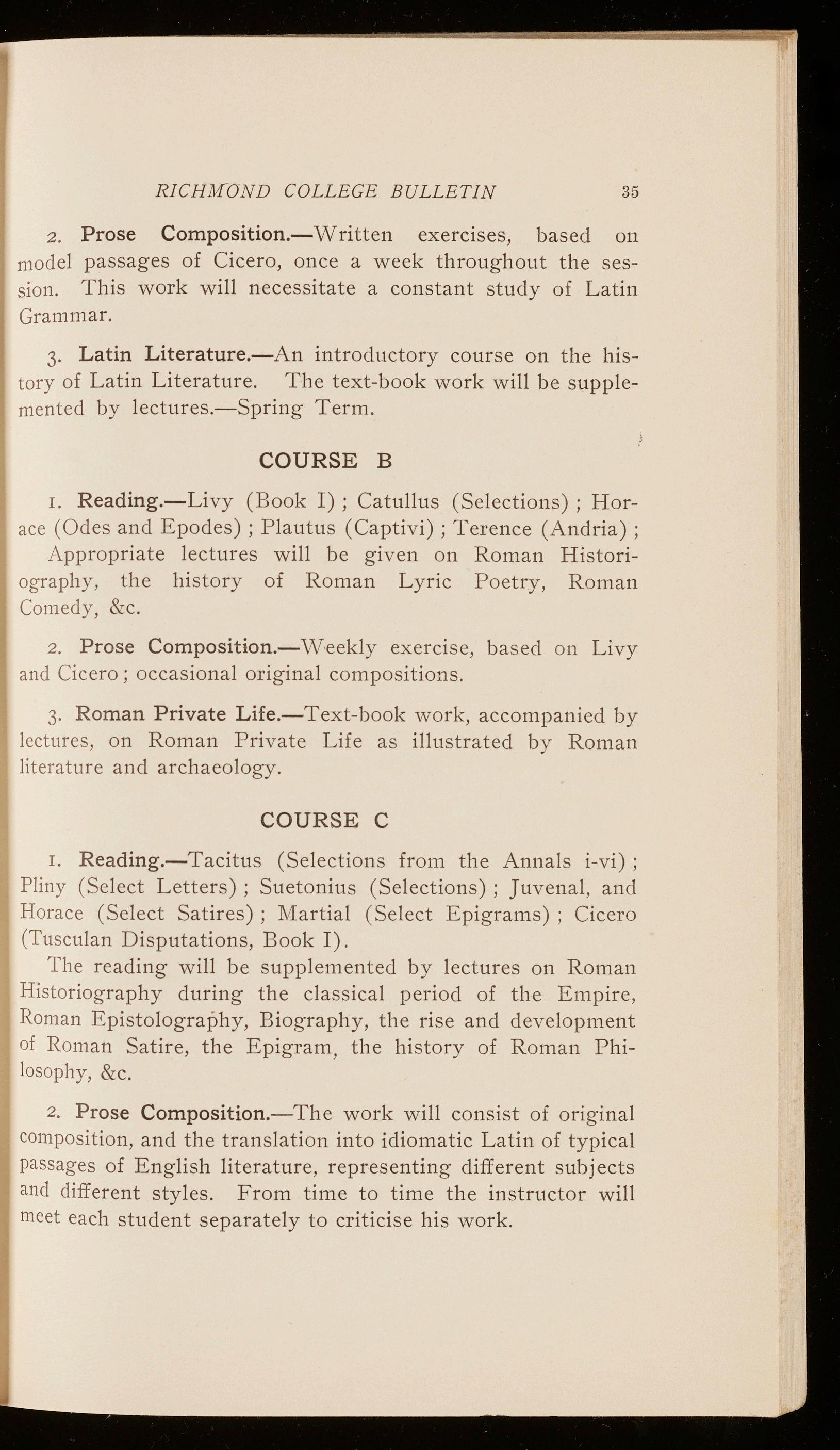
2. Prose Composition.-W ri tten exercises, based on mode l passages of Cicero, once a week throughou t the session. This work will neces sitate a constant study of Latin Gramma r.
3. Latin Literature.- An introductory course on the history of Latin Literature. The text-book work w ill be supp lemented by le ctures .-Sprin g Term.
COURSE B
r. Reading.-Livy (Book I); Cat ullu s (Se le ctions); Horace (Odes and Epodes); Plautus (Cap ti vi); Terence (Andr ia) ; Appropr iate lectures will be given on Roman Historiography, the history of Roman Lyric Poetry, Roman Comedy, &c .
2. Prose Composition.-W -eekly exercise, based on Livy and Cicero; occasional original compositions.
3. Roman Private Life.- Text-book work, accompanied by lectures, on Roman Private Life as illu st rated by Roman literature and archaeology.
COURSE C
r. Read ing.-T ac itus (Selections from the Annals i-vi); Pliny (Select Letters); Suetonius (Selections); Juvenal , and Horace (Select Satires); Martial (Select Epigrams) ; Cicero (Tusculan Disputations, Book I).
The reading will be supplemented by lectures on Roman Historiography during the classical period of the Empire, Roman Epistolography, Biography, the rise and development of Roman Satire, the Epigram, the history of Roman Philosophy, &c.
2. Pros e Composition.-Th e work will consist of origina l compositio n, and the translation into idiomatic Latin of typical passages of English literatur e, r ep re senting different subjects and different sty les . From time to time the instruct o r will meet each student separate ly to criticise hi s work.

3. Latin Literature.-A general survey of the classical literature of the Romans. The study of a text-book will be supplemented by appropriate lectures.
LATIN D
1. Reading.-Tacitus (Diologus de Oratoribus); Cicero (Brutus); Horace and Juvenal (Select Satires); Horace (Ar s Poetica); Quintilian Book x.)
The reading will be supplemented by lectures on Roma n Oratory, Satire, and Literary Criticism.
2. Prose Composition.-Th e composition of this course will be given on the same plan as that of Course C. The exercises will be adapted to the advancement of the individu al student.
3. Special reports on assigned topics dealing with Roma n life and literature.
SCHOOL OF GREEK LANGUAGE AND LITERATURE
PROFESSOR HARRI S
The aim of the school is to give the student an appreciative acquaintance with the best Greek authors and to inspire a love for Hellenic studies. From the beginning of th e course exactness will be in s isted upon. In all classes readin g at sight will be practiced, and English will be put into th e Greek , either as a set exercise or at dictation. At suitable times there will be conferences on Greek life, mytholog y, history , literature and art, and at all times an effort will be made to lead the student into a keener appreciation of the genius of the Greeks, and to cultivate a sense for th eir lite rary standards.
The work of this school is embraced in the followin g courses:
Introductory Class.-Thi s class begins with the alphabe t , and is occupied in securing a thorough knowledge of forms ,

a wo rking vocabularly, and the fundamental points of syntax. In the spring, the Anabasis will be taken up, and two or more books will be read. Five hours a week throughout the year. To enter this course some knowledge of Latin is prereq uisite.
Course A.-This class will complete four books of the Anabas is and then take up Lysias, or some author to be selecte d. Especial attention will be paid to forms and inflectio ns. Weekly exercises in composition; translation at sight; grammar. Five hours a week throughout the year.
Course B.-This class will be subject to change as the needs of the students may dictate. The work will center around Plato and Homer. Weekly exercises in composition; brief lectures on Greek. philosophy, the Drama, Homer, and their relations to Greek life . Work will be assigned for private reading, on which the student will be examined.
Course C.-In this class the work will center around Thucyd ides and Demosthenes and the Drama. Work will also be assigned for private reading in Herodotus and the Attic Orators. This course will be made as general as is consistent with thoroughness. Lectures on Literature, Grammar and Rhetoric.
Greek Testament.-If there is sufficient demand, provision will be made for a study of the New Testament in Greek. This class is not given College credit, but finds in itself its own reward. The work will be made as practical as possible. Through the College Library the student has access to all necessary works of reference.
TEXT-BOOKS.
Introductory.-B enner & Smyth's Beginner's Greek Book; Goodell's Greek Grammar; Harper & Wallace's, Goodwin's · or Smith's Ana basis.
Course A. -Xenop hon 's Anabasis and G,rammar as above. Wai•t's Oration5· of Lysias; Pearson's Greek Prose Composition.
Course B.-Benn er's Homer's Iliad; Plato's Euthyphro (Heidel);
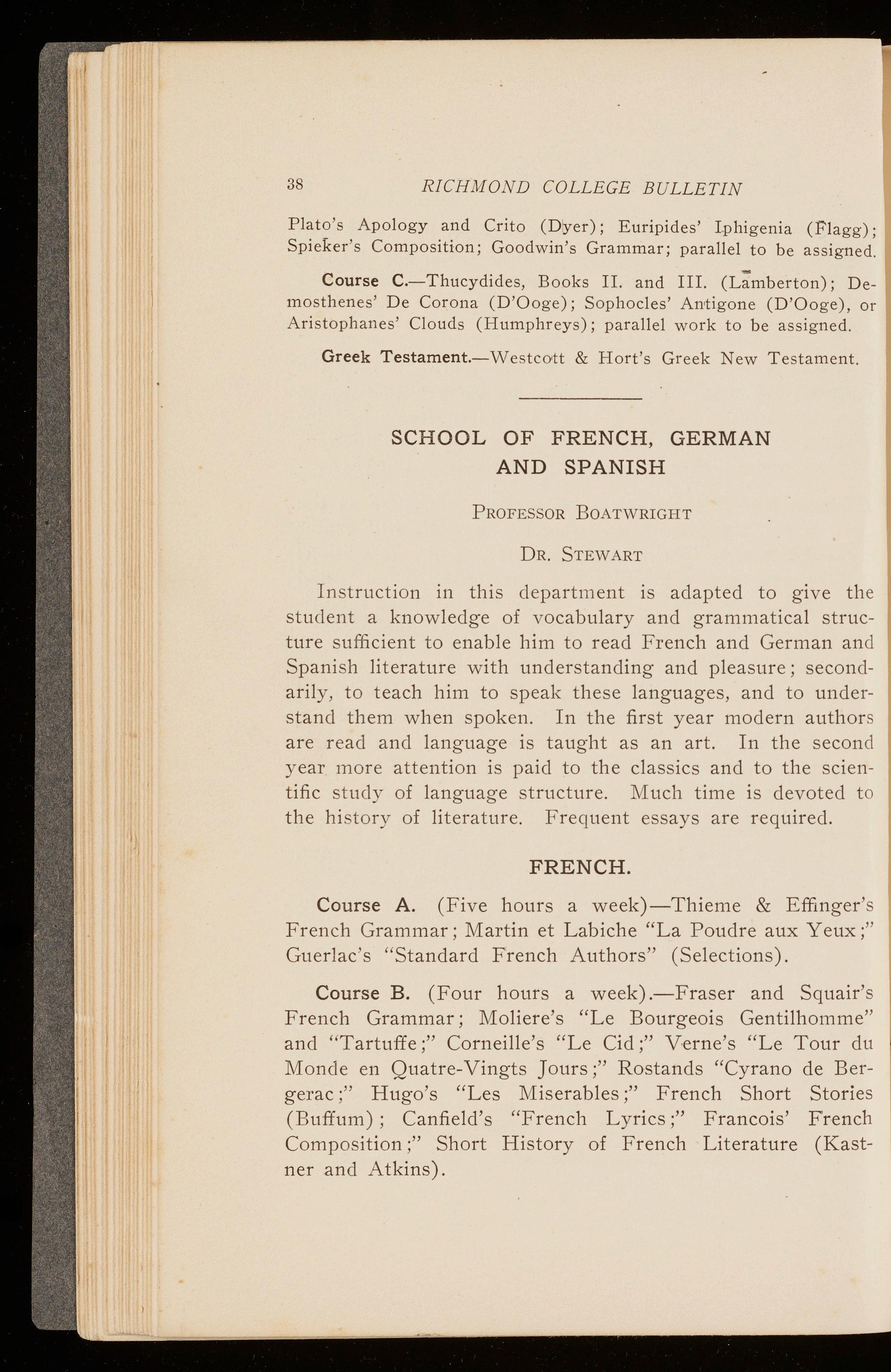
RICHMOND COLLEGE BULLETIN
Plato's Apology and Crito (Dyer); Euripides' Lphigenia (Flagg); Spieker's Composition; Goodwin's Grammar; parallel to be assigned.
Course C.-Thucydides, Books II. and III. (L;'mberton); Demosthenes' De Corona (D'Ooge); Sophocles' An •tigone (D'Ooge), or Aristophanes' Clouds (Humphreys); parallel work to be assigned.
Greek Testament.-Westcatt & Hort's Greek New Testament
SCHOOL OF FRENCH, GERMAN AND SPANISH
PROFESSOR BOATWRIGHT
DR. STEWART
Instruction in this department is adapted to give th e student a knowledge of vocabulary and grammatical structure sufficient to enable him to read French and German and Spanish literature with understanding and pleasure; secondarily, to teach him to speak these languages, and to understand them when spoken. In the first year modern author s are read and language is taught as an art. In the secon d year more attention is paid to the classics and to the scientific study of language structure. Much time is devoted t o the hi s tory of literature. Frequent essays are required.
FRENCH.
Course A. (Five hours a week)-Thieme & Effinger' s French Grammar; Martin et Labiche "La Poudre aux Yeux ;" Gu er lac ' s "Standard French Authors" (Selections).
Course B. (Four hours a week) .-Fraser and Squair's French Grammar; Moliere's "Le Bourgeois Gentilhomme" and "Tartuffe;" Corneille's "Le Cid;" Verne's "Le Tour du Mon de en Quatre-Vingts Jours;" Rostands "Cyrano de Bergerac;" Hugo's "Les Miserables;" French Short Stories (Buffum); Canfield's "French Lyrics;" Francois' French Composition;" Short History of French Literature (Kastner and Atkins).

GERMAN
Course A. (F ive hours a week).-Bacon's German Gramma·r and Reader; Till Eulenspiegel (Betz); Gluck Au£ (Muller & Wenckeback). ·Wi lh elm Tell, Schiller. Harri s' Composi tion.
Course B. (Fo ur hours a week).-Joynes-Meissner's German Grammar; Harris' German Composition; Schiller's Wilhelm Tell; Lessing's "M inna von Barnhelm ;" Heine's Prose (Fa u st's edition) ; "Aus dem deutschen Dichterwald" (D illar d ) ; Goethe's "Meisterwerke" (Bernhardt) ; Thomas' German Lite ratur e.
SPANISH
Course A. (Five hours a week). -Hill and Fo rd ' s Spanish Grammar; Bransby's Spa •nish Reader; Padre Isla's "Gil Blas."
Course B . (Four hour s a week) .-Cervantes' "Don Quixote" ( Ford ' s Selection s ); Alarcon's Sombrero de tres Ficos;" Galdos' " Marianela; " Lope de Vega ' s Ca ld eron de la ba rca; Obras Maetras; Valdes "Jose;" Echegaary "O Loetira o Santidad ;" Ford's Spanish Exercises; FitzmauriceKelley's "Spanish Literature. Ap picants for admission to advanced classes are expected to hav e completed the full equivalent of the lower courses. Know ledge of grammatica l forms and familiarity with irregular v erbs w ill be required. Previo us drill in conversation is also v ery desirable. ·
IV. SCHOOL OF ENGLISH LANGUAGE AND LITERATURE
PROFE SSOR METCALF
ASSIST A NT PROFESSOR DERIEUX.
A-r. English Literature, General View.-First Term: the beginni ngs to Mi lton. Second Term: Mi lton to Wordswo rth. Third Term: Vvordsworth to Tennyson.-A few t ypi -
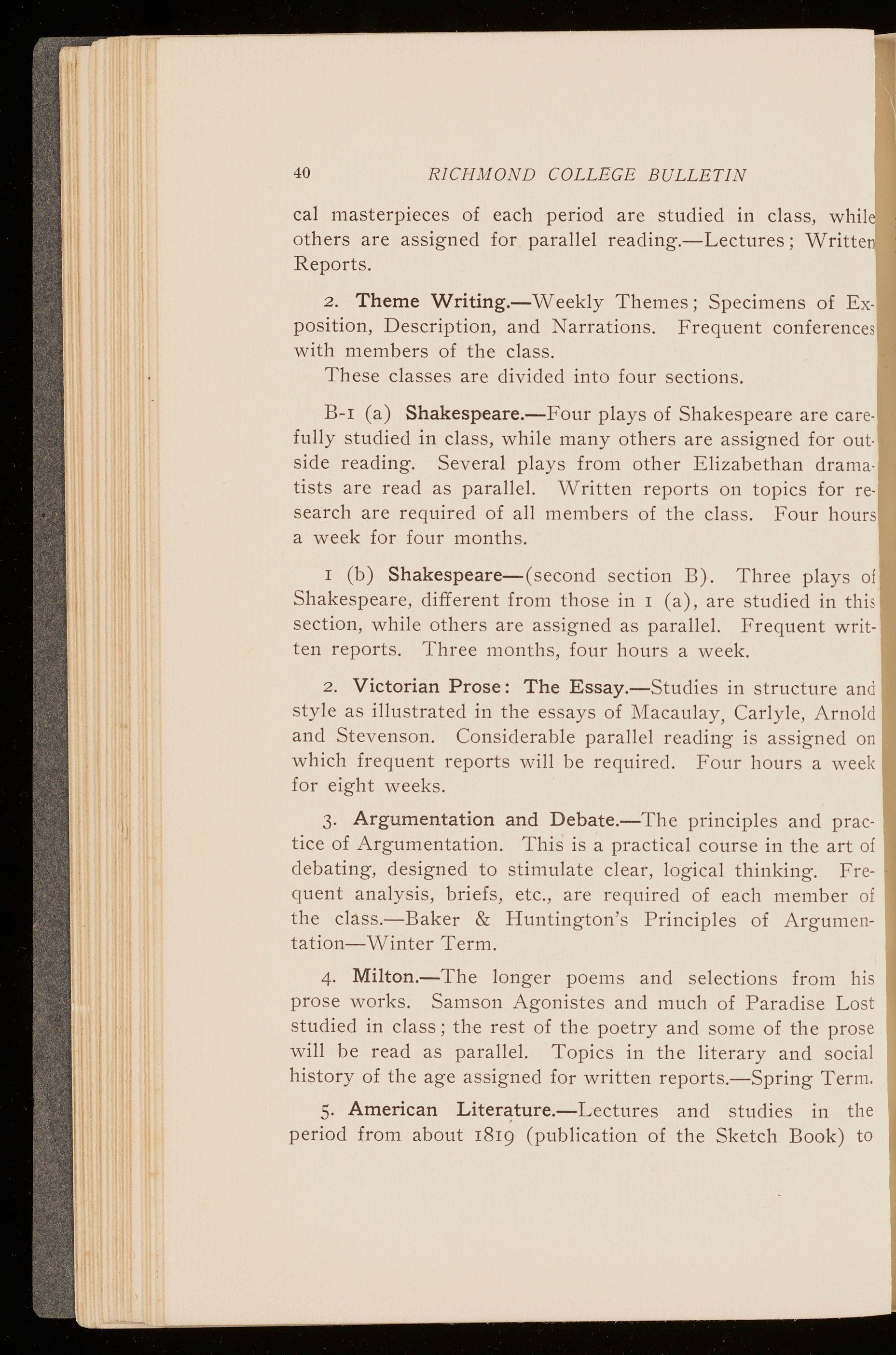
RICHMOND COLLEGE BULLETIN
cal masterpieces o f each period are studied in class , whil others are assigned for parallel reading.-Lectures; Written Reports.
2. Theme Writing.-W eekly Themes; Specimens of Exposition, De sc ription, and Na rrati o n s. Frequent confer ences wit h m embe rs of the class.
These classes are divided into four sectio n s .
B-1 (a) Shakespeare.- Fou r plays of Shakespeare are car efully st udied in cla ss, while many ot h ers are assigned for outs ide reading. Several plays from ot h er E li zabet h an dram atists are read as parallel. Written reports on topics for resea rch are required of all members of the class. Four hour s a week for four months.
1 (b) Shakespeare-( second sect io n B). T hr ee plays of Shakespeare, different from those in 1 (a), are stud i ed in thi s section, while ot h ers are assigned as parallel. Frequent written reports. Th r ee months, four hours a week.
2. Victorian Prose: The Essay.- Studies in structure and sty le as illustrated in the essays of l\Iacaulay, Carly le, Arnold and Stevenson. Co n side rabl e parallel reading is ass igned on which frequent reports will be required. Four hours a week for eight weeks.
3. Argumentation and Debate.- T he principles a nd practice of Argumentation. This is a practical course in the art of debat ing , designed to st imul ate clear, logical thinking. Frequent a n alysis, briefs, etc., are required of each member of the class.-Baker & Huntington's Principles of Argumentation-Winter Term.
4. Milton.-Th e longer poems a n d selections from his prose works Samson Agonistes and much of Paradise Lo st st udi ed in class; the r est of the poetry and some of the prose wi ll be r ead as parallel. Topics in the literary and social history of the age assigned for written reports.-Spring Term.
5. American Liter~ture.-L ectu res a nd stud ies in the period from about 1819 (pub lic ation of the Sketch Book) to
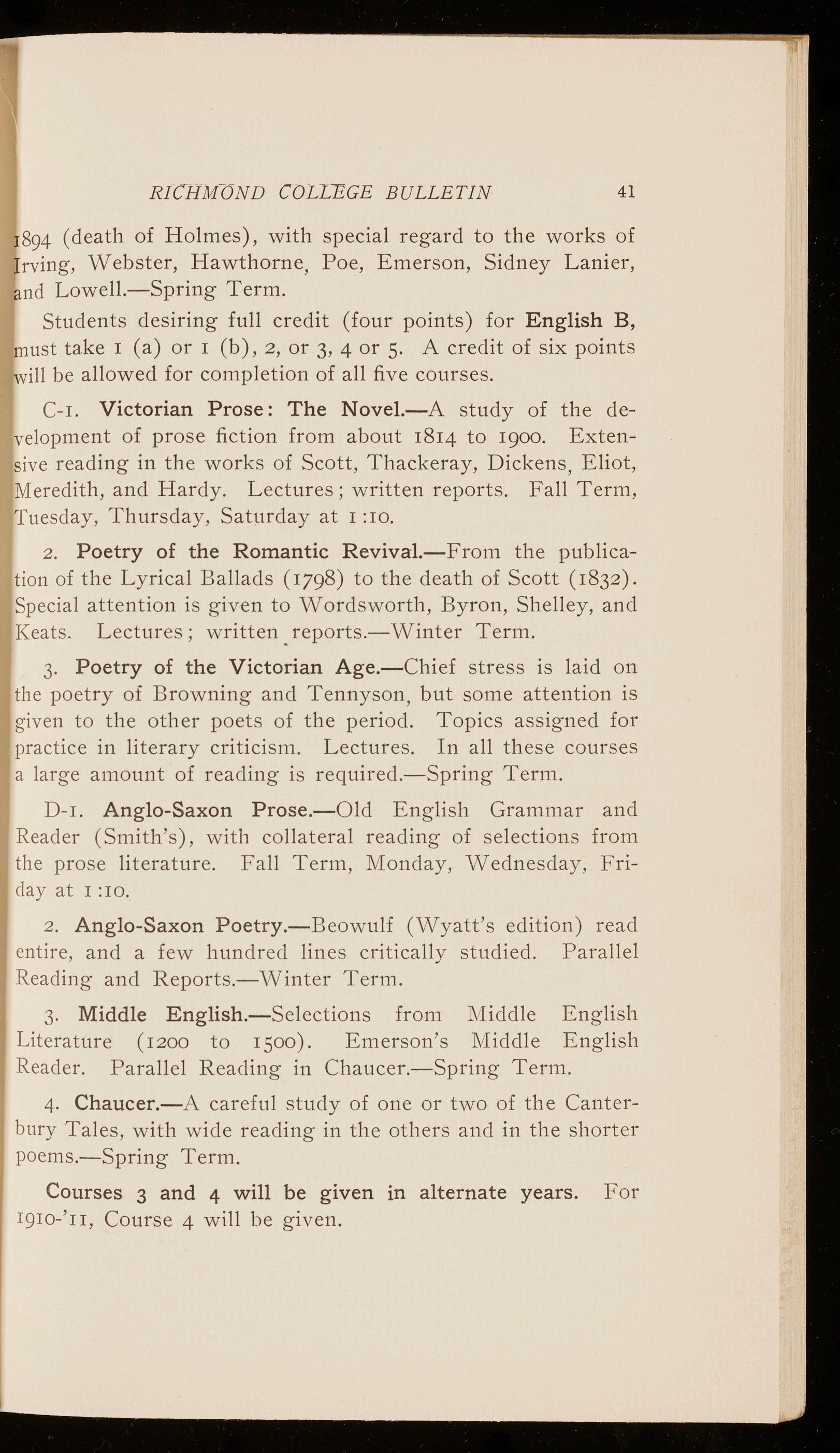
1894 (death of Holmes), with special regard to the works of Irving, Webster, Hawthorne, Poe, Emerson, Sidney Lanier, and Lowell.-Spring Term.
Students desiring full credit (four points) for English B, must take 1 (a) or 1 (b), 2, or 3, 4 or 5. A credit of six points will be allowed for completion of all five courses.
C-1. Victorian Prose: The Novel.-A study of the development of prose fiction from about 1814 to 1900. Extensive reading in the works of Scott, Thackeray, Dickens, Eliot, Meredith, and Hardy. Lectures; written reports. Fall Term, Tuesday, Thursday, Saturday at 1 :10.
2. Poetry of the Romantic Revival.-From the publication of the Lyrical Ballads (1798) to the death of Scott (1832). Special attention is given to Wordsworth, Byron, Shelley, and Keats. Lectures; written . reports.-Winter Term.
3. Poetry of the Victorian Age.-Chief stress is laid on the poetry of Browning and Tennyson, but some attention is given to the other poets of the period. Topics assig·ned for practice in literary criticism. Lectures. In all these courses a large amount of reading is required.-Spring Term.
D-1. Anglo-Saxon Prose.-Old English Grammar and Reader (Smith's), with collateral reading of selections from the prose literatur e. Fall Term, Monday, Wednesday, Friday at 1 :10.
2. Anglo-Saxon Poetry.-Beowulf (Wyatt's edition) read entire, and a few hundr ed lines critically studied. Parallel Reading and Reports.-Winter Term.
3. Middle English.-Selections from Middle English Literature (1200 to 1500). Emerson's Middle English Reader. Parallel Reading in Chaucer.-Spring Term.
4. Chaucer.-A careful study of one or two of the Canterbury Tales, with wide reading in the others and in the shorter poems. -Spring Term.
Courses 3 and 4 will be given in alternate years. For 1910-'u, Course 4 will be given.
-!2
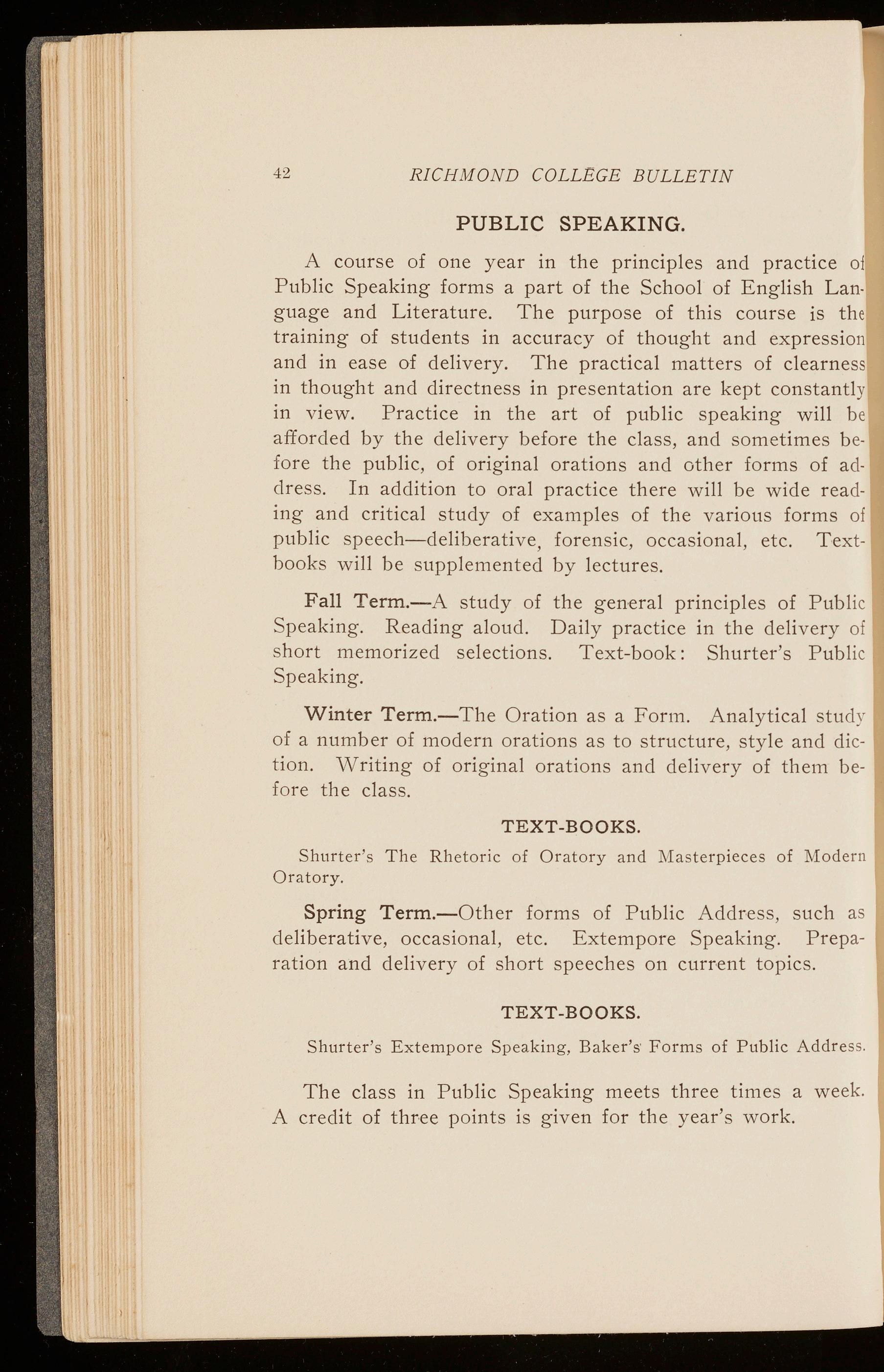
RICHMOND COLLEGE BULLETIN
PUBLIC SPEAKING .
A course of one year in the princip les a n d pract i ce of Public Speak ing forms a part of t h e School of E n g li sh Language and Literature. The purpose of this course is the training of students in accuracy of t h ought and expression and in ease of de livery. The practica l matters of clearness in tho ught and directness i n presentation are kept constantl y in v iew. Practice in the art of public speaking will b e afforded by the delivery before the class, and sometimes b efore the public, of original orations and other forms of address. In addition to ora l practice there will be wide reading and critical study of examples of the various forms of public speech-deliberative, forensic, occasional, etc. Textbooks will be supplemented by lectures .
F all Term .- A study of the general principles of Publi c Speaking. Reading aloud. Daily practice in the delivery of short memorized selections . Text-book: Shurter's Publi c Speaking.
Wint e r T e rm .-The Oration as a Form. Analytical stud y of a number of modern orations as to structure, style and di ction ,Vriting of original orations and delivery of them before the class.
T E XT -BOOKS .
Shurter's The Rhetoric of Oratory and J\Ia sterpieces of Mod ern Oratory.
Spring Term . - Other forms of Public Address, such as deliberative, occas ional, etc. Extempore Speaking. Preparation and delivery of short speeches on current topics.
T EX T
-BOOKS.
Shurter ' s Extempore Speaking, Baker's · Forms of Public Addre ss.
The class in Pub lic Speaking meets three times a week. A credit of thr -ee points is given for the year's work.

RICHMOND COLLEGE Bf..'l~LETIN
SCHOOL OF MATHEMATICS
PROFESSOR GAINES
Th e aim of the course of study in this department is to increase the student's power of independent, honest inquiry, and to cultivate in him the habit of stating with exactness and clearness his convictions, and of giving logically his reasons for them. Throughout the entire course, and particularly in the earlier part of it, the subjects ar ,e taught chiefly with reference to the importance and value as a means of general education. The needs of the many rather than of the few are kept constantly in mind. At the same time a student who takes the entire course with a view of specia lizing in mathe matics will find that the course is sufficiently extensive and that it is presented in such a way as to rev •eal to him somet hing of the power and elegance of the science and the magni tude of the field that lies out before him, and to give him sufficient mastery of the subjects taught and particularly of ma thematical methods as will enable him to enter with profit upon graduate studies in mathematics.
The following outline will give a fair idea of the courses offered : As preparation for the first class one should have completed (r) Elementary A lgebra to Quadratic Equations (in a book of the grade of Wentworth's Elementary Algebra, or Ha ll and Knight's Elementary Algebra), and (2) Plane Geometry as given in any of the standard American texts.
Course A.-(a) Solid Geometry three times a week, Fall Term; (b) Plane Trigonometry three times a week, Winter and Spring Terms; ( c) Advanced Algebra twice a week thr oug hout the year.
TEXT-BOOKS.
We ntworth 's Solid Geometry, Murray's Plain Trigonometry, Hawk's Advanced Algebra.
Course B.-(a) Analytical Geometry, three times a week for half -year; (b) Differential and Integral Calculus, three a wee k for second half-year; ( c) Theory of Equations and other special topics in Advanced Algebra once a week throughout the year.

R!Cf-JJ10ND COLLEGE BULLETIN
TEXT-BOOKS.
T anner and Allen 's Analytical Geometry. :sfurray's Differential and Integral Calculu,. Fine' s College 1\lgebra.
Course C.- (a) Analytical Geometry, advanced course, three times a week for first half-year; (b) Differential and Integral Calculus, advanced cour e, three time a ,,·eek for second half-year.
Course D.- (a) Infinite Series and Products, three times a week for first half-year; (b) DifTcrcntial Equation-;, three times a week for econcl half-year.
[Course C and D will be given in alternate years.]
The subject of Land un e) ing is taught in an additiunal class, beginning in January and meeting twice a week. This class is open to students \\'ho have completed · ursc \.
SCHOOL O F PHYSICS
The instructi o n in thi-, department i-; based upun the belief that the subject matter of Physics shuulcl rcceiY C som e con ideration in the ollege education of ,,·c ry student. and that the method by \\'hich this important body lli truth ha-; been obtained will remain with him throughout life as a patern of independent, clear and correct thinking-,
The method of teaching in each course is by lccturc-, and recitations, based upon assigned portion::; of a text-book . Thc leading topic di cu eel arc furth r c111phasizccl by lccturl' experiments and by the olution of numerical problem--. chosen u ually from the text. Thi-; class instruction i::; accompanied by full and ystcmatic courscs of indi, idual lalioratory experiment . The entire cconrl flllor of .·cicnce Tia! ! is devoted to work in Physics; th lecture room and lahm atory rooms are upplied with both direct and alternatin~· electrical currents, and the laboratory equipment. already good. is being improYecl by liberal annual appropriation--.

COLLEGE BULLETIN
Cours e A- Elementary General Phy ics . This course coYers in an elementary way the fundamental principles of Physics, including 1Iechanics, Properties of Matter, Heat, ,ound, Light, Electricity and 1Iagnetism, and it is offered for the benefit (1) of tho e who wish to acquire ome knowledge of the simpler phenomena of Physics a a part of a liberal ducation and (2) of tho e who may take up the study of medicine or some r lated . cience. For aclmis ion to thi class the tu<l nt must liaye a knowledge of Algebra and Ceometry, equi, a lent to th neces. ary preparation for :\Iathematics \.
Three lectures a week. two laboratory periods of two hour-; ach.
TEXT-B OO KS.
Class Work.-:dillikan and Gale's Fir,t Cour,e 111 Physic has 1 c(n u. tel for thl· pa--.t two ~essions. The text for 1910-'rr will be announced in eptembcr.
Laboratory Work. -The Profe..,,or•,, Laboratory :.Ianual with the manual of \ml'" ancl TI!i,s. and Blaker ancl Fisher, as reference h< r,k-..
Course B.- . \ ch ancecl Phy-;ics. :\Iechanic , Heal, ound, Light. Thi.., cla. s is aclaptecl to the needs (1) of tho e who wish to ext nrl their knowledge of ph) sics as a part of a general education: (2) of tlrn-;c who propo. elater to .pec ialize in some branch of Eng-ineering; (3 of those who wish to fit thcmsch es for the teaching of Physic. in econdary chools . luch str s i laid on the quantitatiYe relation , and hence, in the lecture . ancl in th laboratory as well, free u e i made oi the . tuclcnb· mathematical attainments in the cleriYation ancl cliscu. sion of phy ical laws a. expressed in mathematical formulae: the graphical r pr sentation of experimental data \\'ill al o be emphasized. The completion of the .\ Cour,e in Physic.· and :\l athematics is required f r admi - ion to thi cla-;s_
Three lecture a week and two laboratory periods of two hours each. This cour-; was gi,·en in 1909-10.
46
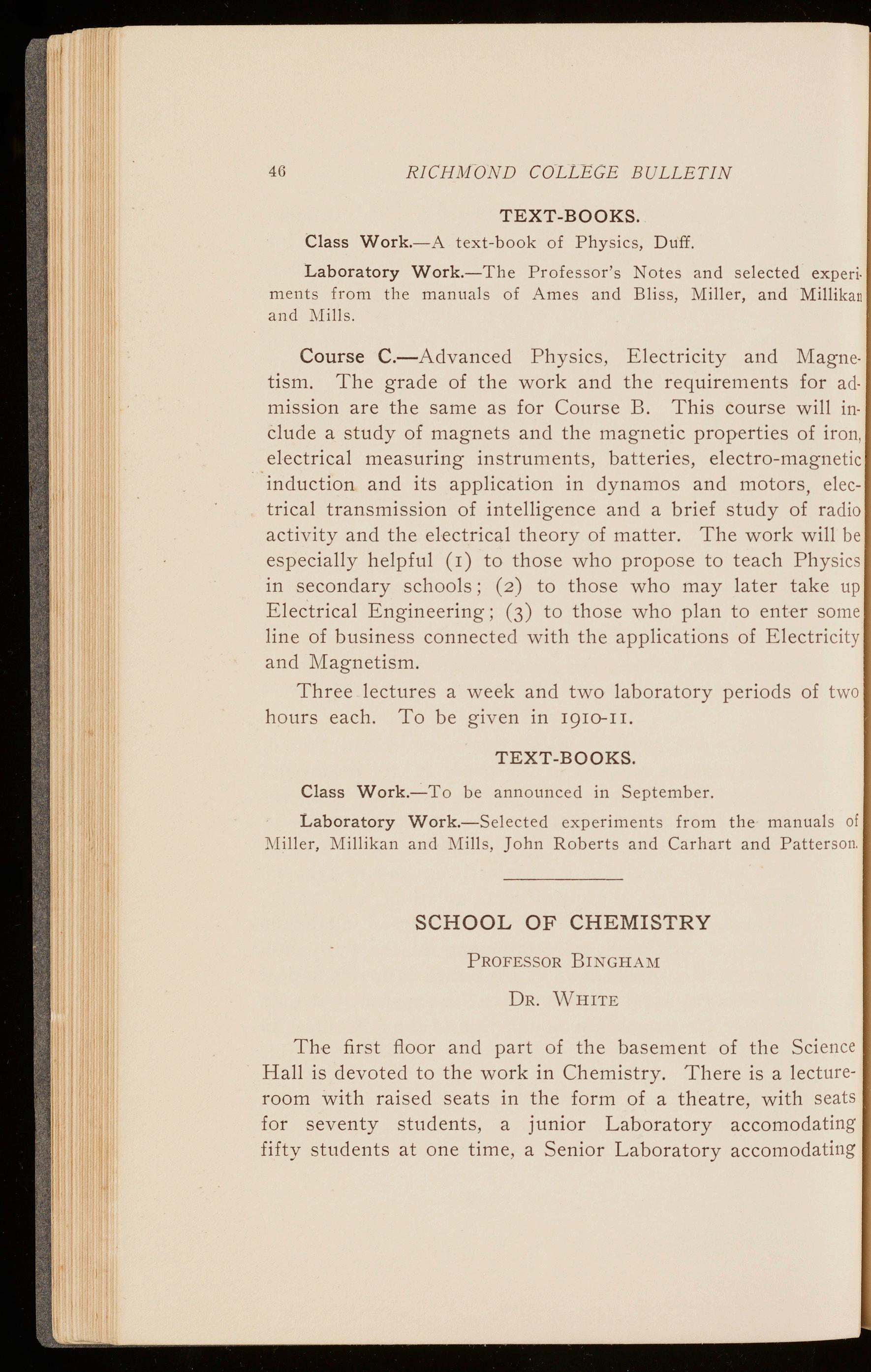
RICHMOND COLLEGE BULLETIN
TEXT-BOOKS.
Class Work.-A text-book of Physics, Duff.
Laboratory Work.-The Professor's Notes and selected experiments from the manuals of Ames and Bliss, Miller, and Millik an and ?.Tills.
Course C.-Advanced Physics , Electricity and Magn etism. The grade of the work and the requirements for admission are the same as for Course B. This course will include a study of magnets and the magnetic properties of iron , electrical measuring instruments, batteries, electro-magne ti c induction and its application in dynamos and motors, electrical transmission of intelligence and a brief study of ra dio activity and the electrical theory of matter. The work will be especially helpful (1) to those who propose to teach Phy sics in secondary schools; (2) to those who may later take up Electrical Engineering; (3) to those who plan to enter some line of business connected with the applications of Electricity and Magnetism.
Three lectures a week and two laboratory periods of two hours each. To be given in 1910-11.
TEXT-BOOKS.
Class Work.- To be announced in September .
Laboratory Work.-Select ed expe riment s from the manual s of i\Iiller, Millikan and Mills, John Roberts and Carhart and Patt erson.
SCHOOL OF CHEMISTRY
PROFE SSOR BINGH AM
The first floor and part of the basement of the Sci ence Hall is devoted to the work in Chemistry. There is a lect ureroom with raised seats in the form of a theatre, with seats for seventy students, a junior Laboratory accomodating fifty students at one time, a Senior Laboratory accomodating
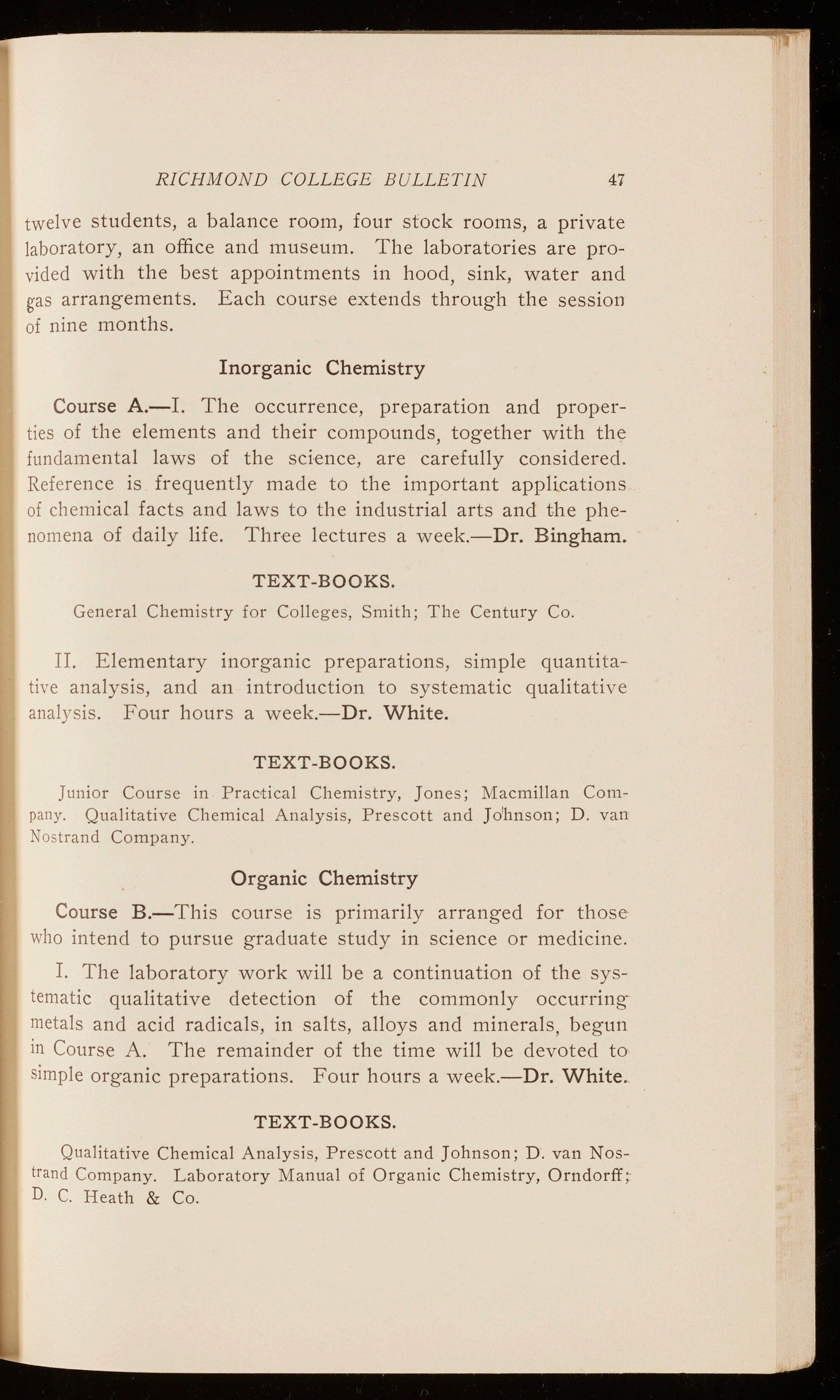
RICHMOND COLLEGE BULLETIN
twelve students, a balance room, four stock rooms, a private laboratory, an office and museum. The laboratories are provided with the best appointments in hood, sink, water and gas arrangements. Each course extends through the session of nine months.
Inorganic Chemistry
Course A.-I. The occurrence, preparation and properties of the elements and their compounds, together with the fundamenta l laws of the science, are carefully considered. Reference is frequently made to the important applications of chem ical facts and laws to the industrial arts and the phenomena of daily life. Thr-ee lectures a week.-Dr. Bingham.
TEXT-BOOKS.
General Chemistry for Colleges, Smith; The Century Co.
II. E lementary inorganic preparations, simple quantitative analysis, and an introduction to systematic qualitative analysis . Four hours a week.-Dr. White.
TEXT-BOOKS.
Jun ior Course in Practical Chemistry, Jon es; Macmillan Company. Qualitative Chem ical Analysis, Prescott and J o'hn son; D. van Nostrand Company.
Organic Chemistry
Course B.-This course is primarily arranged for those who intend to pursue graduate study in science or medicine.
I. The laboratory work will be a continuation of the systematic qualitative detection of the commonly occurring metals and acid radicals, in salts, alloys and minerals , begun in Course A. The remainder of the time will be devoted to simple organ ic preparations. Four hours a week.-Dr. White.
TEXT-BOOKS.
Qualitative Chemical Analysis, Pres ·cott and Johnson; D. van Nostrand Compa ny. Laboratory Manual of Organic Chemistry, Orndorff ~ D. C. Heath & Co.

RICHMOND COLLEGE BULLETIN
II. Lectur es and quizzes up on the fundamental principles of Organic Chemi stry Three h ours a week. Given in 1910191r.-Dr. White.
TEXT-BOOK.
Organic Chemistry, Remsen; D. C. Hea •th & Co.
Quantitative Analysis
Course C.- This course will contain work necessary in the tra ini ng of the technical chemist, and is open to those wh o have completed Course A.
I. The laboratory work begun in Course A wi ll be continued precisely as in Course B. The remainder of the time wi ll be devoted to quantitative ana lysis of various salts metals, ores and commercial o r natural products. The allotment of work wi ll be made to su it the needs of the individual student. Seven hours a week. Given in 1909-1910.-Dr. Bingham.
TEXT-BOOK.
Quantitative Chemical Ana l ysis , Talbot; The Macmillan Co.
II. One hour a week wi ll be devoted to a discussion of analytical methods, the working out of problems, the balancing of equations, and a brief study of industrial chemistry. Visits will be made to industrial plants in the vicinity. Given in 1909-1910.-Dr. Bingham.
TEXT-BOOK.
Outlines of Industrial Chemistry, Thorp; Macmillan Co.
Geology
Course D.- By the study of the dynamic agencies now operating, by the structure of the rocks and the fossils contained in them, it wi ll be shown how the past history of the earth is being revealed. Two hours a week. Given in 1909r9ro.-Dr. Bingham.
TEXT-BOOK.
Elements of Geology, Le Conte; App l eton & Co.

Theoretical Chemistry
Course E.-Two hours a week will be devoted to lectures and qu izz es upon the elementary principles of physical chemistry. Given in r9ro-r9r r. This course is open to those who haYe com pleted Course A.- Dr. Bingham.
TEXT-BOOK.
Introd uction to Physical Chemi •try, W a lk er; The Macmillan Co.
SCHOOL OF PHILOSOPHY
ACTING PROFESSOR L EWIS
The pu rp ose of the School of Philosophy is t o supply an introduct ion to philosophical learning, and to awaken in the minds of s tud ents s uch a degr ee of interest as - may induce them to undertake mor e advanced s tudy. The discipline s are divided into four courses, as follows:
Course A- Psychology and Ethics. Attention is given to animal psychology, as the same may be related to human psychology. The psychology of the child i s also studied for the purpose of setting forth the development of mental life in infancy and adolescence. Adult psychology receives more attention t han any other portion of the subject. The science of experime ntal psychology is likewise taught, and frequent written exe rcise s are required.
Ethics is studied in the latter portion of the session, with special attent ion to the different theories regarding the moral standard, and t o questions of moral life, both in its individual and social aspects.
TEXT-BOOKS .
Ange ll , Psychology; Kirkp atr ic k , Fundamentals of Child Study; Witmer, Ana lyt ic a l Psychology; MacKenzie, Manual of Ethics.
Cou,rse B.-Logic and the History of Philosophy. In this course Logic is first treated, and consideration is given to all the parts of logical doctrine. Special attention is bestowed

RICHMOND COLLEGb BULLETIN
upon the syllogism, with its various moods and figures. The doctrine of reduction is taught with care, as also that of conditional arguments, fallacies and induction.
The History of Philosophy occupies the closing portion of the session. The course begins with the origin of philosophy among the Greeks, and follows its development down to our own times. The rise of the various theories and their relations one to another, are pointed out, as also the relation of philosophy to life and the influence of philosophical theorie s upon the progress of history.
TEXT-BOOKS.
Roger's Student's History of Philosophy; Bakewell's Source-Book m Ancient Philosophy; Creighton's Introductory Logic.
Course C.-Political Economy and Sociology. Political Economy is studied first in this course, and the leading doctrines are carefully considered. Afterwards a number of problems in connection with economic questions and conditions in the United States are discussed.
In the second half of the session the class takes up the Science of Sociology and makes a review of its leading principles.
TEXT-BOOKS.
Seager, Introduction to Economics; Gidding's Elemen •ts of Sociology.
THE HISTORY AND PRINCIPLES OF EDUCATION
Course D.-The aim of this course is to ascertain the con· tributions which different civilizations have made to educa· tional theory, and at the same time, to find the bearing of such theory upon the solution of the practical problems of Education as we have them to-day. The study of the ideals and problems of other times results naturally in an enlargement of our own ideals and a better appreciation of the problems of the present times.
TEXT-BOOKS.
Monroe's History and Principles of Education; Ruediger's The Principles of Education.

RICHMOND COLLEGE BULLETIN
SCHOOL OF HISTORY AND POLITICAL SCIENCE
PROFESSOR
ANDERSON
History is taught both for the inherent value and interest of the facts learned in its study and for the menta l training of a certain kind that may be thereby acquired. This learning of the essential facts of history is necessary both for the man of affairs and for the man of culture. But mere reading and assimilation of details are subordinated to ends of a vital nature-the training of the mind in broad qualities of tolerance and discrimination, the development of the power to glean truth from many and conflicting sources and to arrange and state clearly results obtained; the creation of an intelligent interest in the facts of life around us, for whose genuine appreciation a knowledge of history is indispensable.
The method pursued in all courses in this department will be such flexible interchange of lecture, recitation and special report as will interest and draw out the student. Parallel reading and essays are required in each year.
The course in history will cover three years.
Course A-Beginning with a rapid survey of Roman History as a foundation, a systematic study of Mediceval and Modern History will be made. The unity of history will be emphasized, the development of institutions will be followed as much as possible, and an effort will be made to show the debt of modern society to preceding ages.
This course is required as a pre-requisite for entrance into any other course in History or Political Science.
Course B.-This course will consist of a careful review of English Political History; it will assume a knowledge of the elementary facts and will be of a somewhat advanced character.
American History from 1750 to the present will then be taken up. From time to time also special top i cs in Virginia History will be discussed.
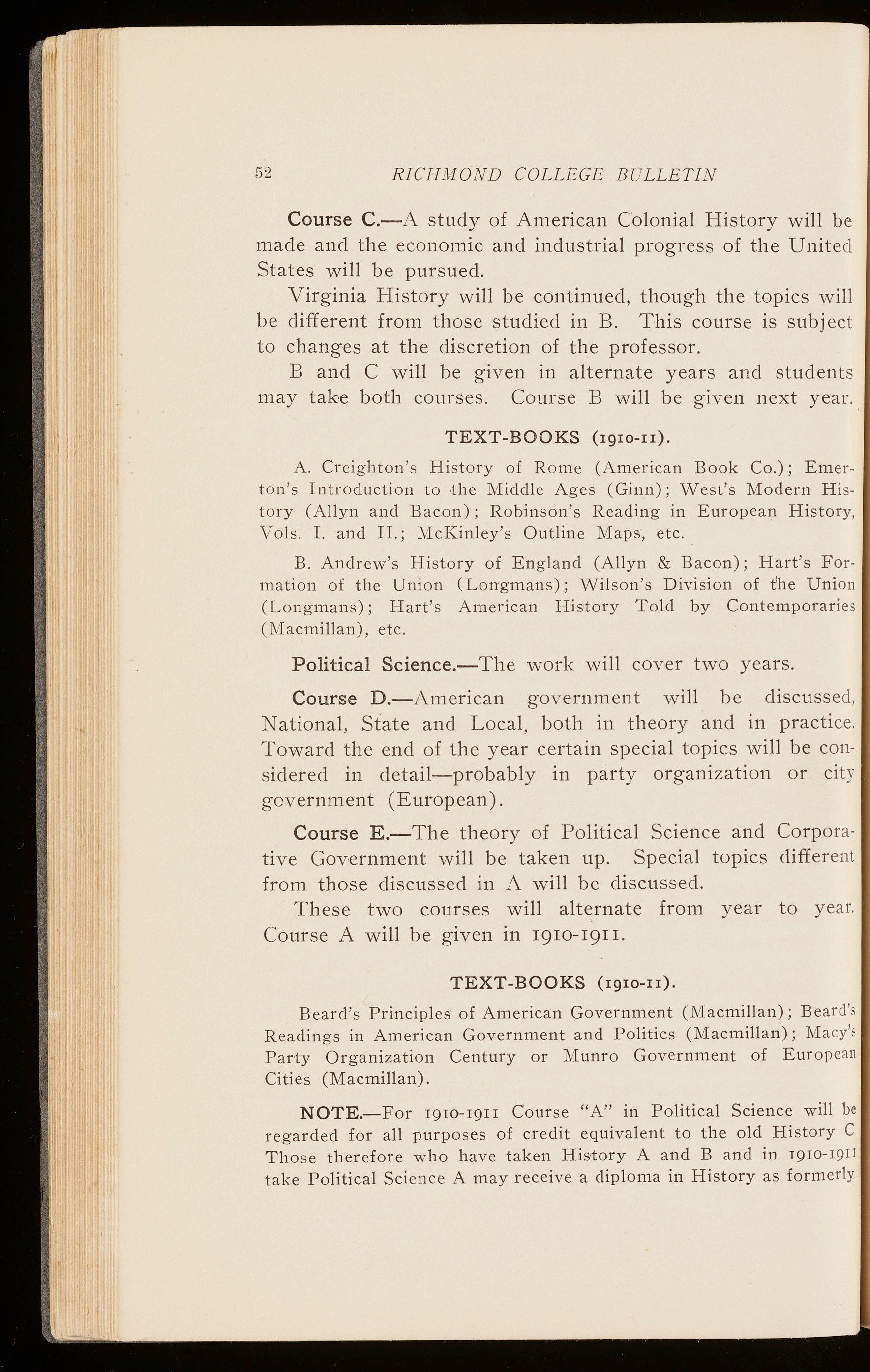
RICHMOND COLLEGE BULLETIN
Course C.-A study of American Colonial History will be made and the economic and industrial progress of the United States will be pursued.
Virginia History will be continued, though the topics will be different from those studied in B. This course is subject to changes at the discretion of the professor.
B and C will be given in alternate years and students may take both courses. Course B will be given next year.
TEXT-BOOKS
(1910-II).
A. Creighton ' s Hi s tory of Rome (American Book Co.); Emerton's Introduction to •the Middle Ages (Ginn); West's Modern Hi story (Allyn and Bacon); Robinson's Reading in European History , Vols. I. and II.; i\IcKinley's Outline l\faps, etc.
B. Andrew's History of England (Allyn & Bacon); Hart's Formation of the Union (Lorrgmans); Wilson's Division of t'he Unio n (Longmans); Hart' s American His •tory Told by Contemporari es (:\Iacmi!lan), etc.
Political Science.-The work will cover two years.
Course D.-American government will be discusse d, National, State and Local, both in theory and in practic e. Toward the end of the year certain special topics will be considered in detail-probably in party organization or cit y government (European).
Course E.-The theory of Political Science and Corpo rative Government will be taken up. Special topics differen t from those discussed in A will be discussed.
These two courses will alternate from year to ye ar. Course A will be given in r910-r9rr.
TEXT-BOOKS (1910 -II).
Beard ' s Principles · of American Government (Macmillan); Beard 's Readings in American Government and Politics (Macmillan); Ma cy'; Party Organization Century or Munro Government of Europe an Ci ties (Macmillan).
NOTE.-For 1910-1911
Course "A" in Political Science will be regarded for all purposes of credit equivalent to the old History C. Those therefore who have taken His•tory A and B and in 1910-1 9 11 take Political Science A may receive a diploma in History as formerl y.

BIOLOGY
DR BAGGARLY
The Biological Department occupies rooms in Science Hall, and is equipped with all modern conveniences. The laboratory is larg e, well heated and well ventilated. Since it is situated on the third floor, and has large windows facing th e north, it could not be better lighted for microscopical work. The course offered in 1910-r r wi ll be general Biology, and instruction will be given by (a) Lectures and Texts and by ( b) Laboratory v\Tork.
( a) Lectures.-Three hours a week during the schoo l yea r. The purpose of the lectures is to give the student a knowledge of the principles underlying the structure and phy siology of living things by a study of the characteristics of liv ing matter and a comparison of one type with another. Growth, development and reproduction and comparative anat omy will be especially noted. The course will embrace a comparative study of living things-animal and vegetableand will begin with the simple microscopic organisms, as yeast plant and amoeba, and from these the student will be led to cons ider successively higher types chosen from the animal and v egetable kingdoms and typical mammal. Each student will be required to prepare an essay on some biological subject which will be pr -esented and discussed before the class.
( b) Laboratory Work.-Four hours a week will be required throughout the year. Each student will be assigned a t able on which a microscope, reagents, instruments and all apparatus necessary for biological work. Typical forms of life are studied, and the order will be from the simpler to more comp le x organisms. The principles of the microscope, the hand lin g, staining, mounting and sketching of specimens, and a comparison of one form with another, are the chief feat ures of the work. In Botany special attention will be paid to methods of collecting, preserving and classifying specimens.
F o ur weeks will be devoted to the dissection of the clog

and the principles of Physiology studied in the text-book w ill be fully illustrated, also the normal tissues will be prepar ed for microscopic work. Each student will be required t o grow a number of non-pathogenic bacteria in the laborator y, and their growth, development and their vital manifestation s will be thoroughly studied .
TEXT-BOOKS.
General Biology (Sedg w ick & Wil s on) , Human Bod y (M a rt in), Lessons and Manual of Botany (Gray) ; Micro s c o py a nd Bacteriol ogy (Archinard); dissection of the Dog (Howell).
ASTRONOMY
PROF ESSO R 'vVI NST ON
Astronomy, th e oldest and the noblest of the sci e nce s, h as long been included in the curriculum of Richmond Coll ege For many years it was a part of th e cour s e in Physic s, bu t recently it has been made an independent class. The cour se is brief and elementary , but general and comprehensi v e. It includes a detailed study , and as far as possible, a practi cal and experimental study of the various clas s es of the hea ven ly bodies, with special attention to those of our own Solar Syst em. It seeks not only to give a summary of the accepted fact s of Astronomy, but to set forth clearly the scientific proce sses by which these facts have been established. Due refer en ce is made also to recent advances in our knowledge, clue to th e improved instruments and methods of the present day.
In a word, the primary aim of the course is to give such a knowledge of the facts, principles and methods of Astronom y as every well-educated person should possess.
Students entering this class should have some fair a cquaintances with the elements of Mathematics and of Ph ysics. One lecture a week throughout the session will be giv en , with some written exercises and some observational and laboratory work.
TEXT-BOOKS.
Y oung s Les so ns in Astronomy , with ot 'hers for reference.

DRAWING AND DESIGN
MR BROWN
Course A-Freehand Drawing
A course of four hours a week throughout the year. Its object is to develop the powers of imagination, judgment and taste in directions called for in engineering and natural sciences. The session's work will consist largely of drawing letters, object drawing and application of lettering , suc h as dimensions, titles, and the making of working sketches. The studen ts also sketch mechanical subjects, such as details of machinery, apparatus, natural history specimens, etc. The course includes study from the ca s t of ornament and of the human figure.
Course B-Freehand Drawing
This course is offered to students who have completed Cours-e A in Freehand. It is intended for those who are interested in charcoal and crayon drawings, and who wish to learn to illustrate. Much stress is laid on light and shade drawing . Two periods of two hours each are required throug h o ut the session.
Course C-Mechanical Drawing
For a student to enter this class , he must have completed the "Co urse A" Freehand Drawing, or its equivalent. This course consists of drawing-room exercises from three to four hours a week for the second year, and includes introductory work in descriptive geometry, with applications, drawing instrume nts and their uses, geometrical construction, mechanical drawing from objects, lettering and dimensioning. Faunce's text -book is employed.
The instruction also includes drawing of simple machine ~etails, s crews, pipe fittings , valves, etc. Problems in belting, design of cams and quick return motions will be introduce d.

RICH.vJOND
COLLEGE BULLETIN
Course D-Mechanical Drawing
In order to take this course, the student must have completed Courses A and C in Drawing. The course consists of drawing-room exercises from four to six hours per week, it s aim being to teach the proper way of making necessary dimensional drawings for use in practice, good shop system s being employed. The instruction includes the making of working detail and assembly drawings of machinery from measurements. Students in this department furnish thei r own drawing materials.
ENGLISH BIBLE
PROFESSORS G ,\I N ES AN D H .\RRI S
The aim is to acquaint students as thoroughly as is pra cticable with the Scriptures as the inspired Word of God. Th e history, geography and literature of the Bible, with necessar y exegesis, serve to throw light upon the sacred text and t o discover the divine mind and spirit in this revelation. Intell igent knowledge, by systematic effort, of the Maker an d Ruler of all, is essential to complete education, gives uni ty to the different departments of human learning, and is clue t o Him "who lighteth every man that cometh into the world ." The courses are adapted to students of all grades, with n o reference to any particular profession in v iew. They are fr ee to all matriculates of the College. There will be thr ee courses of study-one in the Gospels, one in the Acts an d Epistles, and one in "Old Testament Characters." Th ese courses will be conducted by Professors Gaines and Harr is Each class will recite once a week at an hour to be announced at the organization of the class. A credit of one point will be allowed on each of the three courses, provid ed, however, that no student shall be credited in any year wi th more than one point. It is further provided that a credit on Bible work shall not be included in the fifteen required point s of the English-philosophical group.

PHYSICAL CULTURE
)IR. GILLI ,\11
Carefully arranged courses in Physical Culture are offered free of cost to every matriculate of the College. Two classes ar e given daily exercises in the gymnasium, and are instructed in the principles of hygiene. All students are urged to jo in one of the classes. Each student, on entering a class, is g iven a physical examination, in order that any lack of de, elopment may be noted and the proper exercise prescribed. At t he close of the session's work the measurements are again take n, and, on the basis of attendance and physical improve- ment combined, certificates are awarded.
Ho t and cold baths are provided in rooms adjoining the gym nasium, which are kept open, without charge, six days in the w eek. In the dressing-room are lockers, which may be rente d by students at fifty cent each. The spacious campus affor ds ample opportunity for recreati v e exercise. Grounds are laid out for foot-ball, base-ball, basket-ball, track athletics and tennis. The College recognizes the intelligent care of t h e body as essential to intellectual power, and encourages eyery beneficent form of physical exercise.
THE THOMAS L ECTU RES
T hese Lectures are provided for by "The Thomas :Museum Lecture Endowment" of $r r,ooo, donated by his family in memory of the late President of the corporation, James Th omas , Jr. They are delivered annually by eminent men of our own and foreign countries on Science, Philosophy, Art or Lite rature, and by special provision are open to the public without charge. The following distinguished scholars have delig hted large audiences and greatly stimulated literary and ~cientific research :
Charles A. Young, Ph.D., of Princeton; H. Newell Mar-

RICHMOND COLLEGE BULLETIN
tin, Ph.D., of Johns Hopkins University; W. T. Harris, LL. D., United States Commissioner of Education; President D. C. Gilman, of Johns Hopkins University; Robert Y. Tyrrell, University of Dublin, fr.eland; Horace H. Furness, Ph.D., LL.D., of Philadelphia; Professor C. T. Winchester, A.M., of Wesleyan University; Albion W. Small, Ph.D., of Chicago University; G. Stanley Hall, Ph.D., LLD., President of Clark University; James Henry Breasted, Ph.D., of Chicago University; President Woodrow "'Nilson, Ph.D., LLD., of Princeton University; President Benjamin Ide '\i\Theeler, Ph. D., LL.D., of the University of California; Hamilton Wright Mabie, LL.D., of New York; Sir Robert Ball, of Oxford ; Henry Van Dyke, LLD., of Princeton; Mr. Lorado Taft, of Chicago; Professor Ario Bates, of the Massachusetts Institute of Technology; Professor John B. Clarke, LL.D., of Columbia University; Professor Josiah Royce, LL.D., of Harvard University; Professor W. P. Trent, Ph.D., of Columbia University; Professor B. L Gildersleeve, Ph.D., LL.D., of the Johns Hopkins University; Mr. Walter H. Page, editor of the "'\i\Toriel's Work;" Professor H. Morse Stephens, LL.D., of the University of California; Dr. Bli ss Perry, editor of "The Atlantic Monthly;" Professor Francis W. Kelsey, President of the Archaelogical Institute of America; Dr. J. Howard Gore, of Washington, and Professor Edouard Meyer, of the University of Berlin. Two courses of lectures will be given on the Thomas Foundation in 1910-n

RICHMOND COLLEGE BULLETIN
~rbool of JLaw.
W. S. McNEILL, Ph.D., LL.B., Professor of Law.
ASSOCIATE PROFESSORS
E. M. LONG, LL.B.
C. B. GARNETT, M.A., LL.B.
JOHN RANDOLPH TUCKER, LL.B.
The Law School, established in 1870, and continued with slight interruption till 1882, was in 1890 firmly re-established. The lo cation is eminently suited for combining practical with theor et ical instruction , by reason of easy access to the numerous Co urt s-Federals, State, Municipal- held in the city of Richmo nd , and the large and well-selected librari ,es-law and misce llaneous-of the State and of the Coll ege.
The aim of the school is to ground the student thoroughly in the fundamental principles of Anglo-American Law, and, at the same time, to train the mind in correct methods of legal r easoning. To these ends , all approved methods of instruc tion are in use. Each teacher has the privilege of following the bent of his own personality, so that some courses are g iv en wholly by lectures, others through a critical analysis of well-selected text-books, while, in still others, the case system is used throughout.
T hrough the first method the student acquires the ability to follow and make notes on a discussion complete in itself. It is of first-rate importance for the practicing· lawyer to be apt analyzing a legal exposition while it is being delivered.
* A special law catalogue is issued in August. Copies will be mailed up on request.
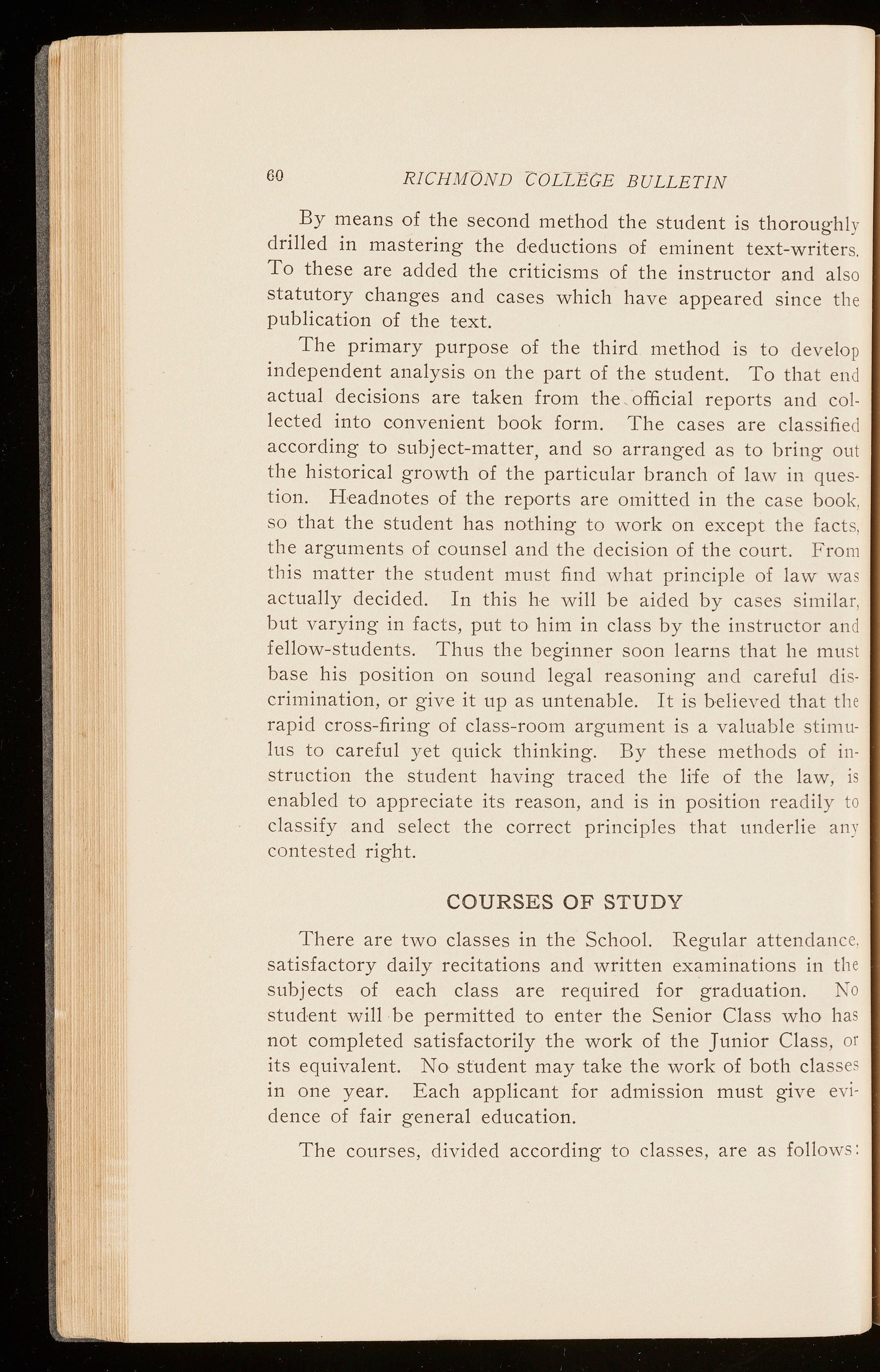
RICHMOND COL°LEGE BULLETIN
By means of the second method the student is thoroughly drilled in mastering the deductions of eminent text-writers. To these are added the criticisms of the instructor and als o statutory changes and cases which have appeared sinc e the publication of the text.
The primary purpose of the third method is to d evelop independent analysis on the part of the student. To that en d actual decisions are taken from the official reports and collected into convenient book form. The cases are classifie d according to subject-matter, and so arranged as to bring ou t the historical growth of the particular branch of law in que stion. Headnotes of the reports are omitted in the case book. s o that the student has nothing to work on except the fact s, the arguments of counsel and the decision of the court. F rom this matter the student must find what principle of law wa s actually decided. In this he will be aided by ca s es similar , but varying in facts, put to him in class by the instruct o r an d fellow-students. Thus the beginner soon learns that he mu st base his position on sound legal reasoning and careful di scrimination, or give it up as untenable. It is believed that th e rapid cross-firing of class-room argument is a valuable s tim ulus to careful yet quick thinking. By these methods o f instruction the student having traced the life of the law, is enabled to appr eciate its reason, and is in position readil y to classify and select the correct principles that underli e a ny conte s ted right.
COURSES OF STUDY
There are two classes in the School. Regular attend a n ce. satisfactory daily recitations and written examinations in t he subjects of each class are required for graduation. Ko student will be permitted to enter the Senior Class who h as not completed satisfactorily the work of the Junior Clas s , or its equivalent. No student may take the work of both clas ses in one year. Each applicant for admission must give evidence of fair general education.
The courses, divided according to classes, are as follow s:
RICHMOND COLLEGE BULLETIN
Junior Class. Senior Class.
r. Pe r s ona l Property, including \iVills and Ad~ ini stration , Bailme nt s· and Carriers.
2 Do m es t ic Re l ations .
3- Criminal Law.
4. Co ntracts .
5. To rt s .
6. Nego tiable Instruments.
7. Const itutiona l Law.

I. Real Prope rty z. Sales.
3 Co r porations.
4. P l eading and Practice.
5. Evidence.
6. Equity.
7. Bankruptcy.
8. Suretyship.
CONSTITUTIONAL LAW
S ett lement s, Colonies, States and Union. Teutonic cu st oms , their modified reproductions, and the evolution of the Constitution. Form and distribution of powers of government. Check s and balances in administration and in relation of S tate to Federa l Government. Limitation of legislature and extension of judi cial power. Impli ed powers. Regulations of commerce. Po lic e power. Protection of rights and gua rantees of liberty , equa lit y and property. Jury trial, habeas corpus, expost facto la ws, due process of law a nd obligations of contract Territories. Amendme nts.
TEXT-BOOKS.
Cooley's Princip l es o f Co n s tituti onal Law . O ne hour a week.
WILLS AND ADMINISTRATIONS
The effort is made to make this course a practical one. T he subjects of study embrace the form of a will, capacity to make a will, alteration and revocation of wills, and other relate d topics; appointment and qualifications of executors and administ rat ors, their powers , duties and liabilities ; matters of p robate, and other kindred subjects.
TEXT-BOOK.
To be announced.

DOMESTIC RELATIONS
This course covers the principles of law applicable to the marriage relation; separation and divorce; parent and child ; guardian and ward; infants and persons under disability ; master and servant.
TEXT-BOOK.
Tiffany's Persons and Domestic Relations; lectures and selected cases, Virginia Code cita •tions.
Two hours a week, first half year.
TORTS
In this course a brief effo rt is made to dissociate tortiou s "wrongs" from breaches of contract, and from crimes. Then is discussed in detail the fundamental nature of any Tortwhich involves a study of proximate cause, of when the illegal conduct of the plaintiff may bar his action, of the essence of negligence, of the standard and degrees of care, of contributory and imputed negligence.
The remainder of the time is devoted to an analysis of the more important specific Torts-e. g., the duty of land-own ers to travelers upon the highway, to trespassers, to licen sees, to invited persons. Further, the general liability for fire or explosives, for injuries caused by animals, for deceit, for defamation, for malicious prosecution, and for influencing the conduct of third persons.
The latter topic leads to the troublesome subject of "lab or litigation," now so warmly contested in the courts. The hi storical study of selected cases lends itself with striking force to this branch of the law.
TEXT-BOOK.
Ames' and Smith's Cases on the Law of Torts. 2 Vols. and Sup· ple ment.
Five hours a week during the winter term.

BAILMENTS AND CARRIERS
The general principles of bailment are first examined, and the app licati on of those principles to the sub ject of carriers is then closely studied.
TEXT-BOOK.
Goddard's Cases on Bailme nt s and Carriers·.
CRIMIN AL LAW
This course purposes to disclose the fami li ar principles involved in common-law crimes. To that -encl, the student is first acq u a in ted wit h the sources, then much time is spent in forming a notion of the nature of any crime as exhibited in the com bination of an act and an intent.
Then follows a study of the parties to a cr im e-e. g., accessor ies, principals in the various degrees, and agents. Whe reupon are conside r ed the different clefences-e. g , public and domestic authority, prevention of felony, protection of the person, of other persons and of property.
The remaining consideration of substantive criminal law is devoted to the leading specific crimes-e. g., those against the person (assault and battery, rape, homicide), and those against property (larceny, embezzlement and fa lse pretenses).
TEXT-BOOK.
Beale's Cases o n Criminal Law (first edition) .
Five hours a week during the winter term
NEGOTIABLE
INSTRUMENTS
This course incl ud es a consideration of the origin and developme nt of the Law Merchant; th e formal and ess -entia l requireme nts of negotiable instruments-e. g ., promisso r y notes, bills of excha n ge ( or drafts) and ch ecks; their issuance, indo r sement and transfer, presentment and acceptance ; the protest thereof, notice of dishonor, and the natur e of the duties a nd li abi liti es of the respective parties thereto.

G4 RICHMOND COLLEGE B ULLETIN
Practical exercises in the class-room, and numerous exhibits assist the student in applying the rules and principl es of the text to actual situations.
TEXT-BOOK.
Huffcut on Negotiable Instruments; lecture s and s elect ed ca s e s.
Two hours a week , first half year.
CONTRACTS
The importance of this subject as a legal mind buil der, if for no other reason , necessitates its elimination from t he general subject of personal property rights. Roughly, t he course may be divided into three parts-(r) the format ion, (2) the operation, and (3) the discharge of a contract. Un der the first are worked out mutual consent, or offer and acc eptance , the nature of form and consideration, the capacit y of parties, reality of consent , and the legality of the object. The second part has to do with the privity and as signment of contracts , as also joint obligations. Under disch a rge of contracts are considered rescission, release, accord and satisfaction , arbitration and award, repudiation.
TEXT-BOOK.
Huffcu1 & Woodruff ; Cas es on Contract ( s econd edition)
For Reference.- A mmon, Bishop, Clark , Harriman, M etcalf, Ansan, Pollock.
Five hours a week, spring term.
<!Course~ of iz,entor!)ear.
PLEADING AND PRACTICE
Complaints, parties, jurisdiction, form and institution of suit. Issues, pleadings and trial, exceptions, instructions, judgme nt, its arrest and suspension. Writs of error and perfection of record for appellate review. Executions forthcoming and delivery bonds. Mandamus, prohibition, quo warranto, habeas corpus, common-law practice and statutory modifications. Forms and practical examples.
TEXT-BOOK.
To be announced.
Three hours a week.
REAL PROPERTY
Th is course begins with an introductory study of the nature of real property and an examination of the feudal system, so far as it has affected the law of real property. The rights arising from the ownership of land are thoroughly developed by a study of the text and selected cases. Emphasis is place d on the fact that the law is an expression of the will of human society, and changes to meet its needs; and an attempt is made to enable the student not merely to appreciate the hi s torical development of a doctrine, but, also, from practical examples to learn the human need calling for the change . The course embraces the nature and origin of real property, the theory of estates, their classification and development, the equitable ownership of land, the rights of enjoyment incident to ownership, the right to dispose of land not bas ed on ownership, the transfer of rights in land, both inter vivos and by will, and the subject of liens.
TEXT-BOOK.
Tiffany on Real Property, 2 Vols.
T wo hours a week.
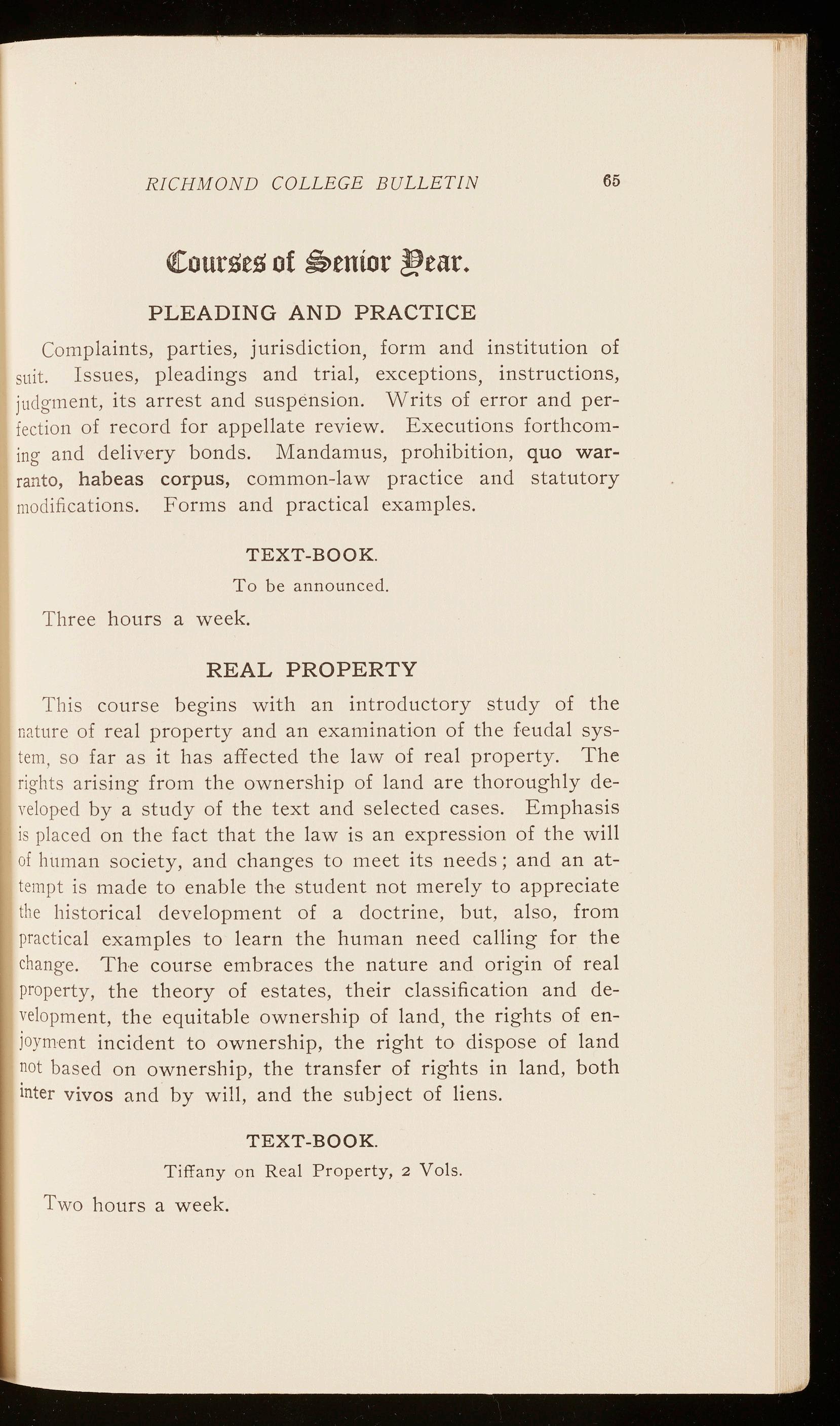
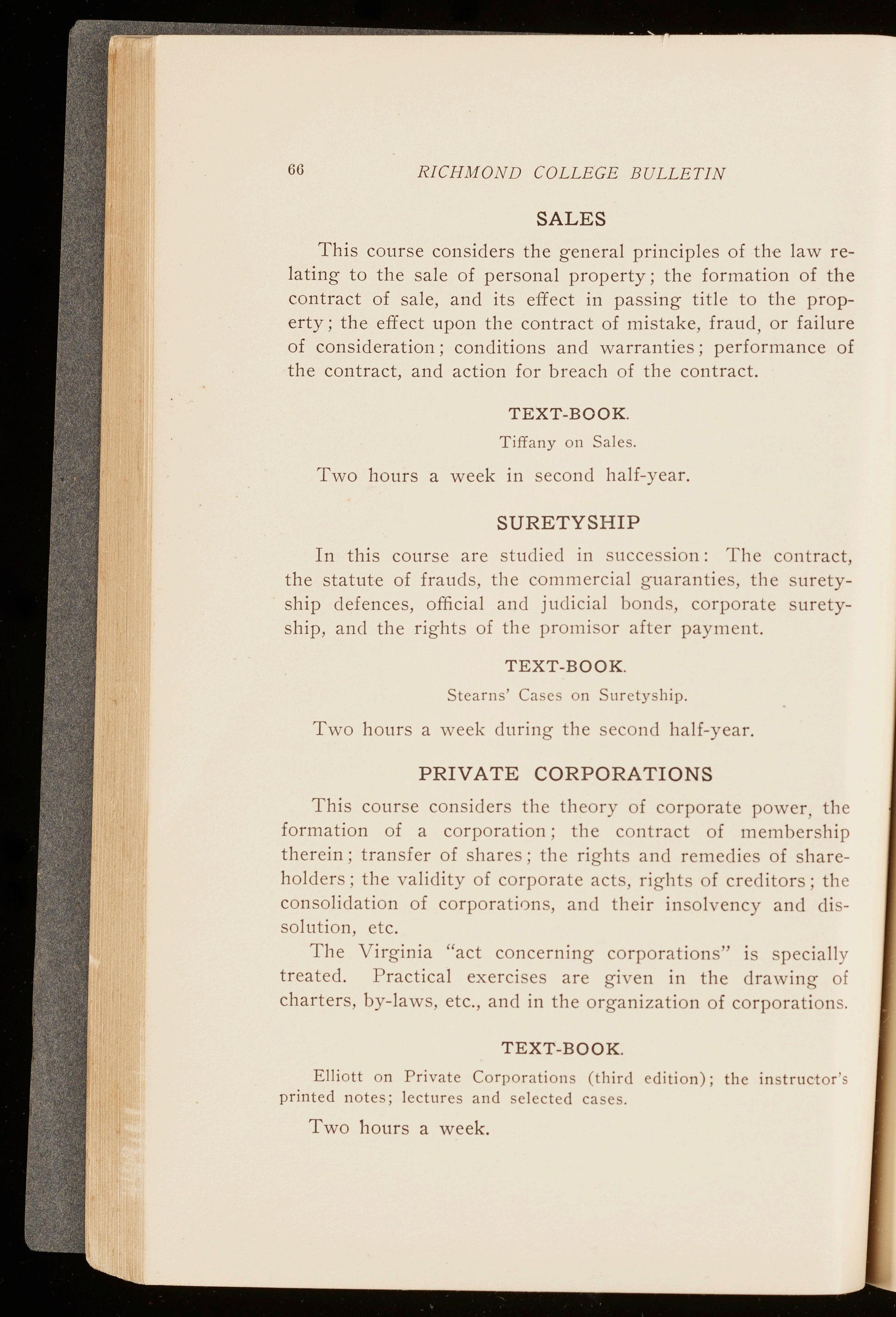
SALES
This course considers the general principles of the law relating to the sale of personal property; the formation of the contract of sale, and its effect in passing title to the property; the effect upon the contract of mistake, fraud, or failure of consideration; conditions and warranties; performance of the contract, and action for breach of the contract.
TEXT-BOOK.
Tiffany on Sales
Two hours a week in second half-year.
SURETYSHIP
In this course are studied in succession: The contract, the statute of frauds, the commercial guaranties, the suretyship defences, officia l and judicial bonds, corporate suretyship, and the ri ghts of the prorni so r after payment.
TEXT-BOOK.
Stearns' Cases on Suretyship.
Two hours a week during the second half-year.
PRIVATE CORPORATIONS
This course considers the th eo ry of corporate power, the formation of a corporation; the co ntract of membership therein; transfer of shares; the rights and remedies of shareholders; the validity of corporate acts, rights of creditors; th e consolidation of corporati0ns, and the ir insolvency and di ssolution, etc .
The Virginia "act concerning corporations" is specially treated. Practical exercises are given in the drawing of charters, by-laws, etc., and in the organization of corporation s.
TEXT-BOOK.
Elliott on Private Corporation s (third edition); the instruct or's printed notes; lectures and selected ca ses
Two hours a week.

EQUITY
In this course a study is made of selected cases upon Equity Jurisdiction decided throughout the common-law world. The essential nature of equity jurisdiction is the first and final object of inquiry.
To this end are studied in detail the specific performance of contracts, the extent and limitations of equity jurisdiction in reference thereto, and the legal consequences flowing therefrom. Further, the effect of the Statutes of Frauds, and of the plaintiff's default as a bar to relief. The doctrine of mutuality of equitab le relief is folly considered. Then attention is turned to equity j uriscliction with reference to obligations independent of contract. For that purpose are studied the specific reparation and prevention of Torts in wa te, trespass, disturbance of easements, abatement of nuisances, and the right of monopoly; patents, copyrights and miscellaneous exclusiYe franchises.
TEXT -B OOK.
Ames' Cases in Equity Juri sdiction, Vol. I., Parts I-VI.
For Reference -J\Ierwin, Bispham, Bi ge low, Pomeroy, Van Zile, Heard, Beach.
Three hours a week; fall and winter terms.
EVIDENCE
This course considers the de,·elopment of the Law of Evidence ; the subject of Judicial ~otice; questions of law as distingui. heel from questions of fact; presumptions, and the "burde n of proof;" admissions and confessions; opinion and hearsay evidence; witnes es, and their examinations; writings, proofs of handwriting , etc.
The aim of this course i to be thoroughly practical, and to this encl the student is required to apply the principles of the sub ject to a variety of fact and ituations likely to arise in the trial of a case.
TEXT -BOOK.
:-IcKelvey on Evidence; lecture s, and selected cases.
For Reference.-Greenleaf and Wigmore on Evidence.
Two hours a week second half-year.

BANKRUPTCY
First, a brief re v i ew is made of a ll the statutes of bankruptcy in England a nd the United States, showing the gradua l evolution from insolvency to bankruptcy conceptions.
Then the American act of 1898, with subsequent ame n dments, is taken up in detail. The various provisions are worked out in the li ght of act u a l decision, with •especia l reference to the respective jurisdictions of the United States and the severa l States, what are acts of bankruptcy, what property passes to the trustee, who may be a bankrupt, how he is protected, exempted and discharged.
TEXT -BOOK.
Williston's Cases on Bankruptcy.
For Reference.-Brandenburg, Ea s tman, Collier, Loveland.
Three hours a week, spring term.
The Faculty reserves the right to re-arrange subjects between classes, and to change text-books, as may be deemed beneficial to the school.
Every student is expected to attend all sessions of the class of which he is a member, and to be prepared whenever called upon, to recite upon the matter assigned. A record of such attendance and class recitation is kept, and is taken i nto consideration in award ing prizes and diplomas.
Students are advised persona ll y to take notes of all lectures , and carefully to study the authorities and important cases, to which frequent reference is made during the course of instruction. Such investigations may be made e ither in the law library of the schoo l , or in the Supreme Court Library, to which students have full access.
DEGREES AND DIPLOMAS
The Profess iona l Degree of Bache lor of Laws (LL.B .) is conferred by the Trustees on recommendation from the Faculty. This degree cannot be given e ith er in course or as an honorary degree.
For Bachelor of Laws is required graduation on all subjects included in the Law School, with proficiency in general education.
Students who comp lete the required work in any subject are awarded cert ificat es of proficiency in that subject, and are not required to st udy the subject again in order to win the degree of Bachelor of Laws.
A ll candidates for degrees are expected to pres ent themse lves at the closing exe r cises of the College Commencement, at which time degrees are conferred. It is the cust om of the g r aduat in g cla ss to wear the Oxford cap and gown o n this occas io n
Fees in Junior Class

11atriculation,
Refundable Contin [::-Cnt.
oo
5 oo Tuition,
Fees in Senior Class
Matr iculat io n
Refundable Contingent,
$20 oo
The matriculation fee, the cont in gent fee and half of the tuition fee are payable at entrance . The second half of tuition fee is payable in Februa r y No honors are announced until all fees are paid in full.
LAW PRIZES
Law prizes were awarded in June, 1910, as fo llows:
Junior Law Prize, ALLEN CAR TER JONES , JR. , VA. Senior Law Prize, .................... L. M. N. BAZILE, VA.
LAW CLASS SCHEDULES , 1910-II

Days
Monday .... Domestic Relations (I) .. Sales (II) Equity (II) .. . .......... Criminal Law
Tuesday Domestic Relation s (I) Sales (II) Equity (II) ............. Criminal Law (I)
Wednesday. Equity (II) ............. Criminal Law (I)
Thursday ... Criminal Law (I) ....... Crimina l Law (I)
Friday ...... Personal Property (I) ... Constitutiona l Law (I) Pleading and Practice (II) Real Property (II)
Saturday .... Personal Property (I) ... Constitutiona l Law (I) Pleading and Practice (II) Real Prope rt y (II)
* Subjects included in t'he Juni o r year are marked (I), and tho se in the Senior year are marked (II). In the latt e r part of the session, the subject of Negotiable In st rument s (I), will be taught at th e hours assigned above to D omest ic Relations (I) The su bject of Sales (II), will be followed at the same h ou r s by Corporations (II). The 'hours assigned in the s chedule to Criminal Law (I) will be given to Torts (I), in the Winter Term, and t o Contracts (I) in the Sprin g T erm. In the Spring Term Bankruptcy (II) takes the place of Equi ty (II). Evidence (II) will be given th e second h alf year. All other subjects are taught throu ghout the year at the h ours named in the schedule.
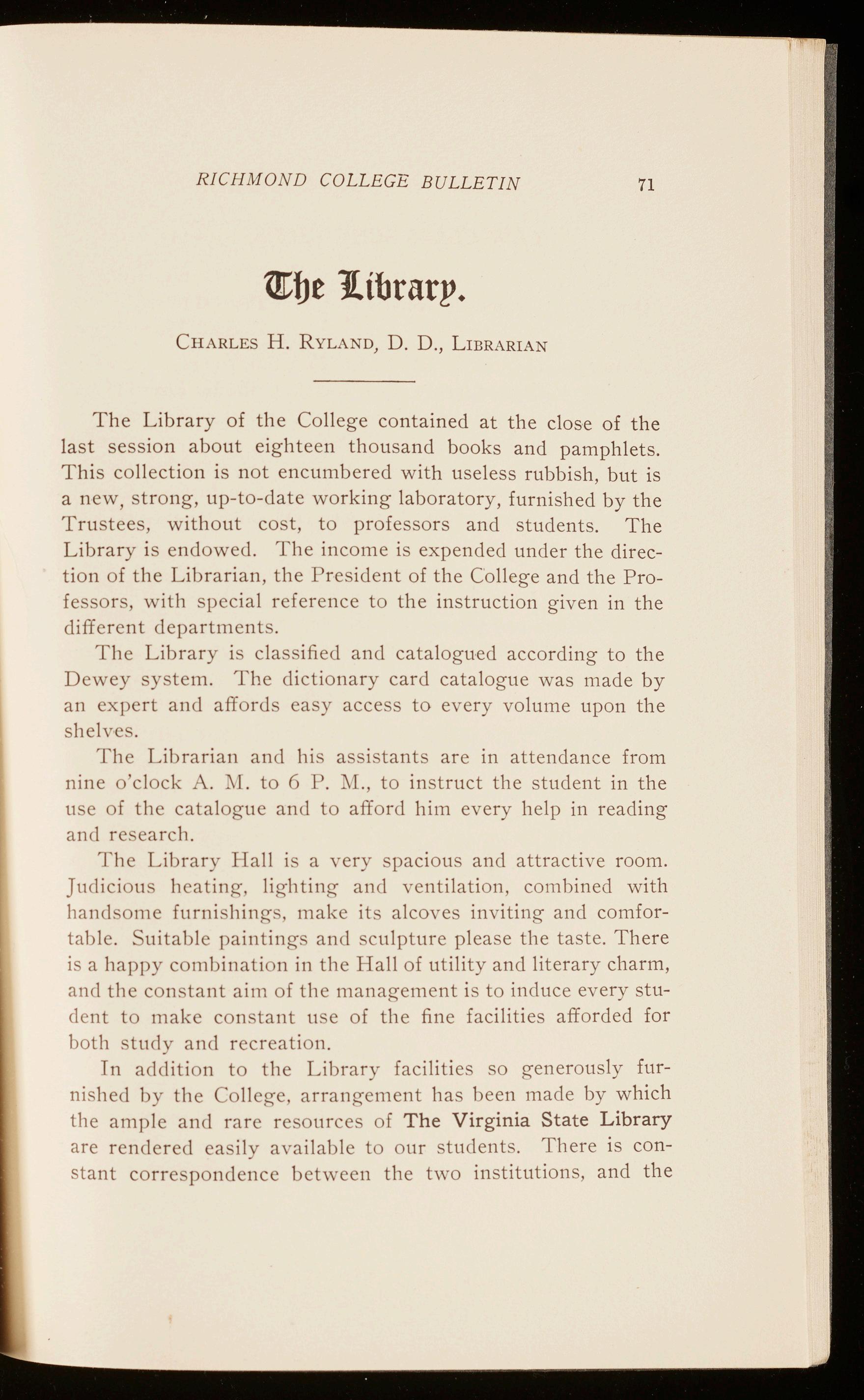
~beJLibrarp.
(HARLES H. RYLAND, D. D., LIBRARIAN
The Library of the College contained at the close of the last ses ion about eighteen thousand books and pamphlets. Thi collection is not encumbered with useless rubbish, but is a new, trong, up-to-date working laboratory, furnished by the Trustees, without cost, to professors and students. The Library i endowed . The income i expended under the direction of the Librarian, the President of the College and the Profes ors, with pecial reference t o the instruction given in the different departments.
The Library is cla sified ancl catalogued according to the Dewey y tern. The dictionary card catalogue was made by an expert and afford easy acce s to every volume upon the shelves.
The Librarian and his a sistant are in attendance from nine 'c lock A. M to 6 P. 11., to instruct the student in the u e of the catalogue and to afford him every help in reading and research.
The Library Hall is a Yery pacious and attractive room. Judiciou. heating, lighting ancl yentilation, combined with handsome furni s hing s , make its alcoves inviting and comfortable . uitable painting and sculpture please the taste. There is a happy combination in the IIall of utility and literary charm, and the c n . tant aim of the management is to induce every student to make constant u e of the fine facilities afforded for both study and recreation.
In addition to the Library facilities so generously furni . hed by the College, arrangement has been made by which the ample and rare resources of The Virginia State Library are rendered easily a\ ·ailable t o o ur students. There is constant corre pondence between the two institutions, and the

R7CHMOND COLLEGE BULLETIN
State Librarian, Dr. Mcl lwain e, ha s proved a cl ose friend to all young men who are pursuing lin es of research.
At the opening of the sess ion the printed regulations of the Library will be placed in hands of eac h student .
RELIGIOUS CULTURE
The College Library and Reading Room a r e not only scientific and literar y in their eq uip ment, but contrib u te freely to the r e lig iou s lif e of the Co ll ege. Six religious monthlies and quarterlies, with twelve of the best week li es are laid ever y da y before the student. A fine line of books on the various phases of missionary life and work has been catalogued.
Bible study find s many accessories in the Library. A long line of the best commentaries on the Holy Script ur e are within r eac h , and the critica l and experimental study of God's Word is constant.ly encouraged.
THE LAW LIBRARY
The Law Library occup i es a room to itself adjoining the main lecture-room of the Law Department. Thi library contains the val u able collection of law books owned by the la te Hon. Henry Heaton, of Loudoun county, and donated to the College by his sister, Irs. Harriet 11. Purcell. On this foundation of the most approved and va luable works on law, the College is building by yearly accession of va luable Reports from the General and State Government , and all necessary Current Magazines tudent in the Law Department are given free access to the Law Library of the College and the State
MUSEUM
The beautiful James Thomas, Jr., Museum and Art Ha ll h as been dedicated to its specific use . Into it have already been gathered casts of celebrated statuary, painting , and many valuab le curios and objects of ethnographical interest
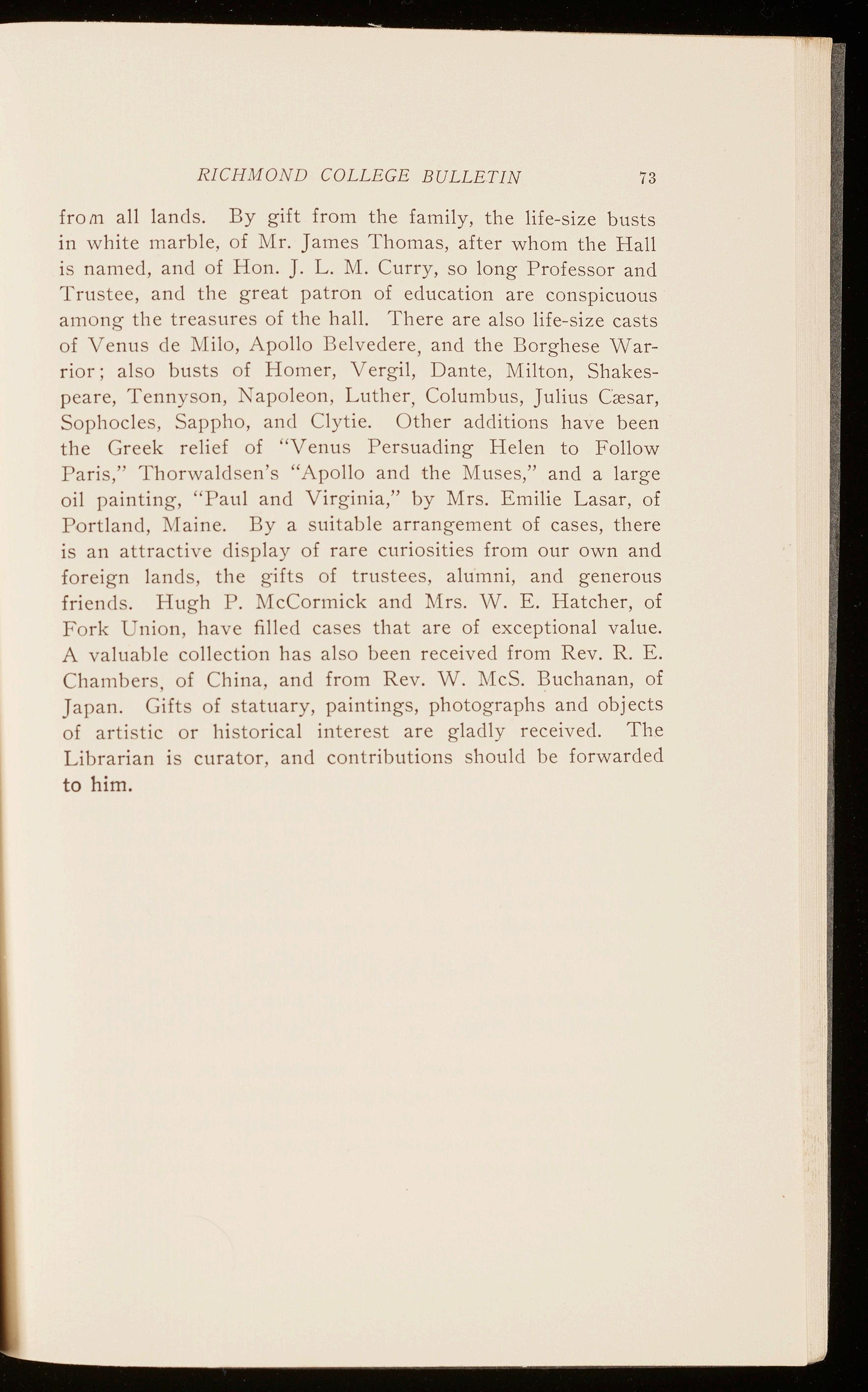
RICHJ10ND COLLEGE BULLETIN
from all lands. By gift from the family, the life-size busts in white marble, of Mr. James Thomas, after whom the Hall is named, and of Hon. J. L. M. Curry, so long Professor and Trustee, and the great patron of education are conspicuous among the treasures of the hall. There are also life-size casts of Venus de l\Iilo, Apollo Belvedere, and the Borghese Warrior; also busts of Homer, Vergil, Dante, Milton, Shakespeare, Tennyson, r apoleon, Luther, Columbus, Julius c~sar, Sophocles , appho, and Clytie. Other additions have been the Greek relief of "Venus Persuading Helen to Follow Pari ," Th rwaldsen's "Apollo and the Muses," and a large oil painting, "Paul and Virginia," by Mrs. Emilie Lasar, of Portland, f aine. By a suitable arrangement of cases, there is an attractive display of rare curiosities from our own and foreign land , the gifts of trustees, alumni, and generous friend . Hugh P. McCormick and Mrs. W. E. Hatcher, of Fork Union, have filled ca es that are of exceptional value. A valuable collection has also been received from Rev. R. E. Chambers, of China, and from Rev. W. 1cS. Buchanan, of Japan. Gift of statuary, paintings, photographs and objects of artistic or historical interest are gladly received. The Librarian is curator, and contributions should be forwarded to him.

LITERARY SOCIETI E S
Two literary societies, known as the Mu Sigma Rho and Philologian, are maintained by the students, and are recognized as agencies of great value in scholastic training. They are provided with elegant halls, where they hold weekly meetings for declamation, debate and other literary exercises. Besides the joint oratorical co nte st held in the spring, each society arranges for at least one public debate during the session. The two societies unite in publishing "The 1essenger," a m ont hly maga zin e of about seventy-five page . A generous rivalry is maintained between the two organizations by the joint offer of an orator's medal and a writer's medal , and among the individual member by the offe r in eac h soc iet y of a medal for declamation or improvement in debate, and for the best debater. The medalists for 1910 were a f llows:
PHIL O LOGIAN SOCIETY.
Best Declaimer's Medal, HE1 RY \VILLIA:\I WILKINS, P .\. Best Debater's Medal, ....... ...... ... ... A. OTTO L Y:N IT, V \. Best Reader's Medal, .... . . ..... ... .. TIT :\L\S E. COCHRAN, KY Improvement in Debate, ......... LACY FO TER PA LETTE, V.\.
Joint Writer's Medal, .................. \V.\LTER BEVERLY, VA.
Joint O rator's Medal, ................ JOHN GLENN B ,\RB E, V.\.
MU SIGMA RHO SOCIETY.
Best Debater's Medal, ............. ROBERT C. D VAL, JR., V ·\.
Best Declaimer's Medal, ....... , .... JULIAN LAWRENCE, V ,\.
The lit erary societies hold membership in the Virginia State in tercollegiate Oratorica l As . ociation, which is composed of the societie of the leading college and universiti c of Virginia. The Intercollegiate Debate of 1910 was with Randolph-1\Iacon College.
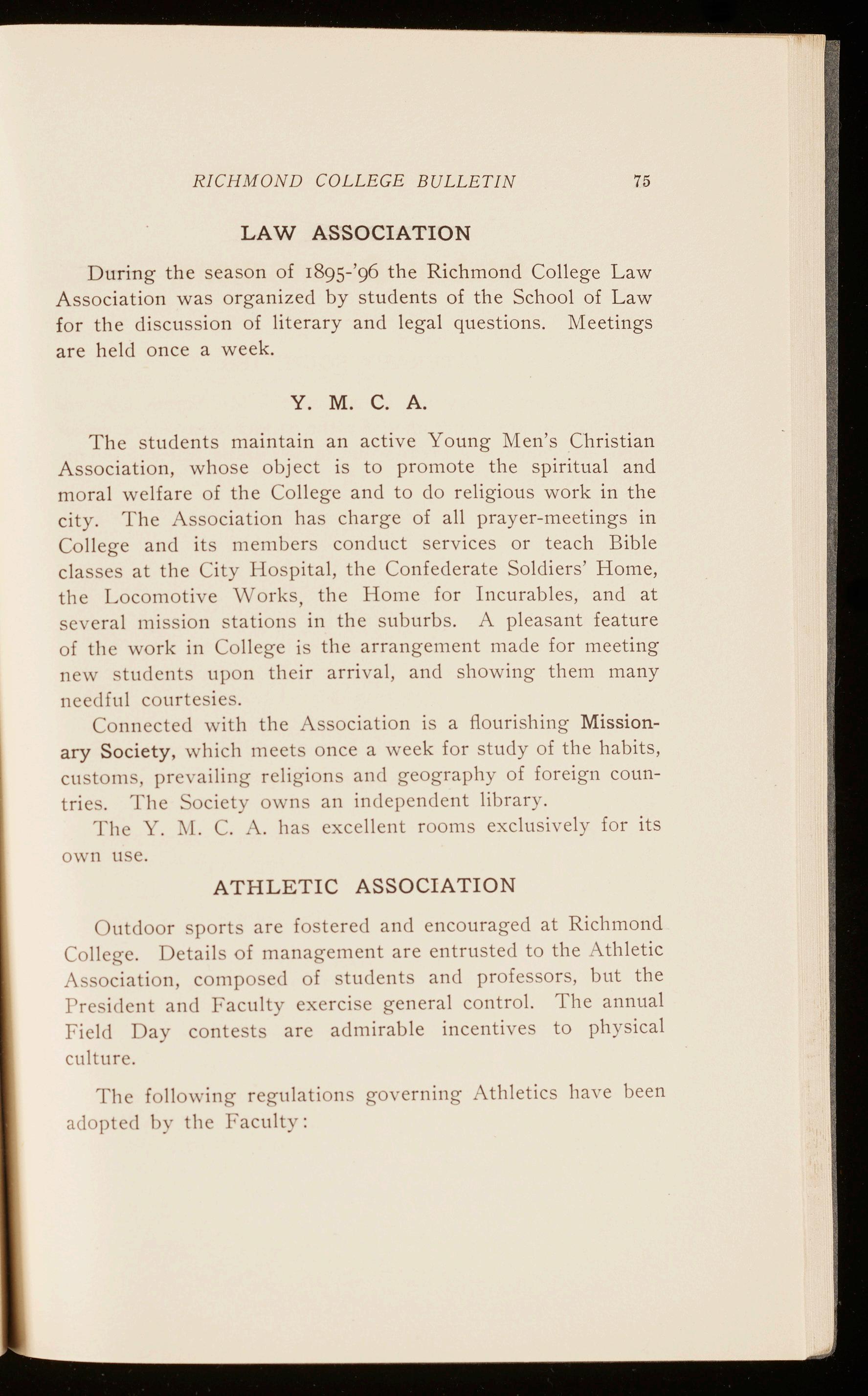
LAW ASSOCIATION
During the season of 1895-'96 the Richmond College Law Association was organized by students of the School of Law for the discussion of literary and legal questions. Meetings are held once a week.
Y. M. C. A.
The students maintain an active Young Men's Christian Association, whose object is to promote the spiritua l and moral welfare of the Co lleg e and to do religious work in the city. The As ociation has charge of all prayer-meetings in College and it members conduct services or teach Bible clas e at the C it y Hospital, the Confederate Soldiers' Home, the Locomotive Works, the Home for Incurables, and at several mission stations in the uburbs. A pleasant feature of the work in College is the arrangement made for meeting new students upon their arrival, and showing them many needful courte ie .
Connected with the As ociation is a flourishing Missionary Society , which meets once a week for study of the habits, cu toms, prevailing religion and geoo-raphy of foreign countrie . The 'ociety owns an independent library.
The Y. i\l. C. A. has excellent rooms exclusively for its o wn u e.
ATHL ETIC
ASSOCIATION
utdoor sports are fostered and encoura<Ted at Richmond Co llege. Detail of management are entrusted to the Athletic As, ociation, composed of students and professors, but the Pre. iclent and Faculty exerci e general control. The annual Field Day contests are admirable incentives to physical culture.
The following regulation governing Athletics have been adopted by the Faculty:

RICHMOND COLLEGE BULLETIN
Re g ulations Governing Athl etics
I. The Pres i dent of the College has general oversight and co n tro l of field and track ath l etics, and is authorized to forbi<'.1 any features in these exercises which endanger the health or morals of the participants.
2. Only matriculated students are eligible to play on a Co ll ege team in any public contest. The Faculty reserves the right to remove from the team at any time any member who may neglect his class duties, or prove himself Ill any way unworthy.
3. Members of the Col lege teams must maintain an average of 80 per cent. in three regular cla es, and may not fall be low 70 per cent. in any one of the three classes . \Vhenever any member of a team fails to maintain the required average, he is notified of the fact in writing by the President of the College, and this notice dismisses him from the team or teams of which he is a member. The dismissal becomes effective seven days, including day of notice, from the date of official notification, and the student receiving notice may not again represent the College on an athletic team until he has made the required average in hi classes and has been formerly re-instated
4 . Each team is allowed four trips from College, provided that these four trips do not involve being away from College more than six school days. All proposed games must have the approval of the President of the College before engagements are made.
5. No student under twenty-one years of age i permitted to become a member of a regular team, except upon written permission from his parent or guardian, addre sed to the President of the College.
6. Athletic teams are permitted to engage in contests away from Richmond only with teams from other in titutions of learning

RICHMOND COLLEGE BULLETIN
SOCIETY OF ALUMNI
The A l umni of the College have long been organized into a Society, which bolds annual meetings to renew old associations, maintain a close connection with Alma Mater, and further the cause of education and l et'ters . For severa l years the custom bas been to have an annua l banquet on Tuesday of commencement week. The officers of the Society are:
GEORGE BRYAN, ESQ., Richmond, Va., .......... President. HILL :\[O)JTAGUE, ESQ., Richmond, Va., .... First Vice-President. A. J. ClIEW TING, Richmond, Va., ... ·....... Second Vice-President.
PROF. JJ. F. COX, Richmond, Va , ....... . ... Third Vice-President.
PROF \V. A HARRIS, Ric 'hmoncl, Va., .. ......... . ...... Secretary J. AUBREY SAUNDERS, ESQ., Richmond, Va , .......... Treasurer.
Degree men are members of the Society without election, and all former students are eligible for election. The annual fee is $r.oo.
Local Chapter s
In 1\Iay, 1898, there was organized in Louisville a Chapter of the General Society of Alumni, which is known as the "Kentucky Association of Richmond College Alumni." The Kentucky ssociation holds annual meetings in l\.Iay. The present officers are: Dr. S. E. \Voody, Louisville, President; Dr. \V. 0. Carver, Louisville, Secretary and Treasurer.
In February, 1899, the alumni resident in Norfolk, Va , and vicinity organized a "N"orfolk Chapter of Richmond College Alumn i." The chapter ho lds annual meetings in February. The present officers are: S. T. Dickinson, Esq., Norfolk, Pre ident; C. \V . Coleman, Esq., Churchland, Secretary and Trea urer.
In April, 1903, there was organized in Newport News, Va., a "Penin ula Chapter of Richmond College Alumni ." The chapter wi ll hole\ annual meetings. The President is George A . chmelz , Esq., of Newport News.
During the session of 1905-'06 alumni chapters were o rganized in Richmond, Baltimore, Lynchburg and Roanoke.
The President of the College will he glad to correspo n d with alumni who desire to form local associations
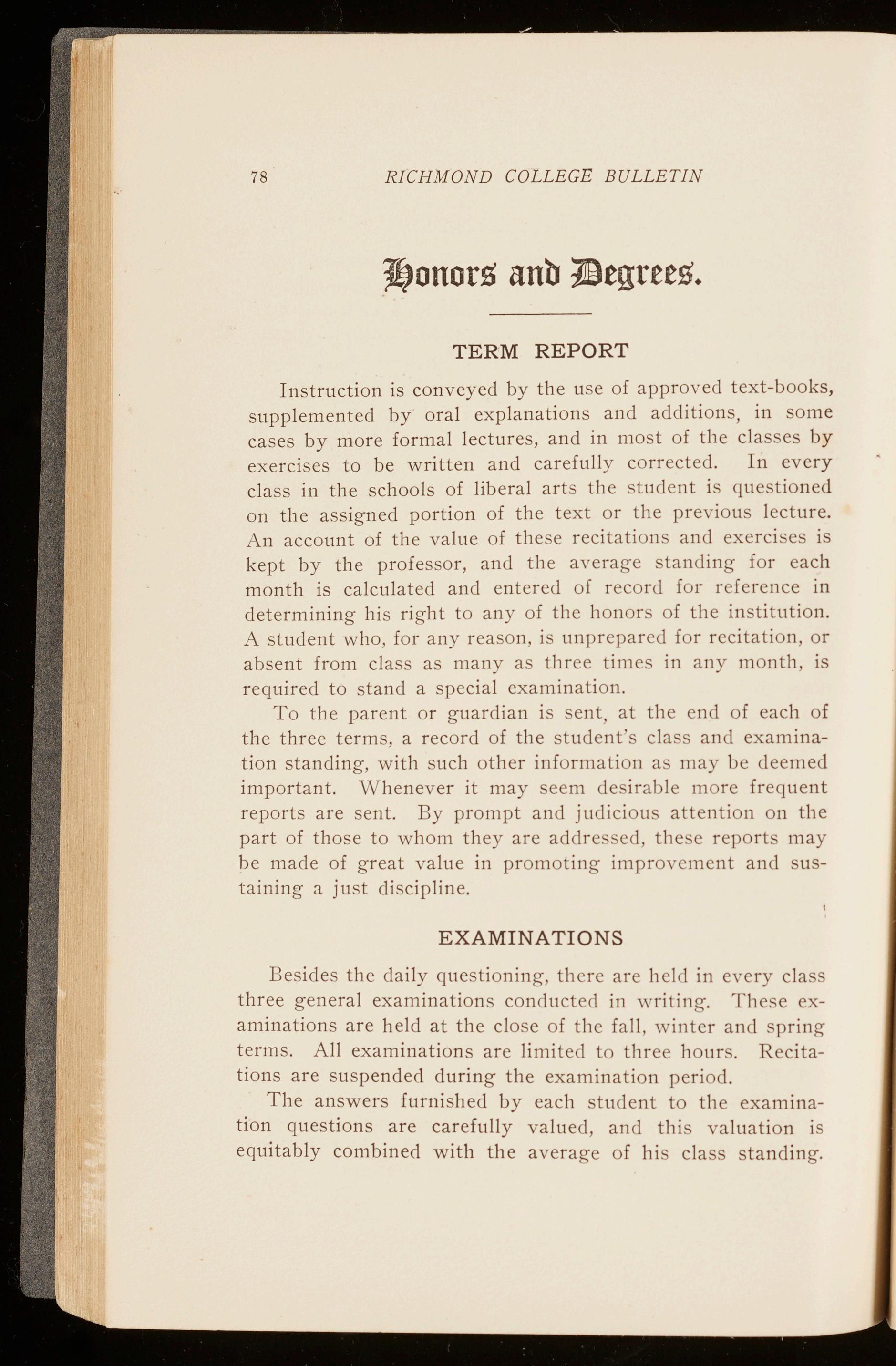
TERM REPORT
Instruction is conveyed by the use of approved text-books, supplemented by oral explanations and additions, in some cases by more formal lectures, and in most of the clas es by exercises to be written and carefully corrected. In every class in the schools of liberal arts the student is questioned on the assigned portion of the text or the previous lecture. An account of the value of these recitations and exerci es is kept by the professor, and the average standing for each month is calculated and entered of record for reference in determining his right to any of the honors of the institution. A student who, for any reason, is unprepared for recitation, or absent from class as many as three times in any month, is required to stand a special examination.
To the parent or guardian is ent, at the end of each of the three terms, a record of the student' class and examination standing, with such other information a may be deemed important. Whenever it may seem desirable more frequent reports are sent. By prompt and judicious attention on the part of those to whom they are addressed, these report may be made of great value in promoting improvement and ustaining a just discipline.
EXAMINATI ON S
Besides the daily questioning, there are held in every class three general examinations conducted in writing. These examinations are held at the clo e of the fall, winter and spring terms. All examinations are limited to three hours. Recitations are suspended during the examination period.
The answers furnished by each student to the examination questions are carefully valued, and this valuation is equitably combined with the average of hi clas standing.
RICHMOND COLLEGE BULLETIN
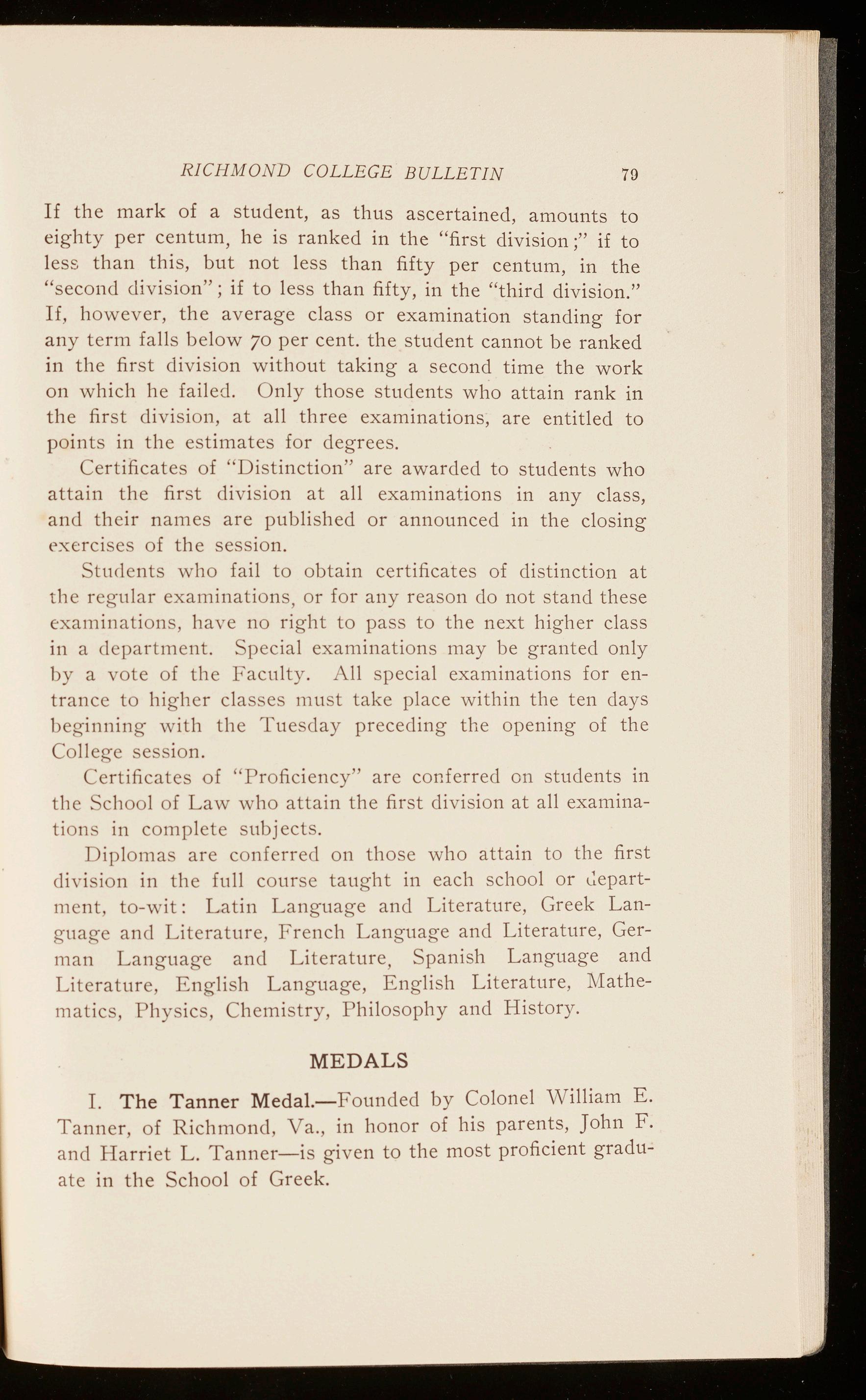
70
If the mark of a student, as thus ascertained, amounts to eighty per centum, he is rank e d in the "first division; " if to le ss than thi s, but not les s than fifty per centum, in the "second division"; if to less than fifty, in the "third di v isi o n."
If, however, the average cla ss o r examination standing for any term fa ll s below 70 per cent. the student cannot be ranked in the first div i sio n without taking a seco nd time the work on wh ich he failed. On ly those students who attain rank in the first d ivision, at a ll three examinations, are entit led to point in th e est imate s for degrees.
ertificat e o f "D ist in ct io n " are awarded to students who attain the first division at all examinat ion s in any cla ss, and their n ames are published or a nn ou nced in the clos in g excrci c of the sess ion .
Students who fail to obtain certificates of distinction at the regular examinations, or for any rea on do not stand these examinations, have no right to pass to the next higher class in a department. Special examinations may be granted only by a vote of the Faculty All special examinations for entrance to higher clas es must take place within the ten days beginning with the Tuesday preced in g the opening of the Co ll ege session.
'ertificates of "Profic i ency" are conferred on students in the , chool of Law who attain the first divis ion at all examinations in complete subject .
Diploma are conferred on those who attain to the first diYision in the full course taught in each school or l:epartment, to-wit: Latin Language and Literature, Greek Language and Literatu r e, French Language and Literature, German Language a nd Literature, Spanish Language and Lite r ature, Eng li sh Language, Eng li sh Literature, Mathemat ic , Physics, C h emistry, Philosophy and History.
MEDALS
I. The Tanner Medal.- Founded by Colonel William E . Tanner, of Richmond, Va., in honor of his parents, John F. and Harriet L. Tanner-is given to the most proficient graduate in the chool of Greek.
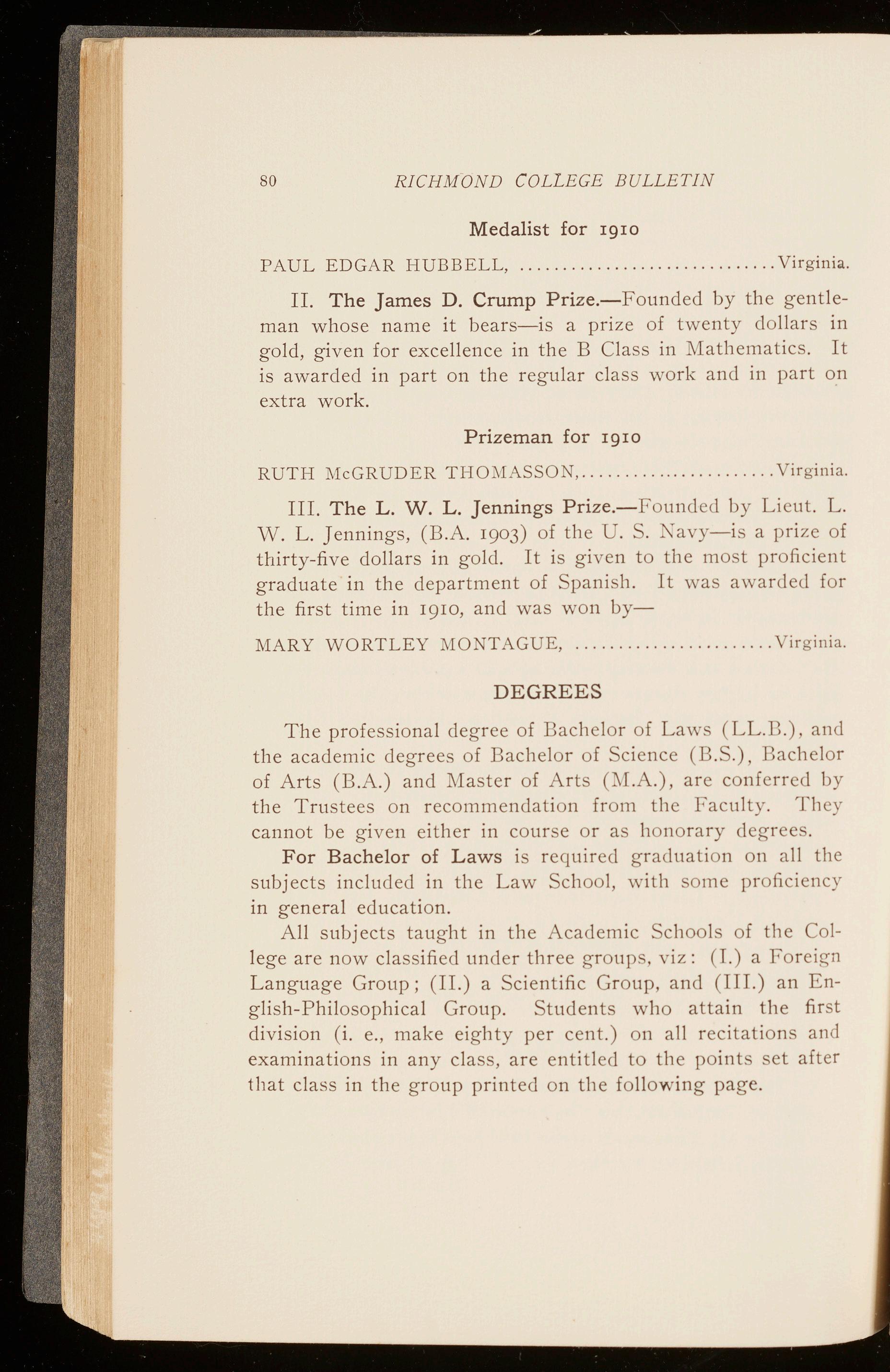
RICHMOND
Medalist for rgro
PAUL EDGAR HUBBELL, .............................. Virginia.
II. The James D. Crump Prize.-F o un ded by the gent leman whose name it bear s-is a prize of twenty dollars in gold, given for excellence in the B Class in Mathematics. It is awarded in part o n th e r eg ular class work and in part on extra work.
Prizeman for rgro
RUTH i\1cGRUDER THOi\IASSON, . .. .. ........... Virgin ia.
III. The L. W. L. Jennings Prize.- Founded by Lieut. L. \ V . L. Jennin gs, (B .A. 1903) of the U . S. l\avy- i s a pr ize of thirty-five dollars in gold. It is give n to the most profic ient graduate in the department of Spanish. It was awarded for the first time in 1910, and was won by -
MARY
WORTLEY MONTAGUE, .. .............. ... .. Virg inia.
DEGREES
The professional degree of Bachelo r of Laws (LL.B.), and the academic degrees of Bachelor of Science (B .. ) , Bachelor of Arts (B .A .) and l\Iaster of Arts (M.A .), are conferred by the Trustees on recommendation from the Facu lty They cannot be g iven either in cour e o r a honorary degrees.
For Bachelor of Laws is required graduation on all the subjects included in the Law Sc h ool, ·w ith ome proficiency in general education.
A ll subjects taught in the Academic Schools of the Colleg e are n ow classified under three g r oups, viz: (I.) a Foreign Lan g uag e Group ; (II.) a Scient ific Group, an 1 ( III.) an English-Philosophical Group Students who attain the first division (i . e , make eighty per cent.) on a ll r ec itations and examinati ons in any class, are entitled to the points set after that class in the group printed on the fo ll ow in g page.

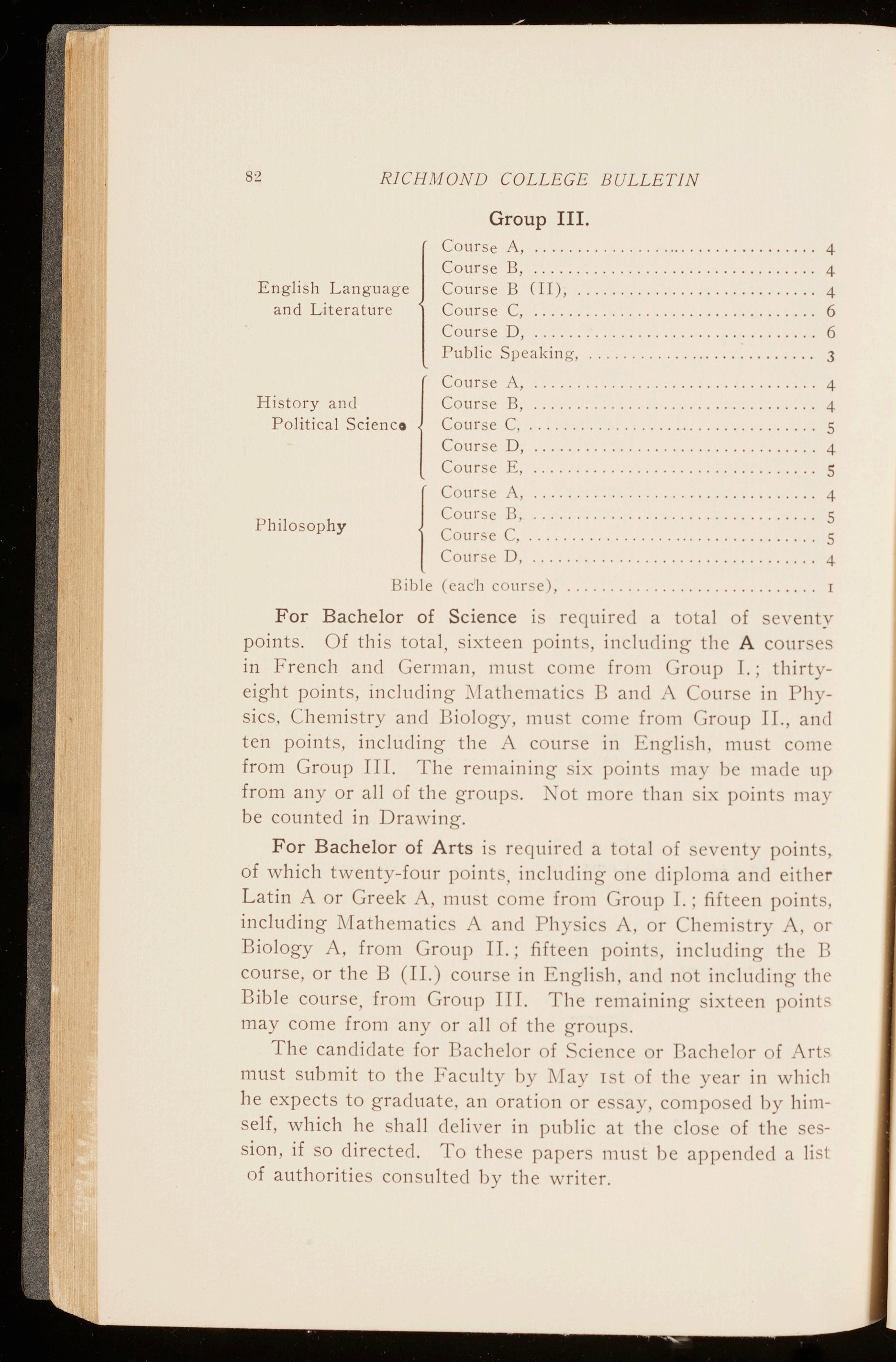
For Bachelor of Science i. required a total of se,·enty points. Of this total, ixteen points, including the A courses in French and German, must come from Group I.; thirtyeight points, including ;.[athematics ll and , \ ourse in Physics. C h emi st r y a nd Biology, mu. t c me from Grou p II. , and ten points, includin g th e A course in English, must come fr om Group III. The remaining s ix points may be made up fr om any or a ll of the groups . Xot mor than six points may be counted in Drawing.
For Bachelor of Arts i required a total of se , ·enty point , of which twenty-four points. including one diploma and either Latin A or Greek A, must come from Group I.; fifteen point., including :\lathematics A and Physic. A, or Chemi. try A, or Biology A, from Group II.; fifteen points, in c ludin g the n course, or the B (II.) course in Engli. h , and n o t includin g the Bible course, from Group ITT. The remaining ixtee n points may come from any o r a ll of the group
The candidate for Bachelor of Science o r nachclor of ,\r t, must submit to the Faculty by :.fay 1st of the year in which he expects to graduate. an orat ion or cs ay. compo eel by himself, which h e s h al l deliYer in public at the close of the sess ion , if so directed. To the e papers mu. t be appended a list o f authorities consulted by the writer.

RICHJJOND
COLLEGE BULLETIN
Candidates for any of the degrees mentioned above are required to submit to the Faculty eight months before Commencement a written application for the degree sought, together with a statement of class-work already accomplished, and that which remains unfinished.
The applicant for the degree of Master of Arts must previously haYe met all requirements for a B.A. degree. In addition to thi , he must obtain from the Faculty, at the beginning of the session in which he expects to take the M.A. degree, formal approval of his course of study, which shall constitute a full year of work. This course must embrace at least two senior classes, neither of which shall have been ofTcreel for the D.A. degree. The mo t advanced class in each of the following departments counts as a senior: Latin, Creek. French, German, English Language, English Literature, i\lathematics, Chemistry, Physics, History and Philosophy. Xo part of the work offered for the :.\LA. degree shall lie clone in absentia. The candidate for the l\LA. degree must submit to the Faculty, not later than April 15th preceding the close of his cour e of study, a typewritten or printed thesis on some topic within the field of his year's work. This thesis must show an intelligent grasp of subject and the power of original investigation. Each thesis must contain full bibliography of authorities. The subject of the thesis must be submitted to the Faculty within two months from the date on which the cancliclatc is notified of the appro\·al of his course of tudy .
.\ Bachelor of Arts of another institution of learning who enters Richmond College as a candidate for the degree of l\ I aster of i \ rts, 111ust fiLt satisfy the Faculty that his previous scholastic work is equiYalent in amount and quality to that required for the B \. degree in Richmond College. He will then be accepted as a candidate for :.\I.A., subject to the same conditions imposed upon graduates from this College. Bachelors of Arts who are deficient in any of the courses required here for B ..\. will be given opportunity to make up the deficiency.

~bmissionof Women.
Since 1898, the classes of Richmond College have been open to women. The conditions of entrance are as follows:
1. In orde r to be admitted to matriculation, young women must have attained the age of eighteen years.
2. They must s how by examination or otherwise, to the sat isfaction of the President, that they can meet the full entrance requirements of fourteen units.
3. Those who fulfill these conditions may elect any of the coursesoffered in the academic departments of the College and w ill be e li g ible to all distinctions and diplomas, and to the degrees of Bachelor of Science, Bachelor of Arts, and :\laster of Arts on the same conditions that app ly to male student .
4. Young women will be required to pay the usual Co ll ege fees. A number of scholarships will be available for young women as soon as the subscriptions made in the recent campaign shal l have been paid.
5. The College authorities have not been able to proYide dormitory facilities for women. Those who do not reside with parents or relatives must board at some place approved by the President.
6. A comfortable study hall i, proYided, for use of which an annual fee of $2.50 i5 e'harged.
In hi s annual statement of June, 1908, the President of the College reported to the Trustees as follows:
"Ten years ago this month you decided to admit women to the Liberal Arts Departments of Richmond College. The entrance requirements were made much higher than for men, in order that the College might n ot compete with existing Virginia schools for women. No provi ion was mad e for board or lodging for women. The first session four young women matriculated. For the next nine sessions the numbers have been, respectively, seven, six, six, eight, thirteen, eighteen, seventeen, twenty, twenty. Sixty-four different

RICIIMOND COLLEGE BULLETIN
young women have matriculated. Nineteen of these have won degrees. One took the B.S. degree, eighteen the B.A. degree, and four of the latter took also the M.A. degree. Of those who did not take degrees, one attended three years, nine attended two years, and the remaining thirty-five (ten of whom were new matriculates in 1907-'08) attended only one session. Omitting the students of the present session, it is known that all except eight of these young women entered the profe sion of teaching after leaving Richmond College. They have held positions in the Woman's College and High School of this city, in the Raleigh Baptist College for Women, in the Greeneville Female College, in the Virginia State Normal, and in other important schools in Virginia and elsewhere. Three of those who won degrees, and six others, have married since leaving College. Two married young men they met in College At no time has it become necessary to reprimand or punish a woman student. By their diligence in study, as well as by their becoming behavior, they have clone honor to themselves and to the College."
In 1909-'10 the enrollment of women students was thirty. ,\ large proportion of the women who enter Richmond College have previously received degrees from excellent school . Properly prepared students will be cordially welcomccl. In(Juirie should be addressed to the President of the College.
Richmond 'allege is now co-operating with the Virginia Bapti , t Education Commission in collecting $500,000 for the purpose of building a \Voman's College, and of further strengthening the present Richmond College. The entire amount has been subscribed in fi.\·e installments, of which the first and second, amounting to $200,000, has already been paid in cash. The new \Yoman's College will be owned and controlled by the Trustees of Richmond College, and will offer courses of instruction in all respects equal to those offered in the College for men. The buildings for women will co t not le ss than $100,000, but the grade and quality of the teachino· will he rerrarded as of fir t importance. h h

SESSI ON
The session opens on the Thursclay nearest to the 22d of September, and continues thirty-eight weeks. The next ession, therefore, will open September 22, 1910, and will close June 14, 1911. Exercises are suspended for one week at Christmas ancl on two separate days in the Spring-Easter l\londay and "Field Day"-for competitive out-of-door sports.
Students are advised to be present at the opening of the session. This applies particularly to students who enter the lower classes. Students who are prepared for clas cs higher than the !owe t, and cannot enter in September, may enter with advantage at the opening of the winter or spring terms.
ENTRANCE RE QUI REMENTS
In September, 1906, Richmond College put into effect the minimum entrance requirements of the ·· outhern Association of Colleges and Preparatory Sch ols." The requirements as then adopted, amounting to the completion of a three-year High School course, continued in force through the session of 1909-'10. At their annual meeting in June, 1909, the Trustees of the College approvecl the fourteen Carnegie units as a new standard of entrance, and YOted that on and after September 22. 1910, these fourteen units , hould be the entrance requirements of Richmond College.
The entrance requirements for 1910-'II are given below. In every case the applicant for admission should send to the President of the College for a blank certificate of aclmission and have the question of entrance definitely settled before he leaves home.
RICHJWND COLLEGE BULLETIN
REGULATIONS CONCERNING ENTRANCE
For admission to Richmond College the general condi- tions are as follows:
I. The student must be at least fifteen years of age; for most students a minimum of sixteen years is advised.
IT. The applicant for admission should present a certificate of honorable dismi sal from the last school attended, or other sufficient evidence of good character.
III. Ile must give proof of adequate preparation to profit by the work off red in college classes. This preparation may be eslabli heel by:
1. A wrillcn examination.
2. A certificate from an accredited preparatory school.
3. Faculty pcrrni sion lo regi s ter as a special student.
The requirements for aclmis. ion are stated in units . A unit is the equi,·alent of five recitation periods a week during a full . chool year of a preparatory school above the grammar grade.
For admission to full standing as candidate fourteen units are r equ ired, of which six are eight arc optional.
The specified units are a. follow. :
Engli h, 3.
:\ I athema tics. 2.
Il istory, I.

for a degree pecified and
For the eight optional units the candidate may offer any of the work li ted a acceptable for entrance, provided that not more than two additional units are offered in History.
For admi. ion to conditional standing as a candidate for a degree, t n unit are required. with the condition that the remaining four are to be made up at least one year before graduation. This can de clone in either of two way :

RICH.'VIOND COLrEGE BULLETIN
1. By passing off the necessary number of units in subjects prescribed for admission, as the result of private study or in class.
2. By doing other work offered in co ll ege which shall be counted toward the fulfilment of the ent rance requirements. In s uch cases two hour s of college work each week for one college yea r shall be counted a a n eq ui va l e nt to one entrance unit.
The following stateme nt indicates the a m ount o f preparation expected in eac h s ubj ect :
I. English.-Thre e units; all united.
The English requir ements cons ist of two parts:
(a) English Grammar and Rhetoric, including Grammar, Analysis, Punctuation, Paragraphing a nd Compos iti on.
(b) The reading course and the course in spec ial study and practice adopted by the Assoc iat ion of Co ll ege and Preparatory Schools of the Sout h ern States.
The fo ll owing are the courses assigned by the Assoc iat ion for entrance requirements in English:
Reading.-In r9ro, r9r I.
Group I (two to be se lected)
Shakespeare's As You Like It , Henry V. , Julius c~sar, The Merchant of Venice, Twelfth Night.
Group 2 ( one to be se l ected) .
Bacon's Essays; Bunyan's The Pilgr im's Progress, Part I; The Sir Roger de Caver ly Papers in The Spectator; Franklin's Autobiography .
Group 3 ( one to be se l ected).
Chaucer's Prologue; Spenser's F~rie Queene (Selections) ; Pope's The Rape of the Lock; Go ld smith's The Deserted Village; Palgrave's Golden Treasury (First Ser i es), Books 2 and 3, with specia l attent ion to Dryden, Co llin s, Gray, Cowper and Burns.
Group 4 (two to be se l ected).
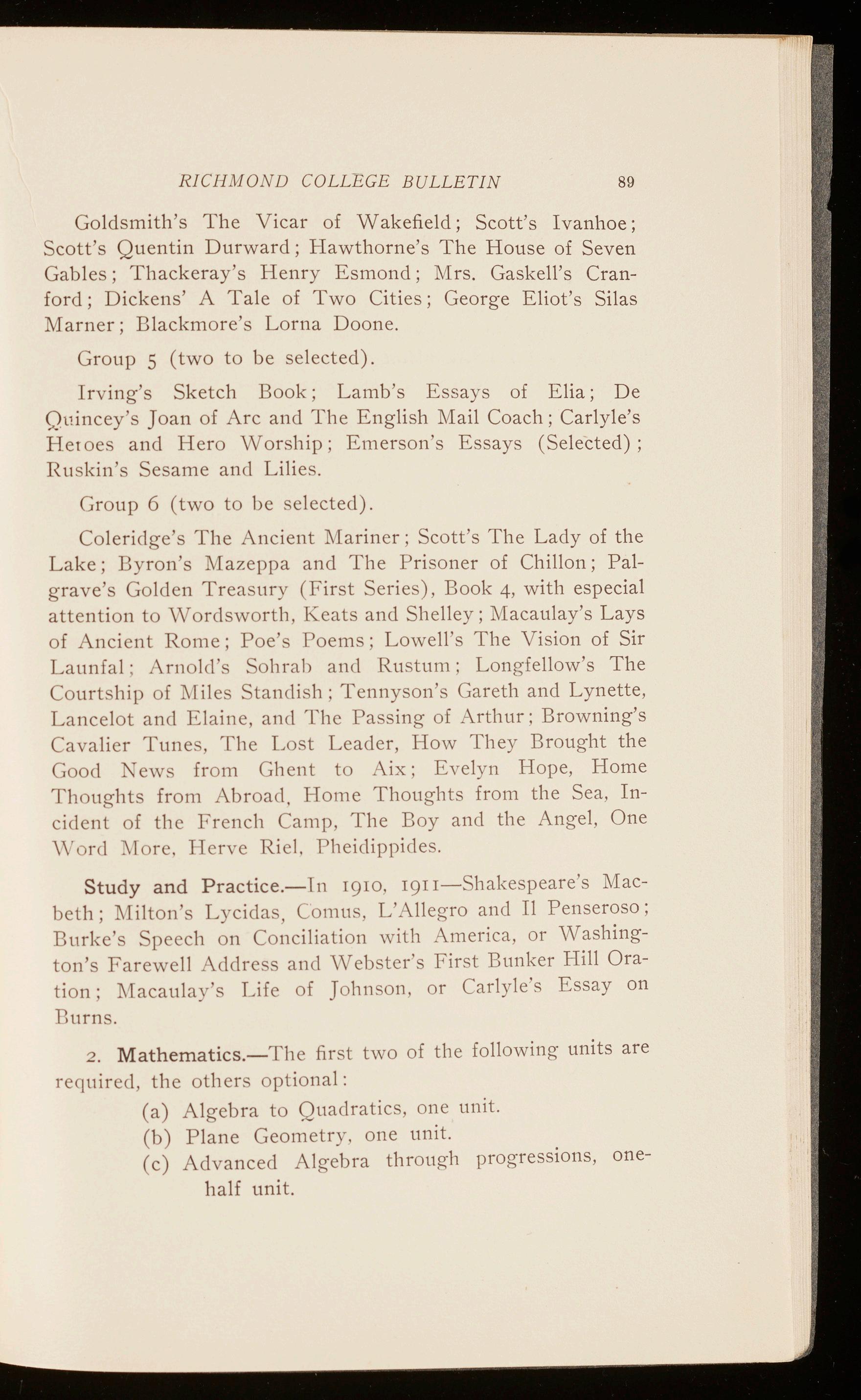
Goldsmith's The Vicar of Wakefield; Scott's Ivanhoe; Scott's Quentin Durward; Hawthorne's The House of Seven Gables; Thackeray's Henry Esmond; Mrs. Gaskell's Cranford; Dickens' A Tale of Two Cities; George Eliot's Silas Marner; Blackmore's Lorna Doone.
Group 5 (two to be selected).
Irving's Sketch Book; Lamb's Essays of Elia; De Quincey's Joan of Arc and The English Mail Coach; Carlyle's Heroes and Hero Worship; Emerson's Essays (Selected); Ruskin's Sesame and Lilies.
Group 6 (two to be selected).
Coleridge's The Ancient Mariner; Scott's The Lady of the Lake; Byron's Mazeppa and The Prisoner of Chillon; Palgrave's Golden Treasury (First Series), Book 4, with especial attention to \Vordsworth, Keats and Shelley; Macaulay's Lays of Ancient Rome; Poe's Poems; Lowell's The Vision of Sir Launfal; Arnold's Sohrab and Rustum; Longfellow's The Courtship of l\Iiles Standish; Tennyson's Gareth and Lynette, Lancelot and Elaine, and The Passing of Arthur; Browning's Cavalier Tunes, The Lost Leader, How They Brought the Good News from Ghent to Aix; Evelyn Hope, Home Thoughts from Abroad, Home Thoughts from the Sea, Incident of the Prench Camp, The Boy and the Angel, One \\' orcl "\lore. IIcrve Riel. Pheidippides.
Study and Practice.-Tn 1910. r9u-Shakespeare's Macbeth; Milton's Lycidas, Com us, L' Allegro and II Penseroso; Burke's Speech on Conciliation with America, or \,Vashington's Farewell Address and \Vebster's First Bunker Hill Oration; Macaulay's Life of Johnson, or Carlyle's Essay on Durns.
2. Mathematics.-The first two of the following units are required, the others optional:
(a) Algebra to Quadratics, one unit.
(b) Plane Geometry, one unit.
( c) Advanced Algebra through progressions, onehalf unit.
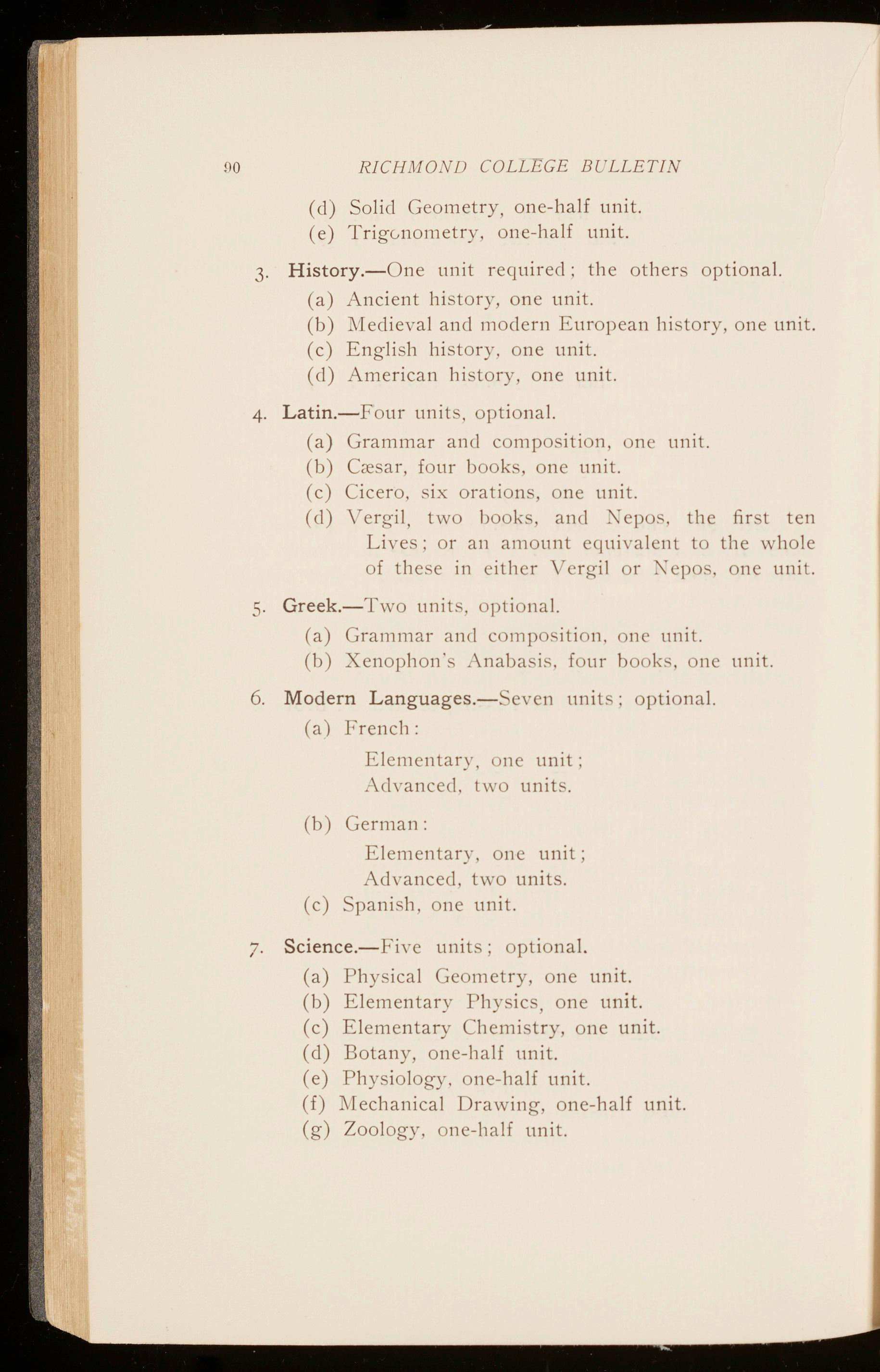
RICW10 .VD COLLf,,GE BCLLETIN
(cl) Solid Geometry, o n e-ha lf unit. (e) Trigc.,nometry, one-half unit.
3. History.- One unit required; the others opt iona l.
(a) Ancient history, one unit.
(b) l\IeclieYal and modern European history, o n e uni t
(c) English history, one unit.
(cl) American history, one unit.
4. Latin.- Four units. optional.
(a) Grammar and composition, one unit.
(b) Cesar, four books, one unit.
(c) Cicero, six orations, one unit.
( d) \ ' ergil, two books, ancl :(° epos, the fir l ten Li\'es; o r an amount equiYalent to the whole of these in either \'ergil or >-'epos, one unit.
5. Greek.- Two units, optional.
(a) Grammar ancl compositi n. one unit. (b) Xenophon\; . \nabasis. four b o ks, one unit.
6. Modern Languages.- ~ eYen unit. ; opt iona l.
(a) French:
Elementary, one unit; .\(\yancecl. two units.
(b) German:
Elementary, one unit; Ach·ancecl, two unit
(c) panish, one unit.
7. Science.- FiYe units; optional.
(a) Physical Geometry, one unit.
(b) Elementary Physic, one unit.
(c) Elementary hernistry, o n e unit.
(cl) Botany, one-half unit.
(e) Phys iology. one-half unit.
(£) l\ [echanical Drawing, one-half unit.
(g) Zoology, o ne-half unit.
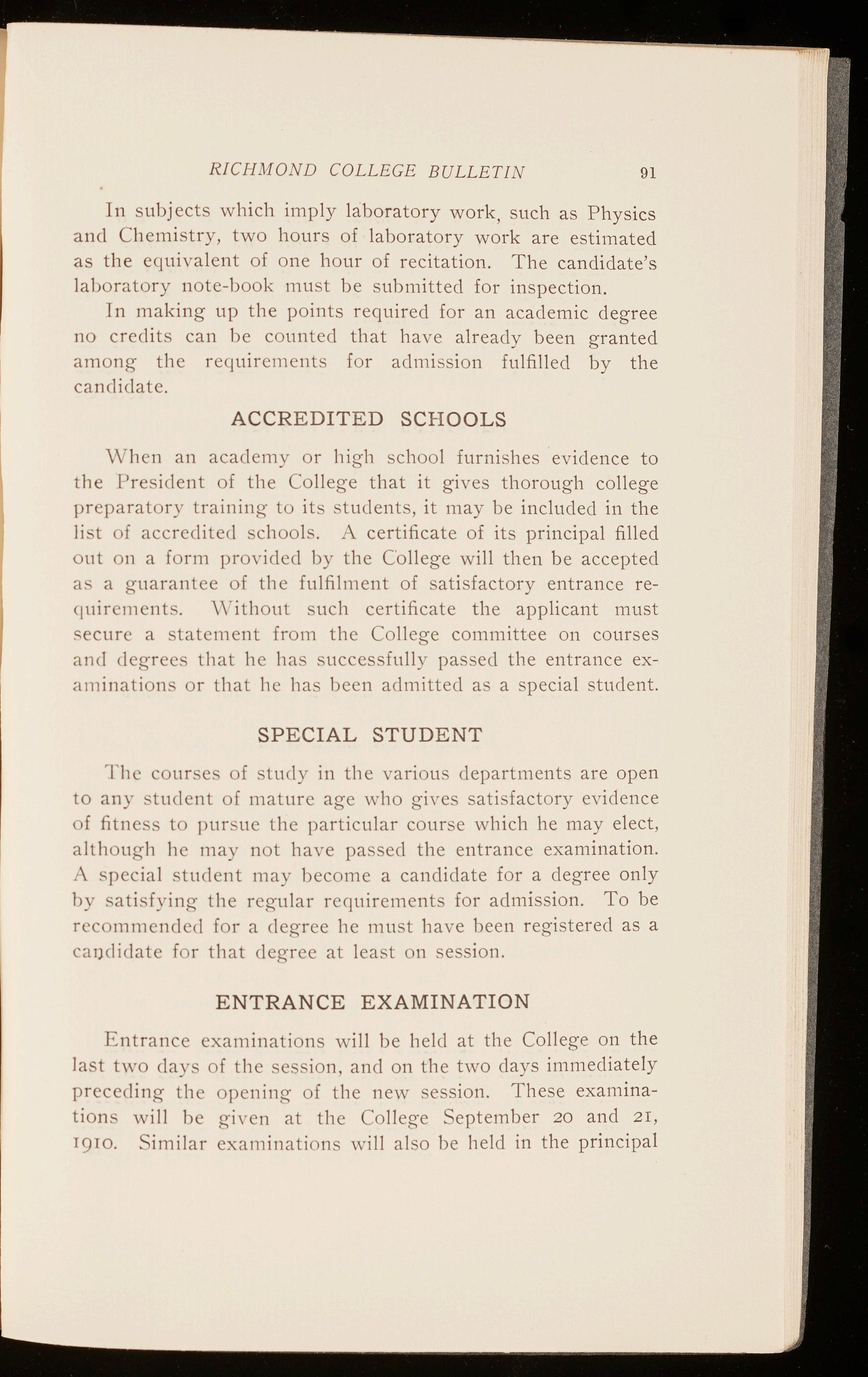
RICHMOND COLLEGE BULLETIN
In subjects which imply laboratory work, such as Physics and Chemistry, two hours of laboratory work are estimated as the equivalent of one hour of recitation. The candidate's laboratory note-book must be submitted for inspection.
In making up the points required for an academic degree no credits can be counted that have already been granted among the requirements for admission fulfilled by the candidate.
ACCREDITED SCHOOLS
When an academy or high school furnishes evidence to the President of the College that it gives thorough college preparatory training to its students, it may be included in the list of accredited schools. A certificate of its principal filled out on a form provided by the College will then be accepted as a guarantee of the fulfilment of satisfactory entrance requirements. \\ ' ithout such certificate the applicant must secure a tatement from the College committee on courses and degrees that he has successfully passed the entrance examinations or that he has been admitted as a special student.
SPECIAL STUDENT
The courses of study in the various departments are open to any student of mature age who gives satisfactory evidence of fitness to pursue the particular course which he may elect, although he may not have passed the entrance examination. A special student may become a candidate for a degree only by satisfying the regular requirements for admission. To be recommenclecl for a degree he must have been registered as a caJJclidate for that degree at least on session.
ENTRANCE EXAMINATION
Entrance examinations will be held at the College on the last two clays of the session, and on the two days immediately preceding the opening of the new session. These examination will be given at the College September 20 and 21, 1910. Similar examinations will also be held in the principal

RICl1.110ND COLLEGE BULLETIN
ci t ies of V irginia, and at other places so fa r as s ui tab le arrangeme n ts can be made. App licat io n fo r t h e h o lding of s u ch an examinat ion shou l d be made to t h e Preside n t of the Co ll ege not l ess than four weeks previous to the time at wh ich the examination is desired .
Advanced Stan d in g at E ntrance - Students w h o, by reason of their work elsewhere, a r e prepared to enter classes hig h er than the lowest, will be adm itted to any advanced class by passing such special examination as may sat isfy the professor in charge. When the work of the advanced class s h all have been comp leted, fu ll credit wi ll be given for the work of the lower class or classes.
La w Stu dents are at present exempt from entrance examinations, if they take only law cla se
The President of the College will promptly furnish any special information that may seem needful concerningentrance.
SE L E CTI ON OF STUDI E S
The system of schools allows the selection by every student of such studies as will be most valuable in qualifying him for his future pursuit; but while allowing such selection, the College holds that the man is more than the occupation, and will always encourage a regular and complete cour:oc. To this end, the right is reser\'ed to prescribe lhc studie of any who may be found unprepared for classes higher than lhe ''A" courses in Latin, English and l\fathernalic , and al o lo limit the number of studies for which any student may matriculate. A committee of the Faculty will assist the Pre idcnl in matriculating students, and will carefully advise every new student as to his course of tudy. Students will nol be matriculated for more than four regular classes without special permission of the Faculty. The term "regular" includes all classes that meet three lime a week, or oftener. Every student is expected lo allcnd at least three schools, and to adhere throughout the session lo the sludie selected on his matriculation. Students who cle. ire to pur. uc special studies in one or more schools should cornmunicate with the President.
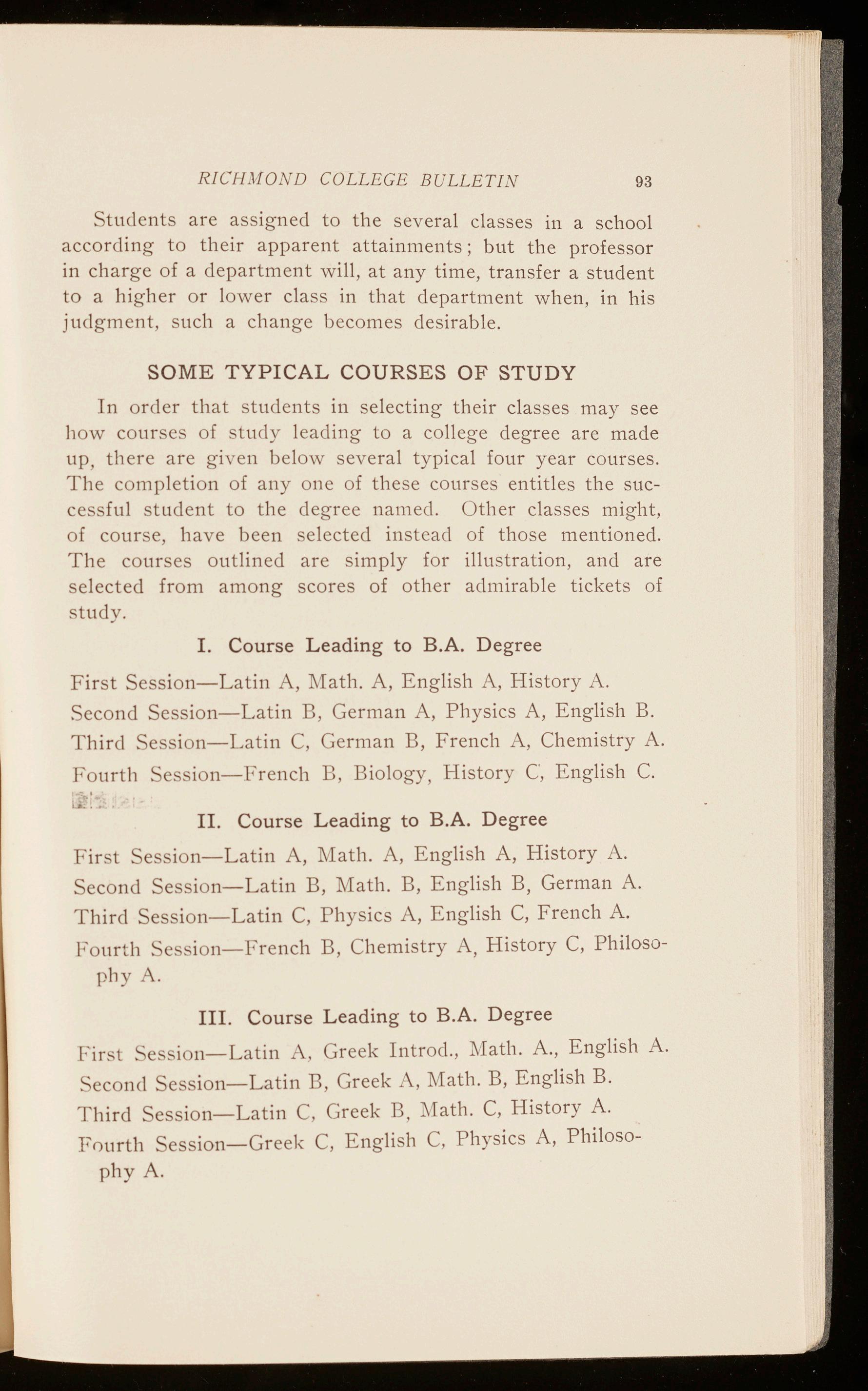
RICHJIOND COLLEGE BULLETIN
Students are assigned to the several classes in a school according to their apparent attainments; but the professor in charge of a department will, at any time, transfer a student to a higher or lower class in that department when, in his judgment, such a change becomes desirable.
SOME TYPICAL COURSES OF STUDY
In order that students in selecting their classes may see how courses of study leading lo a college degree are made up, there are giyen below several typical four year courses. The completion of any one of these courses entitles the succes ful student to the degree named. Other classes might, of course, have been selected instead of those mentioned. The courses outlined are simply for illustration, and are elected from among scores of other admirable tickets of study.
I. Course Leading to B.A. Degree
First Session-Latin A, Math. A, English A, History A.
Second Ses ion-Latin B, German A, Physics A, English B.
Third , ession-Latin C, German B, French A, Chemistry A.
Fourth Se ion-French D, Biology, History C, English C.
IL Course Leading to B.A. Degree
First e sion-Latin A, 1\Iath. A, English A, History A.
Second Se ion-Latin B, Math. B, English B, German A.
Third Ses ion-Latin C, Physics A, English C, French A.
Fourth 'ession-French B, Chemistry A, History C, Philosophy A.
III. Course Leading to B.A. Degree
First , ession-Latin A, Greek Introcl., lllath. A., English A. econd e ion-Latin B, Greek A, Math. B, English B.
Third es ion-Latin C, Greek B, :\lath. C, History A. F0urth e sion -Gr eek C, English C, Physics A, Philosophy A.
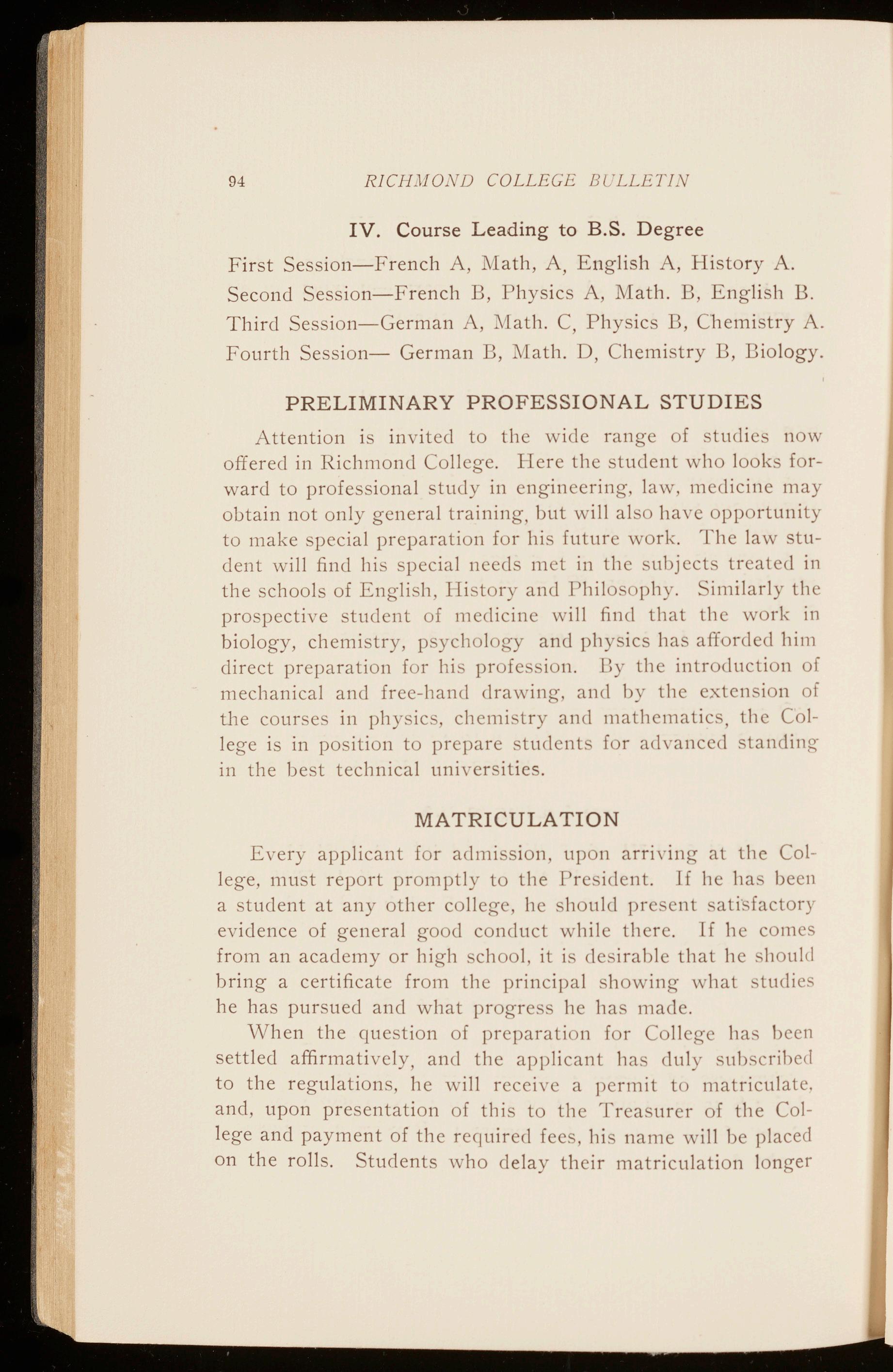
IV. Course Leading to B. S . Degree
F ir st Sess ion - F r en c h A, Ma th , A, E n g li s h A, H isto r y A. Second Session - F r ench B, Phy ics A, Math. B, E n g li sh B. Thi r d Session - German A, :.\lath. C, P h ysic 13, Chemi try A. Fourth Session - Ge r man B, l\Iat h. D, C h em istry B, Bio logy.
PRELIMINARY PROFESSIONAL STUDIES
Attention is invited to the wide range of studies now offered in Richmond College. Here the student who look· forwa r d to profe siona l tudy in eng in e ri ng, law, medic ine may obtain not only general training, but wil l a l ·o have oppo r tunity to make special preparation for hi . future work. The law student will find his special needs met in the subjects treated in the schools of English, History and Philosophy. Similarly the prospective student of medicine wi ll find that t h e work in biology, chemistry, psychology and physics ha afforded him direct preparation for his profession. By the introduction of mechanical and free-hand drawing, and by the extension oi the courses in physics, chemistry and mathematic, the College is in position to prepare stud nts for ach·anced standing in the best technical uniyersit i es.
MATRICULATION
E,·ery applicant for adm iss ion, upon arri, ·ing at the College, must report promptly to the President. Jf he has been a student at any other college, he should pre. ent satisfactor) evidence of general good conduct while there. lf he comes from an academy or high school, it is desirable that h e should br i ng a certificate from the pr incipal showing \\'hat studies he has pursued and what progress he has made.
\ Vhen the question of preparation for ollcge has been settled affirmatively, and the applicant has duly subscribed to the regu lations, he will receive a permit to matriculate. and, upon presentation of this to the T r easurer of the College and payment of the requ ired fees, h is name wi ll be placed on the rolls. Students who delay their matriculation longer
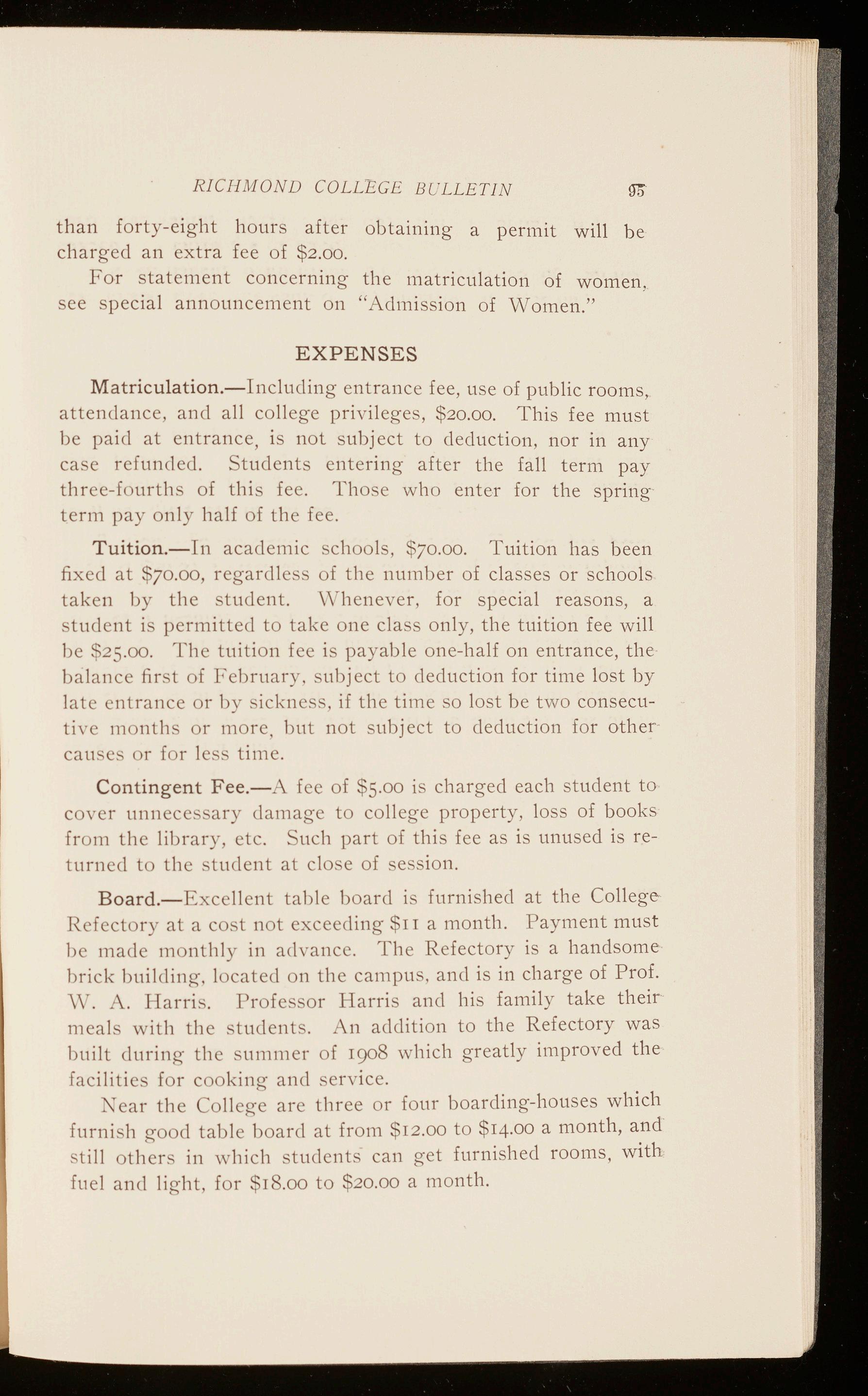
than forty-e ight ho u rs after obta ining a p erm it w ill be cha r ged an extra fee of $2.00.
For statement concerning the matricu lat ion of women, ee specia l announcement on "Admission of Women."
EXPENS E S
M at r ic ula t ion.- Including entrance fee, use of public rooms, attendance, and all college privileges, $20.00. This fee must be paid at entrance, is not subject to deduction, nor in any case refunded. Students entering after the fall term pay th rce-fourths of this fee. Those who enter for the spring term pay only half of the fee.
T ui tio n.- In academic school , $70.00. Tuition has been fixed at 70.00, regardless of the number of classes or schools taken by the student. \Yhcnever, for special reasons, a tuclent is permitted to take one class only, the tuition fee will be $25.00. The tuition fee is payable one-half on entrance, the balance first of February. ubject to deduction for time lost by late entrance or by sickness, if the time so lost be two conseCLtti\'e months or more, but not sul ject to deduction for other cau cs or for less time.
Cont in gent Fee .- A fee of $5.00 is charged each student to co\'er unneces ary damage to college property, loss of books from the library, etc. Such part of this fee as is unused is returned to the student at close of session.
B oa rd .- Exccllent table hoard is furnished at the College Refectory at a cost not exceeding $rr a month. Payment must he made monthly in ad\'ancc. The Refectory is a handsome brick building, located on the campus, and is in charge of Prof. \\ r A. Harris. Professor Harris and his family take their meals with the students. An addition to the Refectory was built during the summer of r908 which greatly improved the facilitie - for cooking and ser\'ice.
Kear the College are three or four boarding-houses which furni . h good table board at from $r2.oo to $14 00 a month, and still oth,ers in which students can get furnished rooms, with fuel and light, for r8.oo to $20.00 a month.
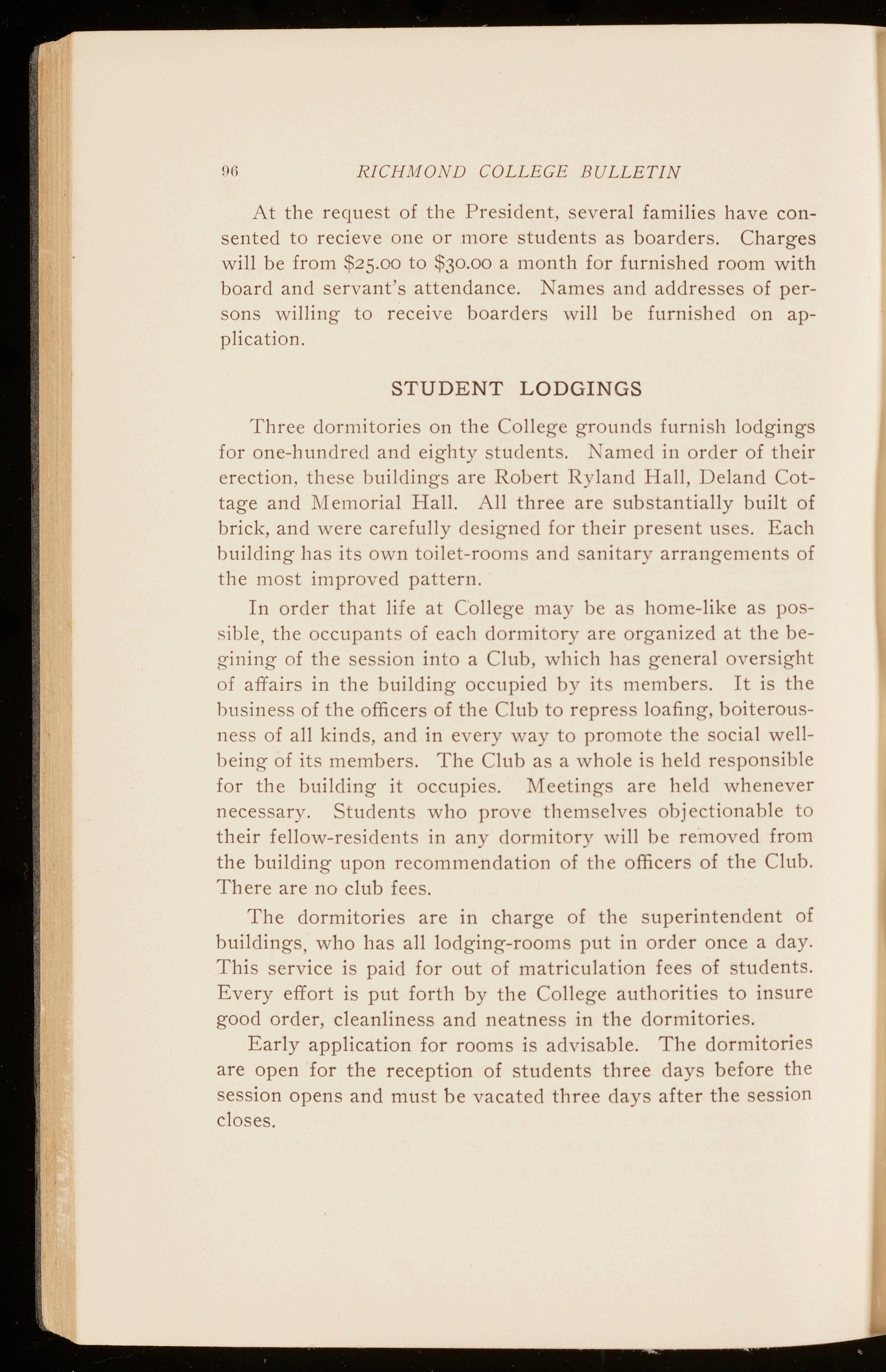
!J6 RICHMOND COLLEGE BULLET IN
At the request of the President, several families have consented to recieve one or more students as boarders. Charges will be from $25.00 to $30.00 a month for furnished room with board and servant's attendance. Names and addresses of persons willing to receive boarders will be furnished on application.
STUDENT LODGINGS
Three dormitories on the College grounds furnish lodgings for one-hundred and eighty student . Named in order of their erection, these buildings are Robert Ryland Hall, Deland Cottage and l\lemorial Hall. All three are substantially built of brick, and were carefully designed for their present uses. Each building has its own toilet-rooms and sanitary arrangements of the most improved pattern.
In order that life at College may be as home-like as possible, the occupants of each dormitory are organized at the begining of the session into a Club, which has general oversight of affairs in the building occupied by its members. It is the business of the officers of the Club to repre loafing, boiterousness of all kinds, and in every way to promote the social wellbeing of its members. The Club as a whole is held responsible for the building it occupies. Meetings are held whenever necessary. Students who prove themselve objectionable to their fellow-residents in any dormitory will be removed from the building upon recommendation of the officers of the Club. There are no club fees.
The dormitories are in charge of the superintendent of buildings, who has all lodging-rooms put in order once a day. This service is paid for out of matriculation fees of students. Every effort is put forth by the College authorities to insure good order, cleanliness and neatness in the dormitories.
Early application for rooms is advisable. The dormitories are open for the reception of students three days before the session opens and must be vacated three days after the session closes.
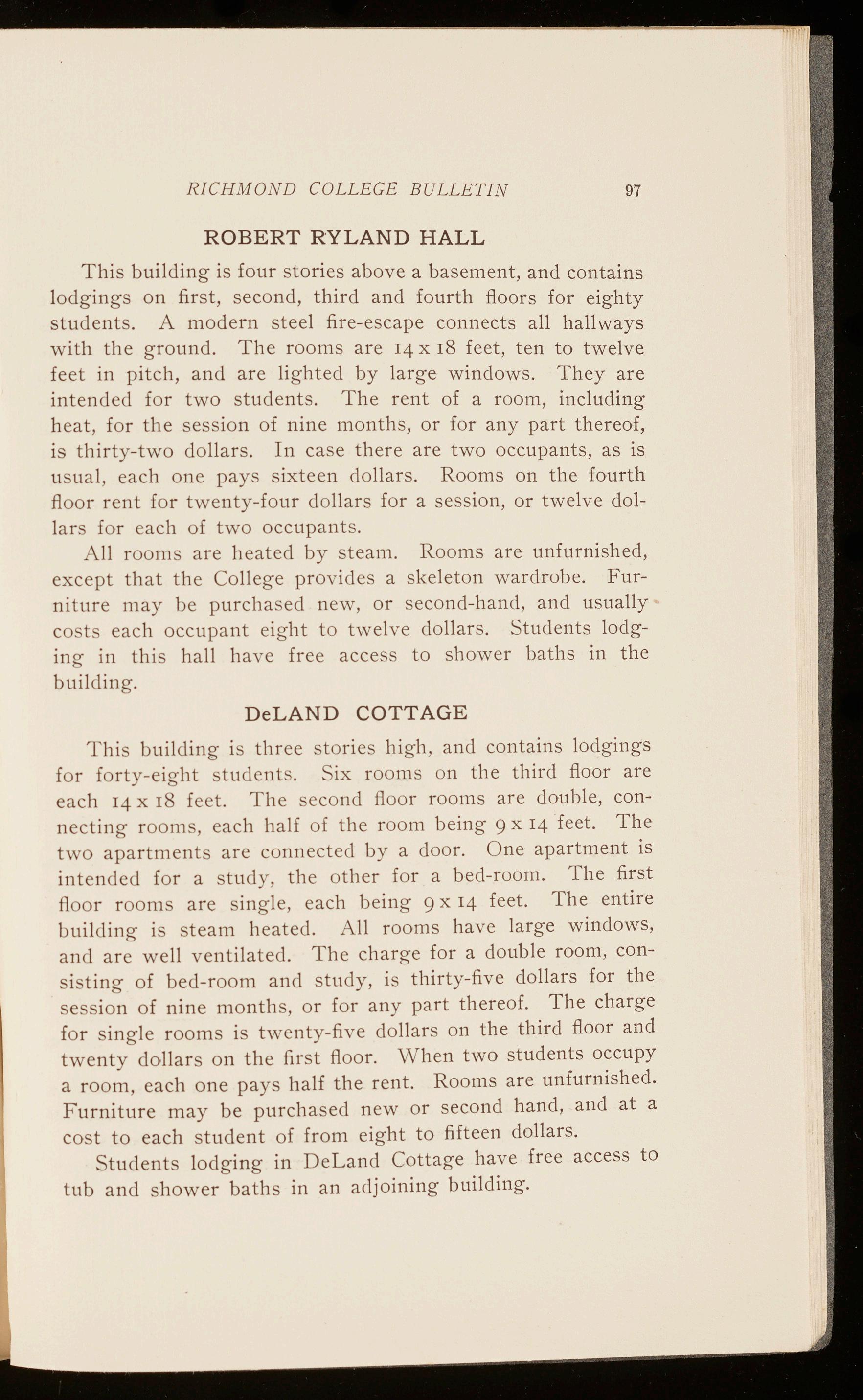
RICHMOND COLLEGE BULLETIN
ROBERT RYLAND HALL
This building is four stories above a basement, and contains lodgings on first, second, third and fourth floors for eighty students. A modern steel fire-escape connects all hallways with the ground. The rooms are 14 x 18 feet, ten to twelve feet in pitch, and are lighted by large windows . They are intended for two students. The rent of a room, including heat, for the session of nine months, or for any part thereof, is thirty-two dollars. In case there are two occupants, as is u ual, each one pays sixteen dollars Rooms on the fourth floor rent for twenty-four dollars for a session, or twelve dollar for each of two occupants.
All rooms are heated by steam. Rooms are unfurnished, except that the College provides a skeleton wardrobe. Furniture may be purchased new, or second-hand, and usually costs each occupant eight to twelve dollars. Students lodging in this hall have free access to shower baths in the building .
DeLAND COTT AGE
This building is three stories high, and contains lodgings for forty-eight students. Six rooms on the third floor are each 14 x 18 feet. The second floor rooms are double, connecting rooms, each half of the room being 9 x 14 feet. The two apartments are connected by a door. One apartment is intended for a study, the other for a bed-room. The first floor rooms are single, each being 9 x 14 feet. The entire building is steam heated. All rooms have large windows, and are well ventilated. The charge for a double room, consisting of bed-room and study, is thirty-five dollars for the session of nine months, or for any part thereof. The charge for single rooms is twenty-five dollars on the third floor and twenty dollars on the first floor. vVhen two students occupy a room, each one pays half the rent. Rooms are unfurnished. Furniture may be purchased new or second hand, and at a cost to each student of from eight to fifteen dollars. Students lodging in DeLand Cottage have free access to tub and shower baths in an adjoining building.
MEMORIAL HALL
This building is three stories above a basement, and contains lodgings for seventy students. T h ere are twelve double, connecting rooms, in which each apartment measures sixteen and one-half by nine and one-half feet; nine s ingle rooms, sixteen and one-half by thirteen feet, intended for two students; and twenty-eight single rooms, sixteen and onehalf by nine and one-half feet, intended for one student. All rooms and hallways are heated by steam. The charge for rooms includes all expense for heating . The rent of a double room for session of nine months, or for any part thereof, is forty dollars; for single room for two students, thirty-two dollars; for single room for one student, twenty-fi ve d o llars. When two students occupy a room, each pays half the rent. This building is provided with ample fire escapes of the most approved construction.
Students lodging in Memorial Hall have free acce ss to tub and shower baths in the building. Students who take rooms in a dormitory must pay full amount of rent in advance.
S u mmary o f Ne c es s ar y E xp ens e s for an A ca demic Student
Economical Estimate.
Matriculation Fee, ... $ 20 oo Tuition , Contingent Fee, Room, furniture , fuel, li ghts, laundry and in c identals, ........... Table Board, ............ Books,

It will be noticed that the first three items are invari able. These items are the same for all students. Other expenses vary according to taste and financial ability of students. These estimates include every necessary expenditure ex-
c ept clothing and traveling expenses, a n d labo r at ory fee s for su c h students as take labo r ato r y classes .
Scho larsh ip students, or ca n didates for the m in ist r y, s ince t hey pay n o tu ition, should deduct seve n ty do llars from th e t ota ls given above.
Summary of E x penses for a Law Student
Economica l Estimate.
Matricu lation Fee, ........ . ......... $ 20 oo Contingent Fee, . . .
. . . ... . S oo Tuition in Junior Law, .
. 50 oo Room, furniture, lights, laundry and incidentals,. . 40 oo Table Board, . .
. 95 oo Books, 30 00
Totals,

Estimate.
Students in enior Law should add twenty-five dollar s to totals in foregoing table in order to obtain estimate of their expen es.
Summary of Expenses for an Academic Stu d en t Who Resides in Richmond
?-Iatriculation Fee, ............................... $ 20 oo Contingent Fee, .
Tuition for entire se sion,
Day-room Fee
Total, ................................ $ 97
The Matriculation Fee, Room Rent and one-half of Tu ition are payable at elate of entrance. The second half of tuitio n is payable February 1st .
Diploma Fee.- For every Certificate of Proficiency or chool Diploma awarclecl, the charge is $1. For a Degree Dip loma, $5 .
tuclent who desire to have made out for them such Proficiencies and School Diplomas as they may win, must de-

100 R I CHMOND COLLEGE BULLETIN
posit the necessary fees wit h t h e Treasure r one week before Commencement . Stude n ts w h o take degrees are required to pay for their Degree Diplomas . No honors are announced at Commencement u nless a ll fees have been satisfactori ly settled.
Laboratory Fees.- Students who take Chemistry, Bio logy or Phys ics, are requ i red to pay a fee of $5 for laboratory expenses in each class.
Students need not keep money about t h eir persons or in their rooms, but may, witho u t expense, deposit it for safekeeping with an officer of the Co ll ege. Some students open an account with one of the city banks, and this plan is strongly commended by the Co ll ege authoriti es.
CANDIDATES FOR THE MINISTRY
Ministers of the Gospel of all d enominations, and young men duly approved by their ch u rches as candidates for th e mini s try, are admitted free of charge for tuiti o n. They pay matriculation fee, and for fuel, light s , board, etc., the same with other students .
The Education Board of the Virginia Bapti s t General Association will render further a ss istance to worthy young men recommended by churche s which contribute to the Board , and accepted after examination. For further information on this matter, address Hon. J. T . E llyson, Correspondin g Secretary, R ichmond, V i rginia.
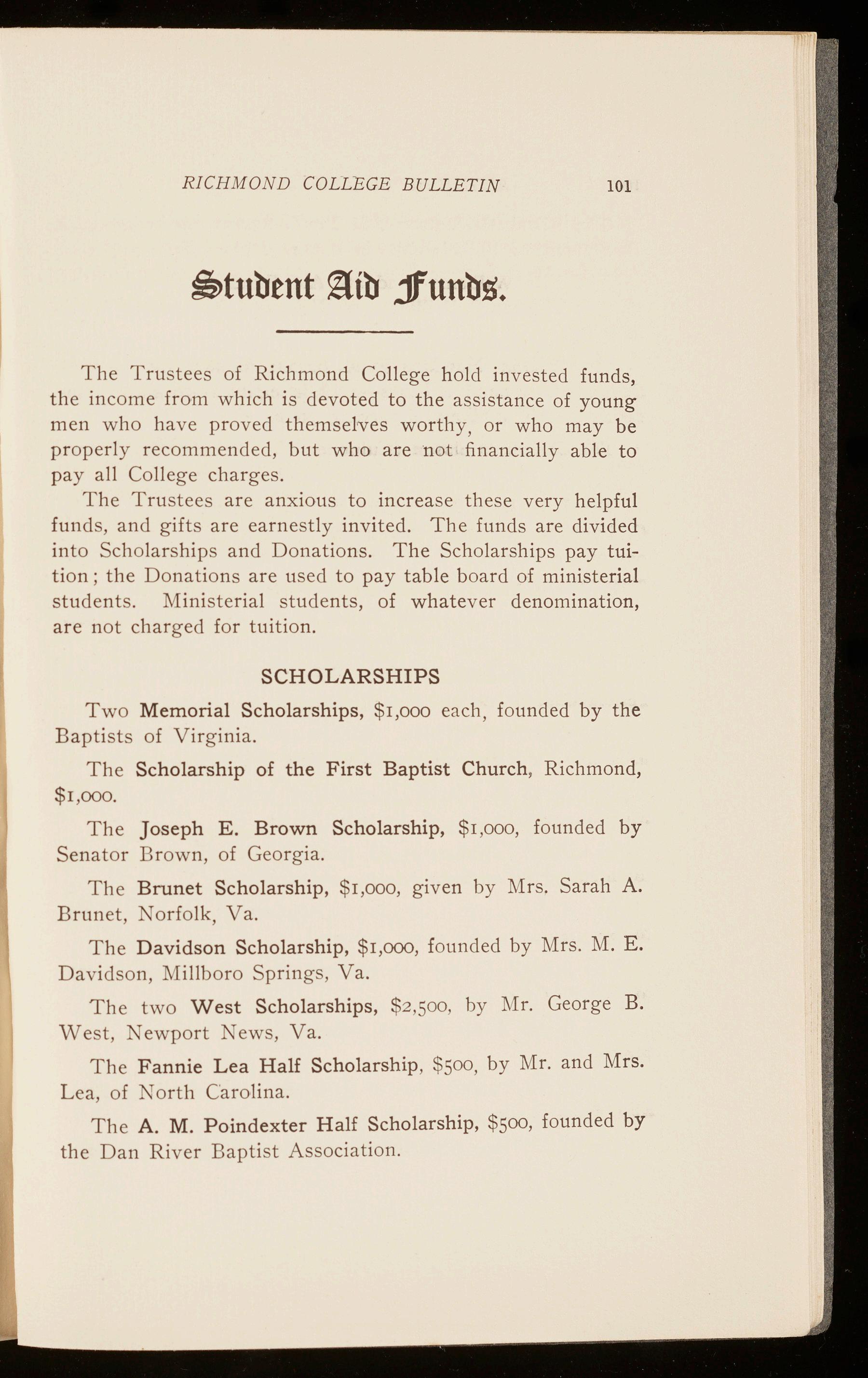
~tubent ~ib jf unb~.
The Trustees of Richmond College hold invested funds , the income from which i s devoted to the assistance of young men who have proved themse lves worthy, or who may be properly recommended, but who are not fina n cia lly ab le to pay a ll Co ll ege ch a r ges .
T h e Trustees a r e anx ious to inc r ease th ese ve r y h elp ful fu nds, and gifts are ea rn est ly inv ited . T h e fu n ds a r e divi ded into Sch o larships and Donatio n s. The Scho la r ships pay tuit ion; the Donations are used to pay table boa r d of ministe ri al student . Ministerial students, of whatever denominatio n , a r e not charged fo r tuition.
SCHOLARSHIPS
Two Memorial Scholarships , $1,000 eac h , founded by th e Bapti is of V ir g in ia .
The Scholarship of the First Baptist Church , Richmo n d, $1 ,000.
The Joseph E. Brown Scholarship , $1,000, founded by Senator Brown, of Georgia.
The Brunet Scholarship , $1,000, given by Mrs. Sarah A . Brunet, Norfolk, Va.
The Davidson Scholarship , $1,000, founded by Mrs. M. E. Davidson, M illboro Springs, Va.
The two West Scholarships , $2,5 00 , by Mr George B West , ewport News, Va.
The Fannie Lea Half Scholar ship, $500, by Mr and M r s Lea , of North Carolina
The A. M. Poinde xter Ha lf Scholar sh ip, $500, founded by the Dan River Baptist Association.

RICHMOND COLLEGE BULLETIN
The Elizabeth Stetson Aid Fund, $5,000, give n by J o hn B. Stetson, of Philadelphia, in hon o r of his wife.
The Ella Williams Students Aid Fund, $5,000 given by the late Thomas C. Williams, of Richmond, in memory of his daughter.
The William Hawkins Fund, $2,000, founded by th e gentleman whose name it bears -a Philadelphian-to aid in educating godly, studious, deserving young men.
The Chambers Sisson (Culpeper, Va.) Scholarship, $1,000, founded by the gentlemen whose name it bears.
The J. B. Jeter Scholarship , $1,200, bequest of l\lrs. Mary C. Jet e r, in memory of her husband , Rev. J. B. Jeter, D.D., one of the founders of the College, and long President of the corp oration.
The Elizabeth R. West Fund, $2,000, established by :-fr. George B. \i\Test, of Kewport Kew, Va.
The H. Evelina Walker (King and Queen County) Scholarship, $r ,200.
The Gustavus Milhiser (R ichmond) Scholarship, $r.ooo, used for the benefit of the Richmond IIigh School.
The Sarah B. Watson Scholarship , of $r ,ooo, founclecl by Mr. George B. \Vest, of Kewport Kews, Va.
The A. E. Dickinson (Richmond) Scholarship, $r.ooo, founded by the minister whose name it bear..
The N. W. Bowe (Richmond) Scholarship, established by the gentlemen whose name it bears.
The John T. Griffin (Churchland, Va.) Scholarship, $1,500 in hon o r of his wife.
The Court Street Church Scholarship, Portsmouth, Va .. $1,0 00.
The C. C. Broaddus (Bowling Green, Va.), Half Scholarship , $500, in memory of his w if e and daughter.
The J. C. Hiden Half Scholarshi p, by the l\Ionroe Baptist Church.
RICHMO ND COLLEGE BULLETIN
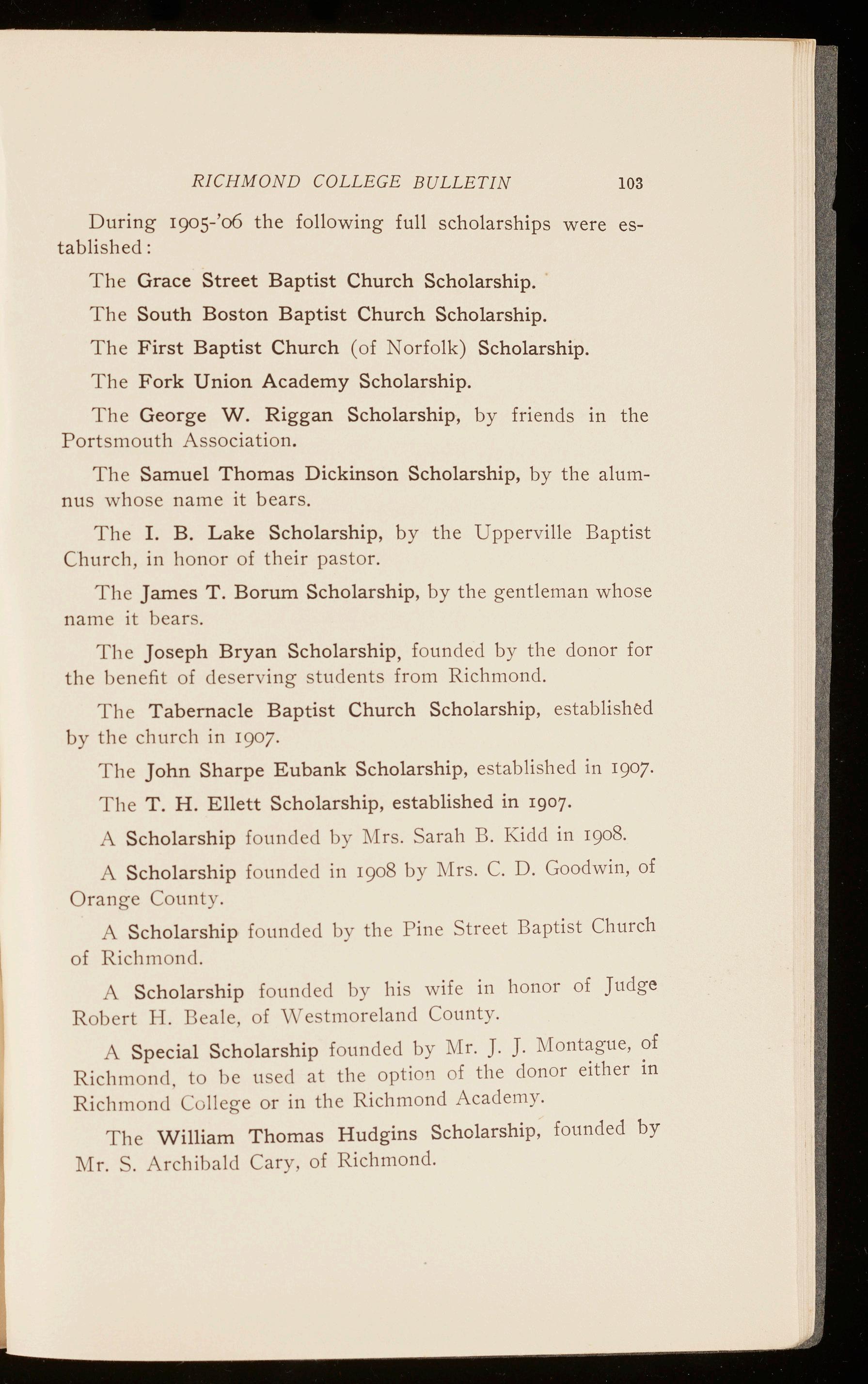
103
During 1905-'o6 the following full scholarships were established:
Th e Grace Street Baptist Church Scholarship.
The South Boston Baptist Church Scholarship.
The First Baptist Church ( of Norfol k) Scholarship.
The Fork Union Academy Scholarship.
The George W. Riggan Scholarship, by friends in the Portsmouth Assoc ia ti on .
The Samuel Thomas Dickinson Scholarship, by the alumnu s whose name it bears.
The I. B. Lake Scholarship , by the Upperv ille Baptist Church, in honor of their pastor.
The James T. Borum Scholarship, by the gent leman whose name it bears.
The Joseph Bryan Scholarship, founded by the donor for the benefit of deserv in g students from Richmond.
The Tabernacle Baptist Church Scholarship , established by the church in 1907.
The John Sharpe Eubank Scholarship, established in 1907.
The T. H. Ellett Scholarship, established in 1907.
A Scholarship founded by Mrs Sarah B. Kidd in 1908.
A Scholarship founded in 1908 by Mrs. C. D. Goodwin, of Orange County.
A Scholarship founded by the Pine Street Baptist Church of Richmond .
A Scholarship founded by his wife in honor of Judge Robert H. Beale, of \Vestmoreland County.
A Special Scholarship founded by Mr. J. J. Montague, of Richmond, to be used at the option of the donor either in Richmond C o llege or in the Richmond Academy.
The William Thomas Hudgins Scholarship, founded by Mr. S. Archibald Cary, of Richmond.

RICHJIO.VD COLLEGE BULLETIN
The Susan E. Starke Scholarship, founded by Ir. E. D. Starke, of Richmond, in honor of his deceased wife.
A Scholarship of $1,000, founded by a lady who prefers to be known simply as "A Friend of Christ ian Education ."
During the past year the scholarships named below have been completed and are now available for use. In most cases the nomination to the benefits i s in the hands of the donor during his lif et im e:
The Frances Ann Leiper Crouch Scholarship, founded by Dr. R. G. Crouc h in honor of his wife.
The Luther Wright George Scholarship, founded by Mr. H. H. George, Jr., in memory of his son, who, at the time of his lamented death by accident, was a tudent in Richmond Co ll ege .
The Eva Baker Gwathmey Scholarship, founded by 1Ir. Basi l M. Gwathmey, of Richmond.
The Robert Eugene Locket Scholarship, founded by his parents, Capt. E. F. and l\1rs . Lucy Lockett, of Crewe, Va., to honor the memory of their son, a fo rm er student of Richmoncl College.
A Scholarship e tablished by l\Irs. l\Iary E. \Vinch and Mrs . Kate R. \Vinch, of Richmond.
A Scholarship estab li shed by l\Ir. \ V. E Harris, of Richmond.
A Scholarship established by Mr. P. A. Fore, of Richmond.
A Scholarship established by 1Ir . and l\Ir E. T. Ivey, of ewport News, Va.
A Special Scholarship, founded by l\Ir. R. L. Barnes, of Richmond.
A Scholarship, founded by l\Ir. J. H. Brinson, of Hampton, Va .
A Scholarship, founded by Mrs. l\Iartha P. Taylor, of Newport News, Va .
RICHMOND COLLEGE BULLETIN

105
A Scholarship, founded by Mr. Skye V. Straley, of Princeton, W. Va.
A Scholarship, founded by Mr. John P. Branch, of Richmond, for the benefit of a student to be appointed by the stewards of Centenary Methodist-Episcopal Church, Richmond, Va.
The John P. Branch Scholarship, founded by Mr. M. C. Branch, of Richmond.
The E. Carrington Cabell Scholarship, founded by Mr. H. L. Cabell, of Richmond, in honor of his brother, a distinguished alumnus of Richmond College.
The William F. Harwood Scholarship, founded by Col. John S. Harwood and Mr. R. H. Harwood in honor of their mother.
The Alonza L. Phillips Scholarship, $1,000, founded by the gentleman whose name it bears.
Hon. J. L. M. Curry transferred to the College his copyright interest in two books, "William Ewart Gladstone" and "Southern States of American Union," the same to be held and the income used for scholarship purposes.
DONATIONS
The donations are used to pay the board of young men studying for the gospel ministry of the Baptist denomination. Their application is not confined to young men from Virginia.
The Woolverton Donation, $1,000, founded by George A. Woolverton, of Albany, N. Y.
The John Tabb Donation, $1,200, founded by Thomas Tabb, Hampton, Va., in memory of his father.
The Mathew T. Yates Donation, $1,300, given by the Rev. Dr. M. T. Yates, Missionary, Shanghai, China, "to help educate young men who shall continue to preach after my voice is hushed."
The Joseph B. Hoyt Fund, $5,000, given by the deceased friend whose name it bears, of Stamford, Conn.
106
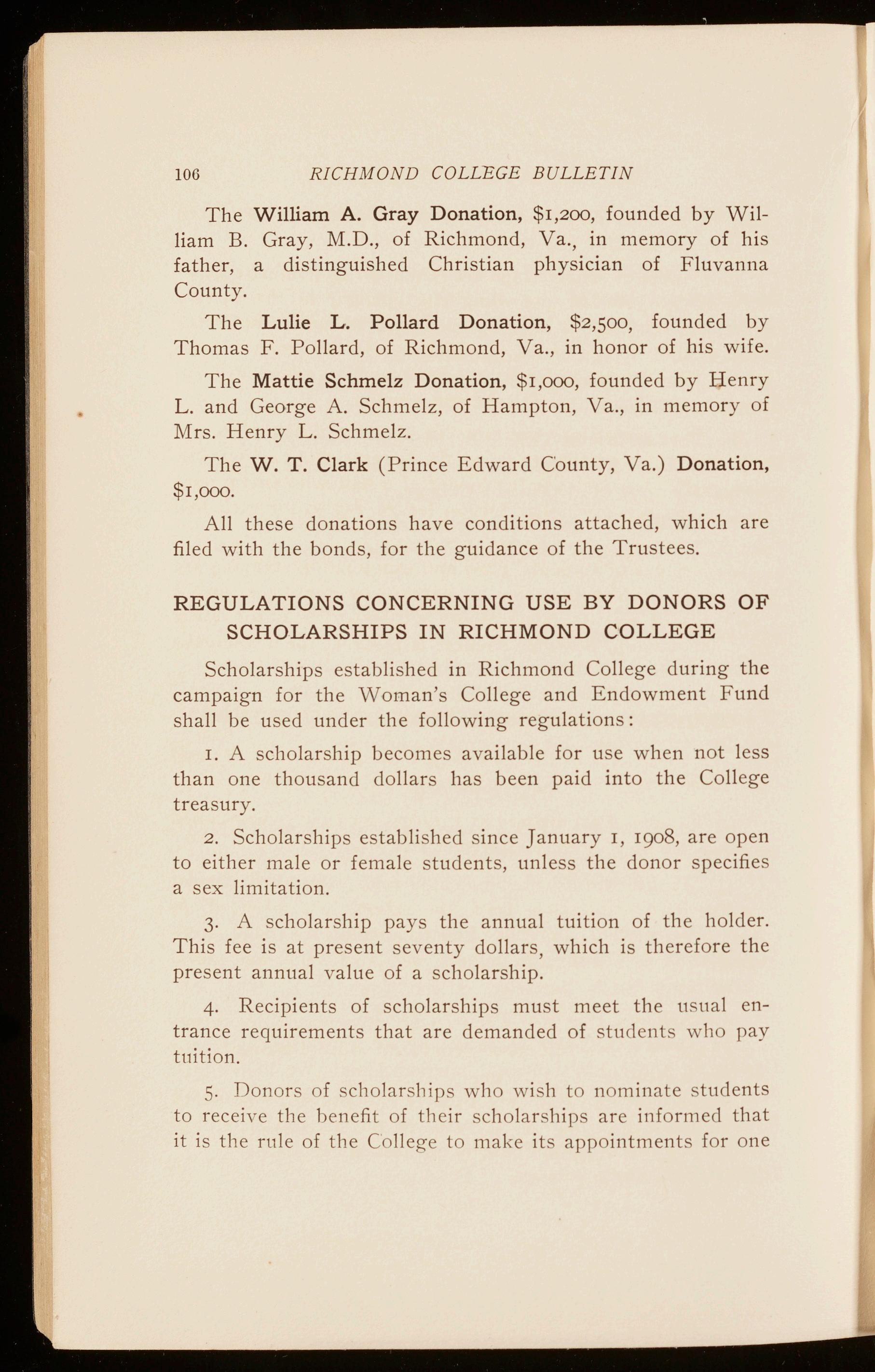
RICHMOND COLLEGE BULLETIN
The William A . Gray Donation , $1,200, founded by Wi lliam B . Gray, M .D ., of Richmond, Va., in memory of h is father, a distinguished Ch r istian physic ian of Fluvanna County.
The Lu li e L . Pollard Donation , $2,500, founded by Thomas F. Pollard, of Richmond, Va., in honor of his wife .
The Mattie Schmelz Donat ion , $1,000, founded by Henry L. and George A. Schmelz, of Hampton, Va., in memory of Mrs. Henry L. Schmelz.
The W . T . Clark (Prince Edward County, Va.) Donation , $1,000
All these donations have conditions attached, which are filed with the bonds, for the guidance of the Trustees .
R E GULATIONS CONC E RNING USE BY DONORS OF SCHO L AR SH I P S I N RICHMOND COLL E GE
Scholarships established in Richmond College during the campaign for the Woman's College and Endowment Fund shall be used under the following regulations:
I. A scholarship becomes available for use when not less than one thousand dollars has been paid into the College treasury.
2. Scholarships established since January I, 1908, are open to either male or female students, unless the donor specifies a sex limitation.
3. A scholarship pays the annual tuition of the holder. This fee is at present seventy dollars, which is therefore the present annual value of a scholarship.
4. Recipients of scholarships must meet the usual entrance requirements that are demanded of stude nt s who pay tuition.
5. Donors of scholarships who wish to nominate stude nts to receiY e the benefit of their sc hol ars hip s are informed that it is the rule of the Co lleg e to make it s appointments for one

RICHMOND COLLEGE BULLETIN
year at a time, and then repeat the appointment as often as may be needful and desirable.
6. Donors of scholarships are requested to nominate beneficiaries by July 1st preceding the opening of the session when the scholarship is to be used, and to notify the President of the College of the nomination. If the donor has reported no nomination by September 1st, the College will appoint a beneficiary for the current session.
7. It is sometimes desirable to divide a scholarship and to appoint two persons to enjoy the benefits of a half-scholat'ship each. In such case the holder of a half-scholarship pays half of the seventy dollar tuition fee, or $17.50 for each half session.
8. Reports of students' class and examination standing are mailed at regular intervals to parents or guardians, and a transcript of a beneficiary's report will be mailed to the donor of a scholarship, provided request is made at the President's office.
GENERAL
ADMINISTRATION OF AID FUNDS
The committee in charge has general instructions, in making its award of all Aid Funds, to give the preference:
I. To applicants already at College, who have maintained a good standing, both in character and study.
II. To other fully prepared applicants who shall present sati factory testimonials from the school last attended, or from other persons who have had opportunity to judge, certifying to their health, attainments, habits of study and moral character.
III. To those of either class who give reasonable assurance that they will complete a course of study leading to one of the degrees of the College.
The recipients of aid are expected to prove, as studentsi not only above censure in all respects, but actively helpful to the College by example and by earnest work.

108 RICHMOND COLLEGE BULLETIN
The awards will be, at all times, s ubject to revision by the Trustees, who reserve the right to withdraw the privilege at any time on account of neglect of duty, serious misconduct, or failure to maintain an average standing of at least eighty per cent. in these three schools.
These Aid Funds are awarded annually by a committee of the Trustees, which meets the first week in July. Applications for aid shou ld be made to the President of the College, who will send blank forms to be filled up and returned.
VI. C l asses in Dr a wing m ee t Tu e sdays a nd Thursd ay s 3 to 5 P. M. VIL Bib l e classes will m ee t at hours to be announced.
V. Math e m a tics C and Greek C will eac h m eet on Saturdays · a t a n h o ur to be selected.
IV. Physics A will b e divided into two sec tion s for laboratory w o rk , onc section m ee ting Mondays and W ed n esdays 9 to 10:40 A. M., a nd th e oth e r section 3 to 5 P . M ., on th e sa m e days. L aboratory hours for Physics B will be assigned afte r th e opening of the s es sion. Stud e nts m ay work in th e l abo r a tor y Saturday a ft ernoons.
III. In Chemistry A l a b o r a tor y h o ur s a r e 9:50 to 11: 30, Tu es d ·1ys, a nd T hu r sdays. In C h e mi s try B l abora tory hours are 11:30 to 1:10 , Tu esdays and Thursdays. Stud ents who cannot a rr a ng e their l aboratory work at th ese h o urs a r e p e rmitt ed t o work in th e afternoon b e tw ee n 3 and 5. Laboratory hours in oth e r Chem istry classes will b e assigned a t th e o p e ning of th e session.
II . Four hours a week ad d it ion a l will be assig n ed by the Instructor in Biol"gy for l abo r ato ry work .
I. S o m e of the smaller c l asses may be mov e d to suit special cases.
NOTES .
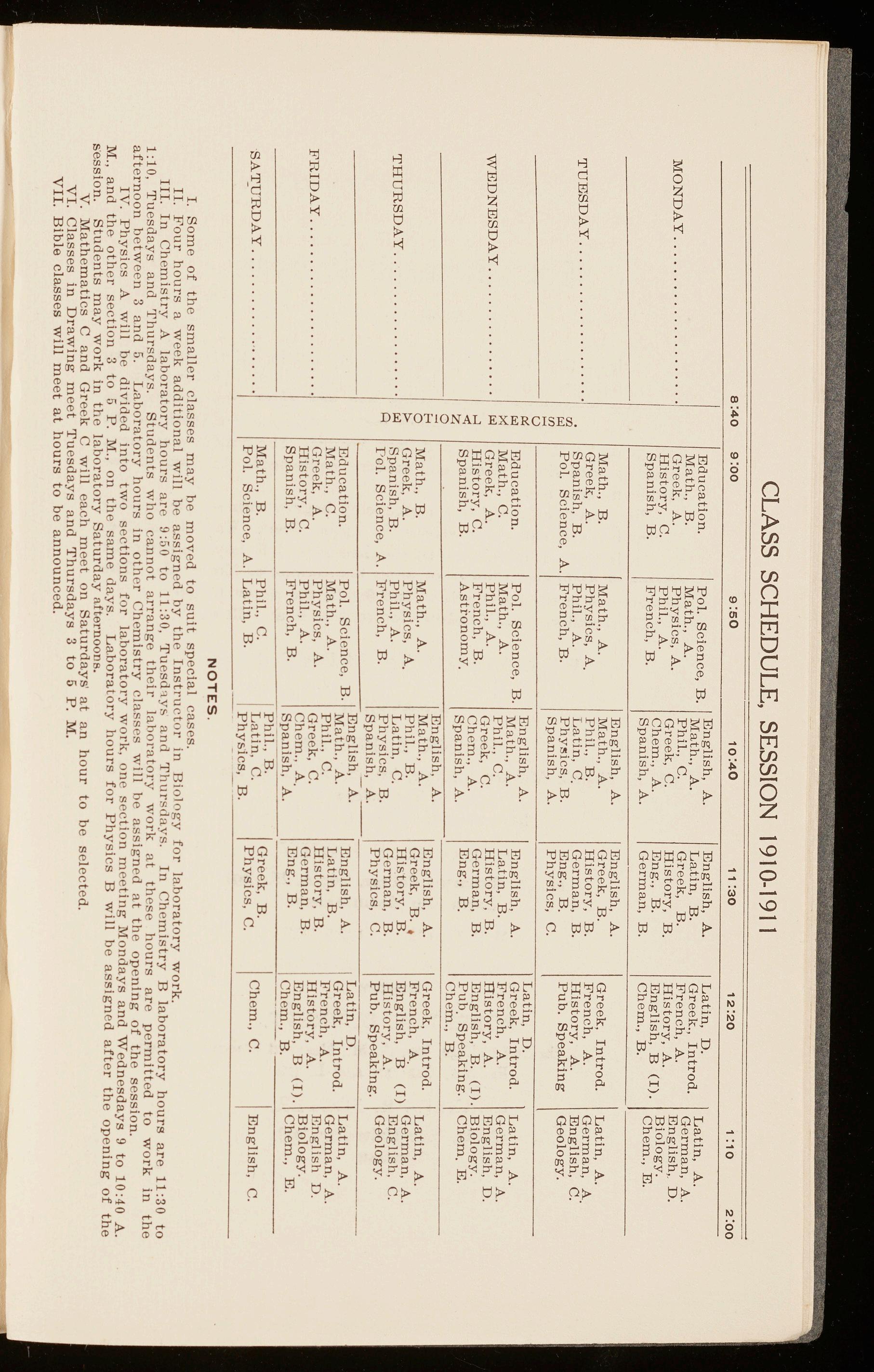
THURSDAY
WEDNESDA
I'ol. S c i e n ce, A. renc , · Spanish', A Physics, C. Pub . Sp ea king.
Spamsh, B . F~h il. , {:· B Phys/cs · B. Germ.an, B. Hi story, A.
Greek, A. Physi cs , A . r:n·~ BC History, B. English, B (I)
Spanish, B. Asti'onomY. Spani~h. A. Eng., B. Pub . Sp ea king. I . Chem., B. Enghsh, A. E 1 · h A G k I d M th B M th A M a th. A. ' ng 1s , . r ee , ntro . a ., • a :• · . ' Gr ee k, B. • Fr enc h, A
Greek, A . Phil., A. Greek C History, B. History, A. History, C. French, B. C h em ' A German, B. English, B. (I).
Math., C. M a th. , A. Phil ·•c . La.tin, B. Fr e nch, A.
Education. P o l. S c i e nc e , B. Math A · English, A. Greek, Introd.
English A Latin , D .
a : 4o
9 :00
Education. Math . , B. Greek, A. History, C. Spanish, B. M a th., B. Greek, A. Spanish, B. Pol. Sci e nc e, g: so Pol. Science, Math., A. Physics, A. Phil., A. Fr e nch, B. Math. , A. Physi cs , A. Phi l. , A. A. I Fr e nch, B.
10 : 40 B I
English, A. · Math., A. Phil., C. Greek, C . Chem., A. Spanish, A. English, A. Math. , A. Phil., B. Latin, C. Phy,iics , B Spanish , A. 1 1 : 30 Englis h , A. Latin, B. Gr ee k, B. History, B. Eng., B. German , B. English, A. Greek, B. History, B. German, B. Eng., B. Physics, C. 12 : 20 L atin, D. Greek , Introd. French, A . History, A. E n glish, B (I). Ch e m., B. Greek, Introd. French, A History, A. Pub. Speaking
1 : 10 Latin, A. German, A. Eng l ish, _ D. B i o lChem.,ogy. E. Latin, A . German, A. English, C. Geo l ogy. Latin, A. G e rm a n, A. English, D. Bio l og y . Chem. E. Latin, A . German, A. English. C . Geology. B English,-A.-E 1 . h A I Latin , D. · Educa tion. Pol. Science, · Math . , A. ng _ is • · Gr ee k, Introd. L a ttn, A. M at h., C. M at h . , A Phil C L at rn , B. French A German, A. GrPek, A. Physics, A. Greek C Hi story, B. History A Jcngli s h D. History, C. Phil., A. Chem.', A. ?erman, B. English: B. (I) . Biology . Sp anish, B. French, B. Spanish, A. Eng., B. . C h e m . , B. Chem., E .
2 : 00 M th B I Pl ·1 C I Phil. -;B I Greek B. I --I . SAT_URDAY ..... . .. .. ....... · j j P a 1 8 . · A L 1 ~: • 13 Latn~, C Ph ys i ~s c C h e m., C. English, C. ______________ ...:_ _ _:__o_ . _c_ ,_ e_ n_ c_e_,_....: · _:__a_ _,rn __ · ___ Physi cs _, B . ______ __' __________· ;__ ______ _
CLASS SCHEDULE, SESSION 1910-1911
RICHMOND COLLEGE BULLETIN

In September, 1902, the Trus ,tees of Richmond College established Ri chmond Academy , a secondary s chool for boys. The two buildings - one containing a large study hall and eight class-rooms, and the other the primary school - are located two squares south of the College on Lombardy Street and Park Avenue. The buildings are new , fitted up with sing l e desks and modern equipment. In 1909-'10 the enrollment was 182.
The course of study in the Academy begins with simple l essons in English and ends with studies in Latin, Greek, English, Mathema1ics, History, Frenc 'h, German and Science that fit boys to enter the classes of Richmond College or other institutions of like grade. The fees are $so in the lower schoo l and $75 in the upper school.
The Faculty of the Academy for 1910-'11 is as follows:
WILLIAM LOFTIN PRINCE, DEAN.
MASTERS
FRANK Z. BROWN,
(B. S. Virginia Military In stit ut e, 'oo; S. B., E. E. Mas sac hu setts Institute of Technology , '03) MATHEMATICS, SCIENCE , DRAWING.
H. BRANTLY HANDY,
(A. B , Richmond College, 'o6; A. M., '09). LATIN AND MATHEMATICS.
WILLIAM L. PRINCE, (A. B ., Richmond College, 'g8). HISTORY.
ROBERT W. DURRETT, (A. M., Richmond College, '99; A. M., Harvard University, '05). FRENCH, GERMAN AND LATIN.
CHARLES R. FOSTER, (A. B , Yale University, '02) ENGLISH.
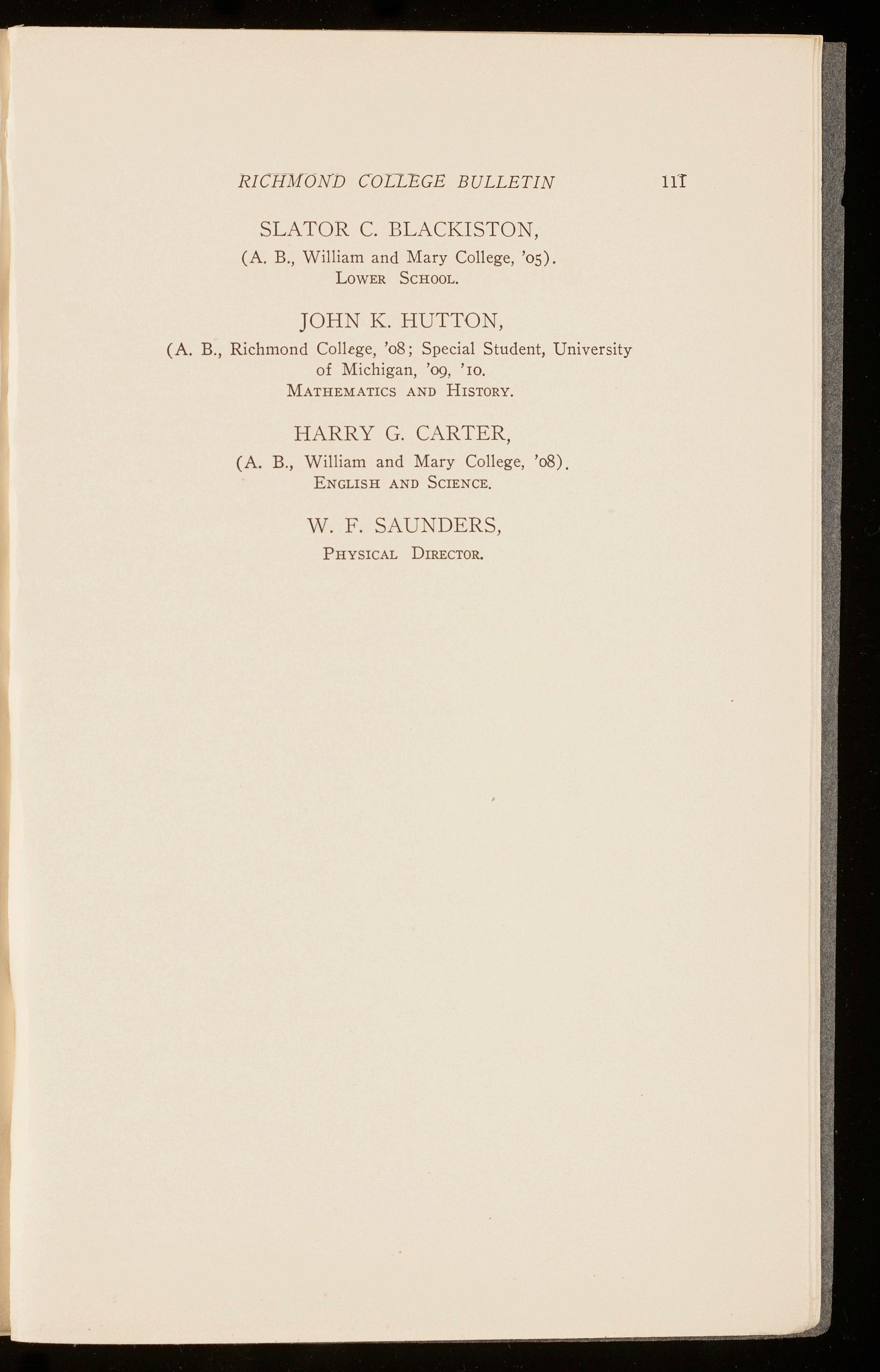
RICHMOND COL2EGE BULLETIN
SLATOR C. BLACKISTOr , (A. B., William and Mary College, '05). L OWER SCHOOL.
J OHN K. HUTTON, (A. B., Richmond College, '08; Special Student, University of Michigan, '09, 'ro. MATHEMATICS AND HISTORY
HARRY G. CARTER, (A . B., William and Mary College, 'o8). ENGLISH AND SCIENCE.
W. F . SAUNDERS, PHYSICAL DIRECTOR.
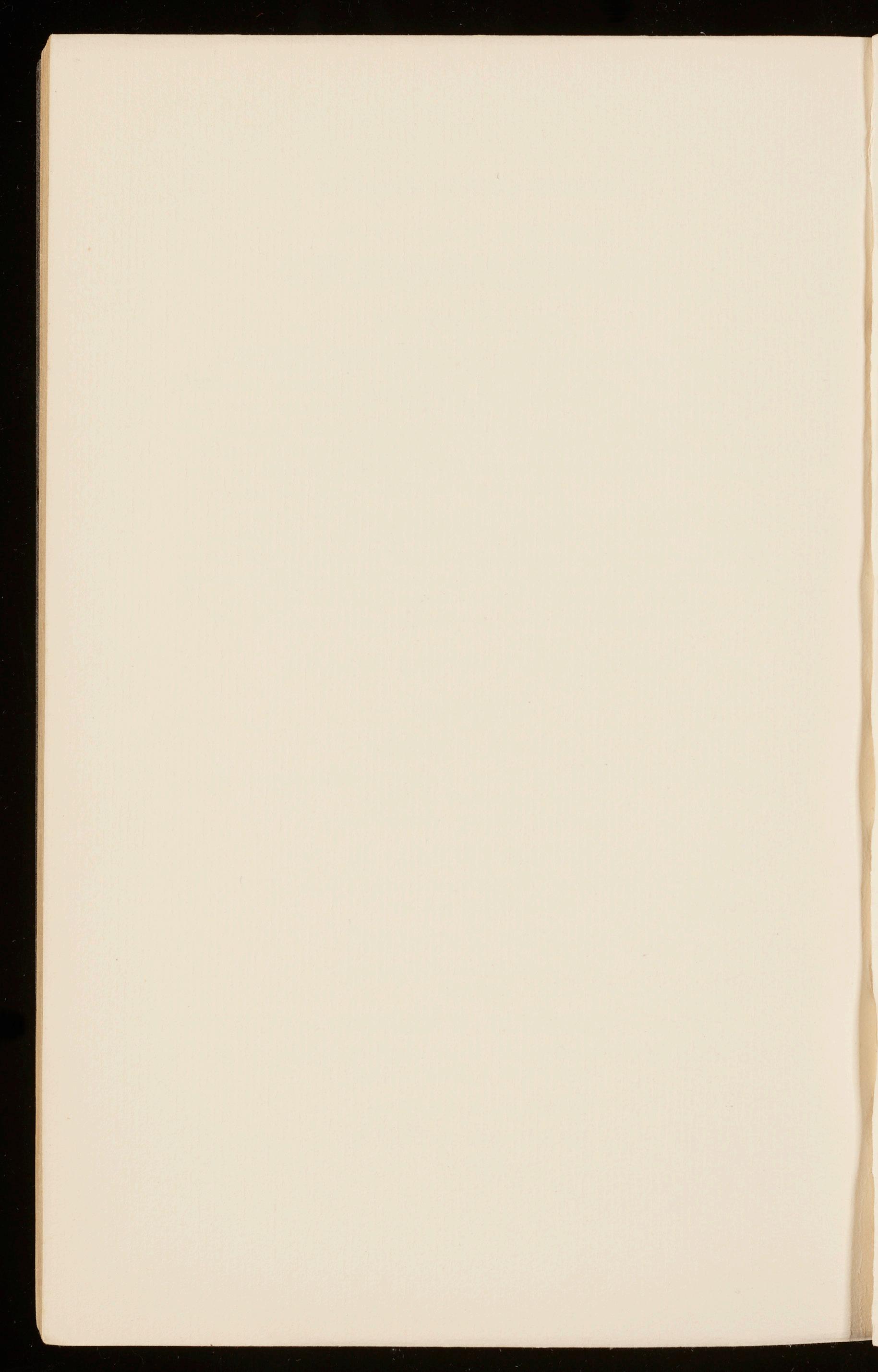
Academy,
Accredited Schools, .

91
Administration of Aid Funds, ................................... 107-108
Admission of Women,
Admi ss ion, Terms of, .
Alumni, Society of,
Beque t, Form of,
Bible Study, School of,
Biology, School of,
Boarding Arrangements,
86-87
56
53-54
96-98 Calendar,
3 Charter,
Chemistry, School of,
Class Schedule, Session of 1910-19u,
Commencement, .
5-6
46-48
ro9
1·-4
Committees, Trustees, ..... ........................... 9
Committees , Special,
Courses of Instruction, ..................
9
31,35
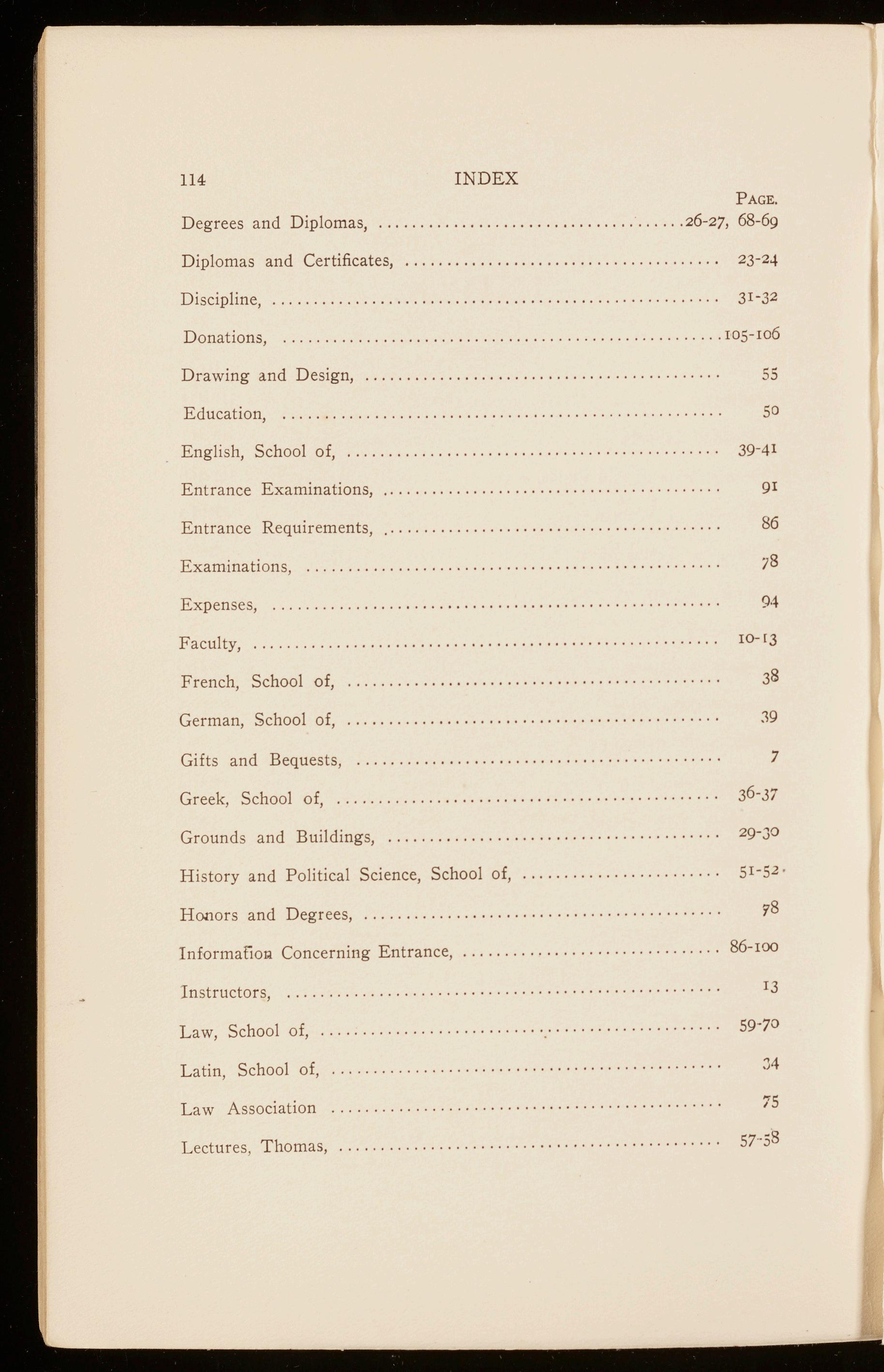
Library, ........................................................
Literary Societies,
Literature,
Location, Lodgings

Preliminary Professional Studies, .........................
Schedule of Recitations,


